Exhibit 99.1
Results for Announcement to the Market
James Hardie Industries N.V.
ARBN 097 829 895
| |
|
|
|
|
|
|
|
|
|
|
|
|
|
|
|
|
| Nine Months Ended 31 December 2006 |
| |
|
31 December |
|
31 December |
|
|
| |
|
2006 |
|
2005 |
|
|
| Key Information |
|
US$M |
|
US$M |
|
Movement |
| |
Net Sales from ordinary activities |
|
|
1,182.0 |
|
|
|
1,098.7 |
|
|
Up |
|
|
8 |
% |
| |
Operating Profit After Tax Attributable to Shareholders |
|
|
47.7 |
|
|
|
144.2 |
|
|
Down |
|
|
67 |
% |
| |
Operating Profit Attributable to Shareholders |
|
|
48.6 |
|
|
|
144.2 |
|
|
Down |
|
|
66 |
% |
| |
Dividend Information
Dividends were paid 8 January 2007 of US5.0 cents per share/CUFS with a record date of 15
December 2006.
Results for the 3rd Quarter, nine months ended 31 December 2006
Contents
1. Media Release
2. Management’s Analysis of Results
3. Consolidated Financial Statements
4. Management Presentation
The information contained in the above documents should be read in conjunction with the James
Hardie 2006 Annual Report. It should also be read in the context of the public announcements made
by James Hardie Industries N.V. in accordance with the continuous disclosure obligations arising
under the Corporations Act 2001 and the ASX Listing Rules since the release of the Annual Report.
The James Hardie 2006 Annual Report and links to the company’s public announcements can be found on
the company website at www.jameshardie.com
Incorporated in The Netherlands with corporate seat in Amsterdam. The liability of shareholders is limited.
| |
|
|
6 March 2007
|
|
Analyst and Media enquiries about results, please contact Steve Ashe on
Tel: 61 2 8274 5246; Mob: 61 408 164 011 |
3rd quarter net operating profit down 10% to US$36.8m
Nine Months net operating profit up 16% to US$167.8 million
(excluding adjustments to asbestos provision)
James Hardie today announced a US$36.8 million net operating profit, excluding adjustments to
the asbestos provision, for the three months ended 31 December 2006, a reduction of 10% compared to
the corresponding period in the prior year.
The asbestos provision was adjusted for the effect of foreign exchange leading to a charge of
US$44.8 million for the quarter, resulting in a net operating loss of US$8.0 million, down from a
net operating profit of US$40.7 million for the same quarter last year, which was not affected by
an asbestos provision.
The third quarter performance lifted net operating profit for the nine months, excluding
adjustments to the asbestos provision, to US$167.8 million, up 16% compared to the same period last
year. Including adjustments to the asbestos provision of US$119.2 million (of which US$77.4
million related to the effect of foreign exchange for the nine months), net operating profit
decreased 66% to US$48.6 million.
The asbestos provision is based on an estimate of future Australian asbestos-related liabilities in
accordance with the Amended Final Funding Agreement (Amended FFA) that was signed with the New
South Wales (NSW) Government on 21 November 2006 and approved by the company’s security holders on
7 February 2007.
Operating performance
Despite market conditions being much weaker, third quarter EBIT excluding adjustments to asbestos
provision decreased only slightly, and both sales and gross profit remained stable compared to the
same period last year. EBIT excluding adjustments to asbestos provision was US$64.1 million. Net
sales and gross profit were each down 2% to US$355.1 million and US$126.3 million, respectively.
EBIT including adjustments to the asbestos provision was US$19.3 million for the quarter.
For the nine months, sales and gross profit were up by 8% and 7%, respectively. EBIT excluding
adjustments to asbestos provision increased by 9% to US$248.4 million compared to US$227.7 million
for the same period last year.
USA Fibre Cement net sales and EBIT were each down 4%, as the new housing market continued to
deteriorate and affect sales volumes. For the nine months, net sales increased 9% and EBIT was up
7% compared to the same period last year.
In this Media Release, James Hardie may present the financial measures, sales volume terms,
financial ratios, and Non-US GAAP financial measures included in the Definitions section of this
document starting on page 7. The company presents financial measures that it believes are
customarily used by its Australian investors. Specifically, these financial measures include
“EBIT”, “EBIT margin”, “Operating profit” and “Net operating profit”. The company may also present
other terms for measuring its sales volumes (“million square feet (mmsf)” and “thousand square feet
(msf)”); financial ratios (“Gearing ratio”, “Net interest expense cover”, “Net interest paid
cover”, “Net debt payback”, “Net debt/cash”); and Non-US GAAP financial measures (“EBIT and EBIT
margin excluding adjustments to asbestos provision”, “EBIT and EBIT margin excluding adjustments to
asbestos provision, and SCI and other related expenses”, “Net operating profit excluding
adjustments to asbestos provision”, “Net operating profit excluding adjustments to asbestos
provision, SCI and other related expenses and make-whole payment”, “Effective tax rate excluding
the adjustments to asbestos provision and write-back of tax provision”, “Diluted earnings per share
excluding adjustments to asbestos provision and tax provision write-back” and “EBITDA”). Unless
otherwise stated, results are for the 3rd quarter and 1st nine months of the
current fiscal year versus the 3rd quarter and 1st nine months of the prior
fiscal year.
|
|
|
| |
|
|
| Media Release: James Hardie — 3rd Quarter and Nine Months FY07
|
|
1 |
Asia Pacific Fibre Cement net sales were up 8% for the quarter despite weak market conditions.
EBIT for the third quarter increased 10% to US$8.8 million due to improved EBIT performance in
each of the Asia Pacific businesses. For the nine months, net sales increased 2%, but EBIT was 6%
lower compared to the same period last year.
Diluted earnings per share for the quarter decreased to a loss per share of US1.7 cents in the
third quarter from earnings per share of US8.7 cents in the same period last year. Diluted
earnings per share for the nine months decreased 66% to US10.5 cents from US31.0 cents in the same
period last year.
Diluted earnings per share excluding adjustments to the asbestos provision and a tax provision
write-back of US$7.4 million (nine months only) decreased by 9% from US8.7 cents to US7.9 cents for
the quarter and increased by 11% from US31.0 cents to US34.5 cents for the nine months.
3rd Quarter and Nine Months at a Glance
| |
|
|
|
|
|
|
|
|
|
|
|
|
|
|
|
|
|
|
|
|
|
|
|
|
| |
| |
|
|
|
|
|
|
|
|
|
% |
|
9 Mths |
|
9 Mths |
|
% |
| US$ Million |
|
Q3 FY07 |
|
Q3 FY06 |
|
Change |
|
FY07 |
|
FY06 |
|
Change |
Net sales |
|
$ |
355.1 |
|
|
$ |
362.7 |
|
|
|
(2 |
) |
|
$ |
1,182.0 |
|
|
$ |
1,098.7 |
|
|
|
8 |
|
|
|
|
|
|
|
|
|
|
|
|
|
|
|
|
|
|
|
|
|
|
|
|
|
|
Gross profit |
|
|
126.3 |
|
|
|
128.7 |
|
|
|
(2 |
) |
|
|
439.2 |
|
|
|
411.3 |
|
|
|
7 |
|
|
|
|
|
|
|
|
|
|
|
|
|
|
|
|
|
|
|
|
|
|
|
|
|
|
SCI and other related expenses |
|
|
(2.6 |
) |
|
|
(4.8 |
) |
|
|
46 |
|
|
|
(8.2 |
) |
|
|
(14.7 |
) |
|
|
44 |
|
EBIT excluding adjustments to asbestos provision |
|
|
64.1 |
|
|
|
64.4 |
|
|
|
— |
|
|
|
248.4 |
|
|
|
227.7 |
|
|
|
9 |
|
| |
Adjustments to asbestos provision |
|
|
(44.8 |
) |
|
|
— |
|
|
|
— |
|
|
|
(119.2 |
) |
|
|
— |
|
|
|
— |
|
|
|
|
|
|
|
|
|
|
|
|
|
|
|
|
|
|
|
|
|
|
|
|
|
|
EBIT |
|
|
19.3 |
|
|
|
64.4 |
|
|
|
(70 |
) |
|
|
129.2 |
|
|
|
227.7 |
|
|
|
(43 |
) |
|
|
|
|
|
|
|
|
|
|
|
|
|
|
|
|
|
|
|
|
|
|
|
|
|
Net interest (expense) income |
|
|
(1.3 |
) |
|
|
0.8 |
|
|
|
— |
|
|
|
(2.3 |
) |
|
|
(0.9 |
) |
|
|
— |
|
|
|
|
|
|
|
|
|
|
|
|
|
|
|
|
|
|
|
|
|
|
|
|
|
|
Income tax expense |
|
|
(26.0 |
) |
|
|
(24.5 |
) |
|
|
(6 |
) |
|
|
(79.2 |
) |
|
|
(82.6 |
) |
|
|
4 |
|
|
|
|
|
|
|
|
|
|
|
|
|
|
|
|
|
|
|
|
|
|
|
|
|
|
Net operating (loss) profit |
|
|
(8.0 |
) |
|
|
40.7 |
|
|
|
— |
|
|
|
48.6 |
|
|
|
144.2 |
|
|
|
(66 |
) |
| |
The results include Special Commission of Inquiry (SCI) and other related expenses of US$2.6
million for the quarter and US$8.2 million for the nine months (US$2.4 million and US$7.6 million
after tax, respectively), and for the nine months only, a tax provision write-back of US$7.4
million and a make-whole payment of US$6.0 million (US$5.6 million after tax) resulting from the
prepayment of US$-denominated debt in May 2006.
Net operating profit excluding adjustment to the asbestos provision, SCI and other related
expenses, the make-whole payment and the tax provision write-back, decreased 13% for the quarter to
US$39.2 million and increased 10% to US$173.6 million for the nine months as shown in the following
table:
| |
|
|
|
|
|
|
|
|
|
|
|
|
|
|
|
|
|
|
|
|
|
|
|
|
| |
| |
|
|
|
|
|
|
|
|
|
% |
|
9 Mths |
|
9 Mths |
|
% |
| US$ Million |
|
Q3 FY07 |
|
Q3 FY06 |
|
Change |
|
FY07 |
|
FY06 |
|
Change |
Net operating (loss) profit |
|
$ |
(8.0 |
) |
|
$ |
40.7 |
|
|
|
— |
|
|
$ |
48.6 |
|
|
$ |
144.2 |
|
|
|
(66 |
) |
|
|
|
|
|
|
|
|
|
|
|
|
|
|
|
|
|
|
|
|
|
|
|
|
|
Adjustments to asbestos provision |
|
|
44.8 |
|
|
|
— |
|
|
|
— |
|
|
|
119.2 |
|
|
|
— |
|
|
|
— |
|
| |
|
|
|
|
|
|
|
|
|
|
|
|
|
|
|
|
|
|
|
|
|
|
|
|
|
|
|
Net operating profit excluding adjustments to asbestos provision |
|
|
36.8 |
|
|
|
40.7 |
|
|
|
(10 |
) |
|
|
167.8 |
|
|
|
144.2 |
|
|
|
16 |
|
|
|
|
|
|
|
|
|
|
|
|
|
|
|
|
|
|
|
|
|
|
|
|
|
|
SCI and other related expenses (net of tax) |
|
|
2.4 |
|
|
|
4.4 |
|
|
|
45 |
|
|
|
7.6 |
|
|
|
14.1 |
|
|
|
46 |
|
|
|
|
|
|
|
|
|
|
|
|
|
|
|
|
|
|
|
|
|
|
|
|
|
|
Debt make-whole payment (net of tax) |
|
|
— |
|
|
|
— |
|
|
|
— |
|
|
|
5.6 |
|
|
|
— |
|
|
|
— |
|
|
|
|
|
|
|
|
|
|
|
|
|
|
|
|
|
|
|
|
|
|
|
|
|
|
Tax provision write-back |
|
|
— |
|
|
|
— |
|
|
|
— |
|
|
|
(7.4 |
) |
|
|
— |
|
|
|
— |
|
|
|
|
|
|
|
|
|
|
|
|
|
|
|
|
|
|
|
|
|
|
|
|
|
|
| |
|
|
Net operating profit excluding adjustments to asbestos
provision, SCI and other related expenses, make-whole payment
and tax provision write-back |
|
$ |
39.2 |
|
|
$ |
45.1 |
|
|
|
(13 |
) |
|
$ |
173.6 |
|
|
$ |
158.3 |
|
|
|
10 |
|
| |
|
|
|
| |
|
|
| Media Release: James Hardie — 3rd Quarter and Nine Months FY07
|
|
2 |
Commentary
James Hardie’s Chief Executive Officer, Louis Gries said: “The US housing market deteriorated
further during the quarter, but our USA Fibre Cement business continued to perform well.
“Indicative of the challenging market conditions in the US is our business recording lower sales
volumes in Q3 compared to the same quarter last year.
“Despite weaker market conditions we were able to achieve attractive margins and continue taking
market share from alternative materials.
“The outlook for North America remains uncertain and the business has undergone a reset to match
production with demand.
“We continue to invest in growth and remain well placed to continue performing better than the
market overall,” said Mr Gries.
USA Fibre Cement
Net sales decreased 4% compared to the same quarter last year to US$284.5 million. Sales volume
decreased 8% to 484.0 million square feet, and the average net sales price was 4% higher at US$588
per thousand square feet.
The down-turn in the new housing market has been more severe than had been anticipated by most
commentators and despite the impact being buffered by increased market share through the conversion
of customers from alternative materials, sales volumes were below the comparable period for the
first time in many years.
Sales in the exterior product category are most affected by the housing down-turn, with the
Northern, Southern and Western divisions all experiencing lower sales volumes compared to the same
period last year. Sales in our interior products category continued to grow strongly during the
quarter.
The business has undergone a reset to address the weaker demand, including the scaling back of
production to help balance supply with demand, and an increased focus on minimising costs.
However, key growth initiatives continue to be funded.
EBIT for the quarter decreased 4% from US$79.7 million to US$76.7 million, primarily due to
decreased sales volume.
For the nine months, net sales increased by 9% to US$972.4 million, driven by a 3% increase in
sales volumes to 1,663.1 million square feet, and a 5% increase in the average net selling price,
to US$585 per thousand square feet. EBIT for the nine months increased by 7% to US$277.8 million
and the EBIT margin was 28.6%.
Australia and New Zealand (ANZ) Fibre Cement
Net sales increased 7% to US$56.8 million for the quarter, compared to US$53.1 million in the same
period last year. Sales volumes were up by 8% but the average net sales price in Australian
dollars was down 4%.
Both the new housing and renovation markets in the Australia and New Zealand business remained weak
during the quarter, but sales volume increased 8% through market initiatives designed to grow
primary demand, including providing more value-added differentiated products. Selling prices for
non-differentiated products continue to be subject to strong competitive pressures, leading to a
lower average net sales price for the quarter.
|
|
|
| |
|
|
| Media Release: James Hardie — 3rd Quarter and Nine Months FY07
|
|
3 |
EBIT was 7% higher for the quarter at US$7.8 million due to higher net sales, partially offset by
increased manufacturing and SG&A costs. The EBIT margin was 13.7%.
For the nine months, sales remained flat at US$167.0 million. EBIT was down 6% to US$27.8 million.
The EBIT margin for the nine months was 16.6%.
Philippines — EBIT positive
Net sales increased for the quarter and nine months compared to the same periods last year, as the
business improved its market penetration in the new residential and commercial segments. The
business recorded a small positive EBIT for the quarter and nine months.
USA Hardie Pipe — Progress continuing
Net sales for the quarter and nine months increased compared to the same periods last year. The
business is continuing to focus on growing sales in its core markets and improving profitability.
A small negative EBIT for the quarter and a small positive EBIT for the nine months was recorded.
Europe Fibre Cement — Sales increasing
Sales continued to grow steadily, albeit from a low base.
Asbestos Compensation Funding Agreement
As of 31 December 2006, all substantive conditions precedent to the Amended FFA were satisfied
except the requirement for the approval of the company’s security holders.
In the third quarter of fiscal 2007, the following conditions precedent were satisfied: receipt of
an independent expert’s report confirming that the funding proposal is in the best interests of the
company and its enterprise as a whole; approval of the company’s lenders; and confirmation
satisfactory to the company’s Board of Directors, acting reasonably, that the contributions to be
made by JHI NV and the Performing Subsidiary under the Amended FFA will be tax deductible; and
confirmation as to the expected tax consequences arising to the SPF and others from implementing
the arrangements.
An Explanatory Memorandum was forwarded to security holders for consideration in December 2006. At
the company’s Extraordinary General Meeting held on 7 February 2007, security holders voted
overwhelmingly in favour of approving the proposed funding arrangement, as amended. In accordance
with the Amended FFA, James Hardie made an initial contribution of A$184.3 million to the Asbestos
Injuries Compensation Fund (AICF) on 9 February 2007. The new asbestos compensation funding
arrangement is now operational.
Readers are referred to Note 7 of the company’s 31 December 2006 Financial Report for further
information on the voluntary funding proposal, and for information on the SCI and other related
matters.
Adjustments to Asbestos Provision
At 30 September 2006, the asbestos provision was increased by A$55.9 million (US$41.8 million) to
reflect the results of the most recent actuarial estimate prepared by KPMG Actuaries Pty Ltd and
for payments made to claimants by the Medical Research and Compensation Foundation during the half
year.
|
|
|
| |
|
|
| Media Release: James Hardie — 3rd Quarter and Nine Months FY07
|
|
4 |
In order to continue to meet asbestos-related claims prior to the implementation of the Amended FFA
and receipt of the initial funding, an interim funding payment of A$9.0 million (US$7.1 million)
was made in December 2006. This amount was repaid out of part of the proceeds of the initial
funding paid on 9 February 2007 and has been treated as a reduction in the value of the provision
at 31 December 2006.
The asbestos provision is denominated in Australian dollars. The reported value of this liability
in the company’s condensed consolidated balance sheets in US dollars is therefore subject to
adjustment depending on the closing exchange rate between the two currencies at the balance sheet
date.
The effect of these adjustments is shown in the following table:
| |
|
|
|
|
|
|
|
|
|
|
|
|
| |
| |
|
|
|
|
|
A$ to US$ |
|
|
| |
|
A$ millions |
|
rate |
|
US$ millions |
At 31 March 2006 |
|
|
A$1,000.0 |
|
|
|
1.3975 to 1 |
|
|
US$ |
715.6 |
|
Effect of foreign exchange for the nine months |
|
|
— |
|
|
|
|
|
|
|
77.4 |
|
Other adjustments |
|
|
55.9 |
|
|
|
1.3365 to 1 |
|
|
|
41.8 |
|
Interim funding payment |
|
|
(9.0 |
) |
|
|
1.2648 to 1 |
|
|
|
(7.1 |
) |
| |
|
|
At 31 December 2006 |
|
|
A$1,046.9 |
|
|
|
1.2648 to 1 |
|
|
US$ |
827.7 |
|
| |
|
|
|
|
|
|
|
|
|
|
|
|
|
|
|
At 30 September 2006 |
|
|
A$1,055.9 |
|
|
|
1.3365 to 1 |
|
|
US$ |
790.0 |
|
Effect of foreign exchange for the third quarter |
|
|
— |
|
|
|
|
|
|
|
44.8 |
|
Interim funding payment |
|
|
(9.0 |
) |
|
|
1.2648 to 1 |
|
|
|
(7.1 |
) |
| |
|
|
At 31 December 2006 |
|
|
A$1,046.9 |
|
|
|
1.2648 to 1 |
|
|
US$ |
827.7 |
|
| |
ASIC Proceedings and Investigation
On 14 February 2007, the Australian Securities & Investments Commission (ASIC) advised the company
that it had commenced civil proceedings against JHI NV, a former subsidiary and ten present or
former officers and directors of the James Hardie group. The civil proceedings concern alleged
contraventions of certain provisions of the Corporations Law and/or the Corporations Act connected
with the affairs of the company and certain subsidiaries during the period February 2001 to June
2003.
On 20 February 2007, the company announced that the three serving directors named in the ASIC
proceedings had resigned from the Board and Board Committees.
The Company has considered the impact of the ASIC proceedings upon its current financial statements
and believes that these proceedings will have no material impact. However, there remains
considerable uncertainty surrounding the likely outcome of the ASIC proceedings in the longer term
and there is a possibility that the related costs to the company could become material. However, at
this stage it is not possible to determine the amount of any such liability.
Readers are referred to Note 7 of the company’s 31 December 2006 Financial Report for further
information on the ASIC Investigation.
Cash flow
Operating cash flow for the nine months fell from US$215.8 million to US$44.7 million primarily due
to the A$189.0 million (US$141.4 million) Australian Taxation Office (ATO) deposit payment and an
increase in working capital.
Capital expenditures for the purchase of property, plant and equipment decreased from US$123.8
million to US$79.4 million for the nine months.
Net debt peaked after the ATO payment in the second quarter at US$140 million and has since been
reduced to US$22.7 million at 31 December 2006.
|
|
|
| |
|
|
| Media Release: James Hardie — 3rd Quarter and Nine Months FY07
|
|
5 |
Outlook
In North America, industry experts expect further softening in residential construction activity is
likely but note some encouraging signs suggest the market may be close to entering a period of
stability.
The National Association of Home Builders’ Chief Economist, David Seiders, made the following
statement on 26 January 2007: “The stabilisation of home sales and housing demand that we are now
seeing is the first step required to put the housing market back on track. The second step is to
whittle down the inventory overhang, which builders have been doing since July, and the final step
will be to bring housing starts back up to sustainable levels. We anticipate that starts will
bottom out in the first quarter of this year and that residential construction activity will be
moving up by the second half of 2007”.
Our USA Fibre Cement business has adopted a more pessimistic view than this in setting its business
plan for the next year, but is well positioned to ‘flex up’ in response to higher than anticipated
demand.
Sales volumes in Q4 are expected to be affected by the weaker new residential housing market.
Further market share gains against alternative materials are expected to partly offset the impact
of a weaker new residential construction market. The business also will target efficiencies and
build organisational capabilities.
Sales growth in our interior products category is expected to continue due to a healthy level of
repair and remodel activity and further market share growth.
In the Australia and New Zealand business, challenging market conditions are expected to continue,
but further volume growth is expected from market initiatives aimed at driving primary demand.
Prices for non-differentiated products are expected to remain under pressure due to price
competition in Australia.
In the Philippines, no significant improvement to domestic building and construction activity is
expected in the short-term. High inflation and the potential for economic and political
uncertainty is expected to keep construction activity levels under pressure.
Changes to the asbestos provision to reflect changes in foreign exchange rates or updates to the
actuarial estimate may have a material impact on the company’s consolidated financial statements -
refer to note 7 of the company’s Financial Report as at 31 December 2006 for more information.
The current range of analyst earnings estimates for fiscal year ending 31 March 2007 for net profit
from continuing operations excluding all asbestos related expenses is US$201 million to US$231
million. The company’s current projection for fiscal year 2007 is for net profit from continuing
operations excluding all asbestos related expenses to fall within this range.
END
Media/Analyst Enquiries:
Steve Ashe
Vice President Investor Relations
| |
|
|
Telephone:
|
|
61 2 8274 5246 |
Mobile:
|
|
61 408 164 011 |
Email:
|
|
[email protected] |
Facsimile:
|
|
61 2 8274 5218 |
|
|
|
| |
|
|
| Media Release: James Hardie — 3rd Quarter and Nine Months FY07
|
|
6 |
This Media Release forms part of a package of information about the company’s results. It should
be read in conjunction with the other parts of the package, including Management’s Analysis of
Results, a Management Presentation, and a Financial Report.
These documents, along with an audiocast of the management presentation on 6 March 2007, are
available from the Investor Relations section of James Hardie’s
website at: www.jameshardie.com
The company lodged its annual filing with the SEC on 29 September 2006.
All holders of the company’s securities may receive, on request, a hard copy of our complete
audited financial statements, free of charge. Requests can be made via the company website or by
contacting one of the company’s corporate offices — contact details are made available on the
company’s website.
Definitions
Financial Measures — US GAAP equivalents
EBIT and EBIT margin — EBIT is equivalent to the US GAAP measure of operating income.
EBIT margin is defined as EBIT as a percentage of net sales. James Hardie believes EBIT and EBIT
margin to be relevant and useful information as these are the primary measures used by management
to measure the operating profit or loss of its business. EBIT is one of several metrics used by
management to measure the earnings generated by the company’s operations, excluding interest and
income tax expenses. Additionally, EBIT is believed to be a primary measure and terminology used by
its Australian investors. EBIT and EBIT margin should be considered in addition to, but not as a
substitute for, other measures of financial performance reported in accordance with accounting
principles generally accepted in the United States of America. EBIT and EBIT margin, as the company
has defined them, may not be comparable to similarly titled measures reported by other companies.
Operating profit — is equivalent to the US GAAP measure of income.
Net operating profit — is equivalent to the US GAAP measure of net income.
Sales Volumes
mmsf — million square feet, where a square foot is defined as a standard square foot
of 5/16” thickness.
msf — thousand square feet, where a square foot is defined as a standard square foot of
5/16” thickness.
Financial Ratios
Gearing Ratio - Net debt/cash divided by net debt/cash plus shareholders’ equity.
Net interest expense cover - EBIT divided by net interest expense.
Net interest paid cover - EBIT divided by cash paid during the period for interest, net of
amounts capitalised.
Net debt payback - Net debt/cash divided by cash flow from operations.
Net debt/cash — Short-term and long-term debt less cash and cash equivalents.
|
|
|
| |
|
|
| Media Release: James Hardie — 3rd Quarter and Nine Months FY07
|
|
7 |
Non-US GAAP Financial Measures
EBIT and EBIT margin excluding adjustments to asbestos provision — EBIT and EBIT
margin excluding adjustments to asbestos provision are not measures of financial performance under
US GAAP and should not be considered to be more meaningful than EBIT and EBIT margin. James Hardie
has included these financial measures to provide investors with an alternative method for assessing
its operating results in a manner that is focussed on the performance of its ongoing operations and
provides useful information regarding its financial condition and results of operations. The
company uses these non-US GAAP measures for the same purposes.
| |
|
|
|
|
|
|
|
|
|
|
|
|
|
|
|
|
| |
| |
|
Q3 |
|
Q3 |
|
9 Mths |
|
9 Mths |
| US$ Million |
|
FY07 |
|
FY06 |
|
FY07 |
|
FY06 |
EBIT |
|
$ |
19.3 |
|
|
$ |
64.4 |
|
|
$ |
129.2 |
|
|
$ |
227.7 |
|
| |
Adjustments to asbestos provision |
|
|
44.8 |
|
|
|
— |
|
|
|
119.2 |
|
|
|
— |
|
| |
|
|
| |
EBIT excluding adjustments to asbestos provision |
|
|
64.1 |
|
|
|
64.4 |
|
|
|
248.4 |
|
|
|
227.7 |
|
| |
Net Sales |
|
$ |
355.1 |
|
|
$ |
362.7 |
|
|
$ |
1,182.0 |
|
|
$ |
1,098.7 |
|
| |
EBIT margin excluding adjustments to asbestos provision |
|
|
18.1 |
% |
|
|
17.8 |
% |
|
|
21.0 |
% |
|
|
20.7 |
% |
| |
|
|
EBIT excluding adjustments to asbestos provision and SCI and other related expenses —
EBIT excluding adjustments to asbestos provision, and SCI and other related expenses is
not a measure of financial performance under US GAAP and should not be considered to be more
meaningful than EBIT. James Hardie has included this financial measure to provide investors with an
alternative method for assessing its operating results in a manner that is focussed on the
performance of its ongoing operations and provides useful information regarding its financial
condition and results of operations. The company uses this non-US GAAP measure for the same
purposes.
| |
|
|
|
|
|
|
|
|
|
|
|
|
|
|
|
|
| |
| |
|
Q3 |
|
Q3 |
|
9 Mths |
|
9 Mths |
| US$ Million |
|
FY07 |
|
FY06 |
|
FY07 |
|
FY06 |
EBIT |
|
$ |
19.3 |
|
|
$ |
64.4 |
|
|
$ |
129.2 |
|
|
$ |
227.7 |
|
| |
Adjustments to asbestos provision |
|
|
44.8 |
|
|
|
— |
|
|
|
119.2 |
|
|
|
— |
|
| |
SCI and other related expenses |
|
|
2.6 |
|
|
|
4.8 |
|
|
|
8.2 |
|
|
|
14.7 |
|
| |
|
|
| |
EBIT excluding adjustments to
asbestos provision and SCI and
other related expenses |
|
$ |
66.7 |
|
|
$ |
69.2 |
|
|
$ |
256.6 |
|
|
$ |
242.4 |
|
| |
|
|
Net operating profit excluding adjustments to asbestos provision - Net operating
profit excluding adjustments to asbestos provision is not a measure of financial
performance under US GAAP and should not be considered to be more meaningful than net income. The
company has included this financial measure to provide investors with an alternative method for
assessing its operating results in a manner that is focussed on the performance of its ongoing
operations. The company uses this non-US GAAP measure for the same purposes.
| |
|
|
|
|
|
|
|
|
|
|
|
|
|
|
|
|
| |
| |
|
Q3 |
|
Q3 |
|
9 Mths |
|
9 Mths |
| US$ Million |
|
FY07 |
|
FY06 |
|
FY07 |
|
FY06 |
Net operating (loss) profit |
|
$ |
(8.0 |
) |
|
$ |
40.7 |
|
|
$ |
48.6 |
|
|
$ |
144.2 |
|
| |
Adjustments to asbestos provision |
|
|
44.8 |
|
|
|
— |
|
|
|
119.2 |
|
|
|
— |
|
| |
|
|
| |
Net operating profit excluding
adjustments to asbestos
provision |
|
$ |
36.8 |
|
|
$ |
40.7 |
|
|
$ |
167.8 |
|
|
$ |
144.2 |
|
| |
|
|
|
|
|
| |
|
|
| Media Release: James Hardie — 3rd Quarter and Nine Months FY07
|
|
8 |
Diluted earnings per share excluding adjustments to asbestos provision and tax provision
write-back - Diluted earnings per share excluding
adjustments to asbestos provision and tax
provision write-back is not a measure of financial performance under US GAAP and should not be
considered to be more meaningful than diluted earnings per share. The company has included this
financial measure to provide investors with an alternative method for assessing its operating
results in a manner that is focussed on the performance of its ongoing operations. The company’s
management uses this non-US GAAP measure for the same purposes.
| |
|
|
|
|
|
|
|
|
|
|
|
|
|
|
|
|
| |
| |
|
Q3 |
|
Q3 |
|
9 Mths |
|
9 Mths |
| US$ Million |
|
FY07 |
|
FY06 |
|
FY07 |
|
FY06 |
Net operating (loss) profit |
|
$ |
(8.0 |
) |
|
$ |
40.7 |
|
|
$ |
48.6 |
|
|
$ |
144.2 |
|
| |
Adjustments to asbestos provision |
|
|
44.8 |
|
|
|
— |
|
|
|
119.2 |
|
|
|
— |
|
| |
Tax provision write-back |
|
|
— |
|
|
|
— |
|
|
|
(7.4 |
) |
|
|
— |
|
| |
|
|
| |
Net operating profit excluding
adjustments to asbestos provision and tax
provision write-back |
|
$ |
36.8 |
|
|
$ |
40.7 |
|
|
$ |
160.4 |
|
|
$ |
144.2 |
|
| |
Weighted average common shares outstanding
- - Diluted (millions) |
|
|
464.7 |
|
|
|
466.8 |
|
|
|
464.6 |
|
|
|
465.6 |
|
| |
Diluted earnings per share excluding
adjustments to asbestos provision and tax
provision write-back (US cents) |
|
|
7.9 |
|
|
|
8.7 |
|
|
|
34.5 |
|
|
|
31.0 |
|
| |
|
|
Effective
tax rate excluding adjustments to asbestos provision and tax provision
write-back - Effective tax rate excluding adjustments to asbestos provision and tax
provision write-back is not a measure of financial performance under US GAAP and should not be
considered to be more meaningful than effective tax rate. The company has included this financial
measure to provide investors with an alternative method for assessing its operating results in a
manner that is focussed on the performance of its ongoing operations. The company’s management uses
this non-US GAAP measure for the same purposes.
| |
|
|
|
|
|
|
|
|
|
|
|
|
|
|
|
|
| |
| |
|
Q3 |
|
Q3 |
|
9 Mths |
|
9 Mths |
| US$ Million |
|
FY07 |
|
FY06 |
|
FY07 |
|
FY06 |
Operating profit before income taxes |
|
$ |
18.0 |
|
|
$ |
65.2 |
|
|
$ |
126.9 |
|
|
$ |
226.8 |
|
| |
Adjustments to asbestos provision |
|
|
44.8 |
|
|
|
— |
|
|
|
119.2 |
|
|
|
— |
|
| |
|
|
| |
Operating profit before income taxes excluding
adjustments to asbestos provision before income
taxes |
|
$ |
62.8 |
|
|
$ |
65.2 |
|
|
$ |
246.1 |
|
|
$ |
226.8 |
|
| |
|
|
| |
Income tax expense |
|
|
26.0 |
|
|
|
24.5 |
|
|
|
79.2 |
|
|
|
82.6 |
|
| |
Tax provision write-back |
|
|
— |
|
|
|
— |
|
|
|
7.4 |
|
|
|
— |
|
| |
|
|
| |
Income tax expense excluding tax provision write-back |
|
$ |
26.0 |
|
|
$ |
24.5 |
|
|
$ |
86.6 |
|
|
$ |
82.6 |
|
| |
|
|
| |
Effective tax rate excluding adjustments to asbestos
provision and tax provision write-back |
|
|
41.4 |
% |
|
|
37.6 |
% |
|
|
35.2 |
% |
|
|
36.4 |
% |
| |
|
|
EBITDA — is not a measure of financial performance under US GAAP and should not be
considered an alternative to, or more meaningful than, income from operations, net income or cash
flows as defined by US GAAP or as a measure of profitability or liquidity. Not all companies
calculate EBITDA in the same manner as James Hardie has and, accordingly, EBITDA may not be
comparable with other companies. The company has included information concerning EBITDA because it
believes that this data is commonly used by investors to evaluate the ability of a company’s
earnings from its core business operations to satisfy its debt, capital expenditure and working
capital requirements.
|
|
|
| |
|
|
| Media Release: James Hardie — 3rd Quarter and Nine Months FY07
|
|
9 |
Disclaimer
This Media Release contains forward-looking statements. We may from time to time make
forward-looking statements in our periodic reports filed with or furnished to the United States
Securities and Exchange Commission on Forms 20-F and 6-K, in our annual reports to shareholders, in
offering circulars and prospectuses, in media releases and other written materials and in oral
statements made by our officers, directors or employees to analysts, institutional investors,
representatives of the media and others. Examples of forward-looking statements include:
| § |
|
expectations about the timing and amount of payments to the Asbestos Injuries Compensation Fund (AICF), a special
purpose fund for the compensation of proven asbestos-related personal injury and death claims; |
| |
| § |
|
expectations with respect to the effect on our financial statements of those payments; |
| |
| § |
|
statements as to the possible consequences of proceedings brought against us and certain of our former directors and
officers by the Australian Securities & Investments Commission; |
| |
| § |
|
expectations that our credit facilities will be extended or renewed; |
| |
| § |
|
projections of our operating results or financial condition; |
| |
| § |
|
statements regarding our plans, objectives or goals, including those relating to competition, acquisitions,
dispositions and our products; |
| |
| § |
|
statements about our future performance; and |
| |
| § |
|
statements about product or environmental liabilities. |
Words such as “believe,” “anticipate,” “plan,” “expect,” “intend,” “target,” “estimate,” “project,”
“predict,” “forecast,” “guideline,” “should,” “aim” and similar expressions are intended to
identify forward-looking statements but are not the exclusive means of identifying such statements.
Forward-looking statements involve inherent risks and uncertainties. We caution you that a number
of important factors could cause actual results to differ materially from the plans, objectives,
expectations, estimates and intentions expressed in such forward-looking statements. These factors,
some of which are discussed under “Risk Factors” beginning on page 5 of our Form 20-F filed on 29
September 2006 with the Securities and Exchange Commission, include but are not limited to: all
matters relating to or arising out of the prior manufacture of products that contained asbestos by
current and former James Hardie subsidiaries; required contributions to the AICF and the effect of
foreign exchange on the amount recorded in our financial statements as an asbestos provision;
compliance with and changes in tax laws and treatments; competition and product pricing in the
markets in which we operate; the consequences of product failures or defects; exposure to
environmental, asbestos or other legal proceedings; general economic and market conditions; the
supply and cost of raw materials; the success of our research and development efforts; our reliance
on a small number of product distributors; compliance with and changes in environmental and health
and safety laws; risks of conducting business internationally; compliance with and changes in laws
and regulations; foreign exchange risks; the successful implementation of new software systems; and
the successful implementation of the internal control over financial reporting requirements of
Section 404 of the Sarbanes-Oxley Act of 2002, as codified by Item 308 of regulation S-K. We
caution you that the foregoing list of factors is not exhaustive and that other risks and
uncertainties may cause actual results to differ materially from those in forward-looking
statements. Forward-looking statements speak only as of the date they are made.
|
|
|
| |
|
|
| Media Release: James Hardie — 3rd Quarter and Nine Months FY07
|
|
10 |
6 March 2007
James Hardie Industries N.V.
Results for the 3rd Quarter and Nine Months Ended 31 December 2006
| |
|
|
|
|
|
|
|
|
|
|
|
|
|
|
|
|
|
|
|
|
|
|
|
|
| |
|
Three Months and Nine Months Ended 31 December |
| |
|
|
|
|
|
|
|
|
|
|
|
|
|
9 Mths |
|
9 Mths |
|
% |
| US GAAP - US$ Millions |
|
Q3 FY07 |
|
Q3 FY06 |
|
% Change |
|
FY07 |
|
FY06 |
|
Change |
| |
|
|
Net Sales |
|
|
|
|
|
|
|
|
|
|
|
|
|
|
|
|
|
|
|
|
|
|
|
|
USA Fibre Cement |
|
$ |
284.5 |
|
|
$ |
297.9 |
|
|
|
(4 |
) |
|
$ |
972.4 |
|
|
$ |
892.8 |
|
|
|
9 |
|
Asia Pacific Fibre Cement |
|
|
64.4 |
|
|
|
59.4 |
|
|
|
8 |
|
|
|
187.4 |
|
|
|
184.6 |
|
|
|
2 |
|
Other |
|
|
6.2 |
|
|
|
5.4 |
|
|
|
15 |
|
|
|
22.2 |
|
|
|
21.3 |
|
|
|
4 |
|
| |
|
|
|
|
|
|
|
|
|
|
|
|
|
|
|
|
|
|
|
|
|
|
|
|
|
|
|
Total Net Sales |
|
$ |
355.1 |
|
|
$ |
362.7 |
|
|
|
(2 |
) |
|
$ |
1,182.0 |
|
|
$ |
1,098.7 |
|
|
|
8 |
|
Cost of goods sold |
|
|
(228.8 |
) |
|
|
(234.0 |
) |
|
|
2 |
|
|
|
(742.8 |
) |
|
|
(687.4 |
) |
|
|
(8 |
) |
| |
|
|
Gross profit |
|
|
126.3 |
|
|
|
128.7 |
|
|
|
(2 |
) |
|
|
439.2 |
|
|
|
411.3 |
|
|
|
7 |
|
Selling, general & administrative expense |
|
|
(53.4 |
) |
|
|
(51.2 |
) |
|
|
(4 |
) |
|
|
(162.3 |
) |
|
|
(146.4 |
) |
|
|
(11 |
) |
Research & development expense |
|
|
(6.2 |
) |
|
|
(8.3 |
) |
|
|
25 |
|
|
|
(20.3 |
) |
|
|
(21.7 |
) |
|
|
6 |
|
Special Commission of Inquiry (SCI) & other
related expenses |
|
|
(2.6 |
) |
|
|
(4.8 |
) |
|
|
46 |
|
|
|
(8.2 |
) |
|
|
(14.7 |
) |
|
|
44 |
|
Other operating expense |
|
|
— |
|
|
|
— |
|
|
|
— |
|
|
|
— |
|
|
|
(0.8 |
) |
|
|
— |
|
Adjustments to asbestos provision |
|
|
(44.8 |
) |
|
|
— |
|
|
|
— |
|
|
|
(119.2 |
) |
|
|
— |
|
|
|
— |
|
| |
|
|
EBIT |
|
|
19.3 |
|
|
|
64.4 |
|
|
|
(70 |
) |
|
|
129.2 |
|
|
|
227.7 |
|
|
|
(43 |
) |
Net interest (expense) income |
|
|
(1.3 |
) |
|
|
0.8 |
|
|
|
— |
|
|
|
(2.3 |
) |
|
|
(0.9 |
) |
|
|
— |
|
| |
|
|
|
|
|
|
|
|
|
|
|
|
|
|
|
|
|
|
|
|
|
|
|
|
|
|
|
Operating profit before income taxes |
|
|
18.0 |
|
|
|
65.2 |
|
|
|
(72 |
) |
|
|
126.9 |
|
|
|
226.8 |
|
|
|
(44 |
) |
Income tax expense |
|
|
(26.0 |
) |
|
|
(24.5 |
) |
|
|
(6 |
) |
|
|
(79.2 |
) |
|
|
(82.6 |
) |
|
|
4 |
|
| |
|
|
Operating (loss) profit before cumulative
effect of change in accounting principle |
|
|
(8.0 |
) |
|
|
40.7 |
|
|
|
— |
|
|
|
47.7 |
|
|
|
144.2 |
|
|
|
(67 |
) |
Cumulative effect of change in accounting
principle for stock-based compensation, net
of income tax benefit of US$0.4 million |
|
|
— |
|
|
|
— |
|
|
|
— |
|
|
|
0.9 |
|
|
|
— |
|
|
|
— |
|
| |
|
|
|
|
|
|
|
|
|
|
|
|
|
|
|
|
|
|
|
|
|
|
|
|
|
|
|
Net Operating (loss) profit |
|
$ |
(8.0 |
) |
|
$ |
40.7 |
|
|
|
— |
|
|
$ |
48.6 |
|
|
$ |
144.2 |
|
|
|
(66 |
) |
| |
|
|
|
|
|
|
|
|
|
|
|
|
|
|
|
|
|
|
|
|
|
|
|
|
|
|
|
(Loss) Earnings per share – diluted (US cents) |
|
|
(1.7 |
) |
|
|
8.7 |
|
|
|
— |
|
|
|
10.5 |
|
|
|
31.0 |
|
|
|
(66 |
) |
|
|
|
|
|
|
|
|
|
|
|
|
|
|
|
|
|
|
|
|
|
|
|
|
|
Tax rate |
|
|
144.4 |
% |
|
|
37.6 |
% |
|
|
|
|
|
|
62.4 |
% |
|
|
36.4 |
% |
|
|
|
|
|
|
|
|
|
|
|
|
|
|
|
|
|
|
|
|
|
|
|
|
|
|
|
|
|
Volume (mmsf) |
|
|
|
|
|
|
|
|
|
|
|
|
|
|
|
|
|
|
|
|
|
|
|
|
USA Fibre Cement |
|
|
484.0 |
|
|
|
527.5 |
|
|
|
(8 |
) |
|
|
1,663.1 |
|
|
|
1,607.7 |
|
|
|
3 |
|
Asia Pacific Fibre Cement |
|
|
100.1 |
|
|
|
92.3 |
|
|
|
8 |
|
|
|
292.6 |
|
|
|
278.0 |
|
|
|
5 |
|
|
|
|
|
|
|
|
|
|
|
|
|
|
|
|
|
|
|
|
|
|
|
|
|
|
Average net sales price per unit (per msf) |
|
|
|
|
|
|
|
|
|
|
|
|
|
|
|
|
|
|
|
|
|
|
|
|
USA Fibre Cement |
|
US$ |
588 |
|
|
US$ |
565 |
|
|
|
4 |
|
|
US$ |
585 |
|
|
US$ |
555 |
|
|
|
5 |
|
Asia Pacific Fibre Cement |
|
A$ |
836 |
|
|
A$ |
865 |
|
|
|
(3 |
) |
|
A$ |
845 |
|
|
A$ |
877 |
|
|
|
(4 |
) |
In this Management’s Analysis of Results, James Hardie may present financial measures, sales
volume terms, financial ratios, and Non-US GAAP financial measures included in the Definitions
section of this document starting on page 13. The company presents financial measures that it
believes are customarily used by its Australian investors. Specifically, these financial measures
include “EBIT”, “EBIT margin”, “Operating profit” and “Net operating profit”. The company may also
present other terms for measuring its sales volumes (“million square feet (mmsf)” and “thousand
square feet (msf)”); financial ratios (“Gearing ratio”, “Net interest expense cover”, “Net interest
paid cover”, “Net debt payback”, “Net debt/cash”); and Non-US GAAP financial measures (“EBIT and
EBIT margin excluding adjustments to asbestos provision”, “EBIT and EBIT margin excluding
adjustments to asbestos provision, and SCI and other related expenses”, “Net operating profit
excluding adjustments to asbestos provision”, “Net operating profit excluding adjustments to
asbestos provision, SCI and other related expenses and make-whole payment”, “Effective tax rate
excluding adjustments to asbestos provision and tax provision write-back”, “Diluted earnings per
share excluding adjustments to asbestos provision and tax provision write-back” and “EBITDA”).
Unless otherwise stated, results are for the 3rd quarter and 1st nine months
of the current fiscal year versus the 3rd quarter and 1st nine months of the
prior fiscal year.
|
|
|
| |
|
|
| Management’s Analysis of Results: James Hardie — 3rd Quarter and Nine Months FY07
|
|
1 |
Total Net Sales
Total net sales for the quarter decreased 2% compared to the same quarter of the previous year,
from US$362.7 million to US$355.1 million. For the nine months, total net sales increased 8% from
US$1,098.7 million to US$1,182.0 million.
Net sales from USA Fibre Cement for the quarter decreased 4% from US$297.9 million to US$284.5
million, due to decreased sales volume which was partially offset by an increased average net sales
price. For the nine months, net sales from USA Fibre Cement increased 9%, from US$892.8 million to
US$972.4 million, due to increased sales volume and a higher average net sales price.
Net sales from Asia Pacific Fibre Cement for the quarter increased by 8% from US$59.4 million to
US$64.4 million and 2% for the nine months from US$184.6 million to US$187.4 million, due to an
increase in sales volume and a favourable movement in the foreign exchange rate, partially offset
by a decrease in the average net sales price.
Other net sales for the quarter increased 15% from US$5.4 million to US$6.2 million and 4% for the
nine months from US$21.3 million to US$22.2 million, due to the improved performance of the USA
Hardie Pipe and European businesses.
USA Fibre Cement
Quarter
Net sales for the quarter decreased 4% from US$297.9 million in the third quarter of the prior
fiscal year, to US$284.5 million due to decreased sales volume which was partially offset by an
increased average net sales price.
Sales volume decreased 8% from 527.5 million square feet to 484.0 million square feet for the
quarter, as primary demand for the company’s products decreased amidst a weakening residential
housing market.
The average net sales price increased 4% from US$565 per thousand square feet to US$588 per
thousand square feet.
Nine months
Net sales increased 9% from US$892.8 million to US$972.4 million due to increased sales volume and
a higher average net sales price.
Sales volume increased 3% from 1,607.7 million square feet to 1,663.1 million square feet due
mainly to growth in primary demand for fibre cement during the first half of the year, despite a
weaker residential housing market.
The average net sales price increased 5% compared to the same period last year, from US$555 per
thousand square feet to US$585 per thousand square feet.
Discussion
The new housing construction market continued to weaken during the quarter with the U.S. Census
Bureau reporting that new single family housing starts for the quarter were down 29.4% compared to
the same period last year, and 14.7% for the calendar year ended 31 December 2006.
Interest rates have remained relatively low, but supply of new residential housing remains greater
than demand and the large home builders have focussed on cost savings, clearing inventory and
adjusting production volumes.
|
|
|
| |
|
|
| Management’s Analysis of Results: James Hardie — 3rd Quarter and Nine Months FY07
|
|
2 |
Despite continuing to perform better than the new housing market overall due to market penetration
against alternative materials such as wood and vinyl siding, demand in our exterior products
category in the quarter was strongly affected by the decline in housing starts. Lower exterior
product sales were recorded across all divisions. Sales of higher-priced, differentiated products
such as XLD® and HLD® Trim, and ColorPlus® pre-painted siding continued to grow, but growth in
these exterior products was more than offset by lower sales volumes for other core products.
The weaker housing market conditions resulted in reduced production to help balance supply with
demand, and the business increasing its focus on minimising cash production costs. The business is
continuing to invest in key growth initiatives.
The repair and remodel market remained relatively healthy during the quarter and sales for the
interior products category continued to grow strongly. Sales growth in this category is being
driven largely by the acceptance of Hardibacker 500® as a wet area wall solution. The interior
products category represents around 20% of the USA Fibre Cement business’ total sales volume.
The increase in the average net sales price for the quarter and nine months reflects the impact of
price increases implemented since the equivalent periods last year, as well as an increased
proportion of higher-priced, differentiated products in the sales mix.
The net sales growth for the nine months largely reflects further market penetration against
alternative materials across the northern, southern and western divisions and in the exterior and
interior product categories, and an increase in the average net sales price.
Asia Pacific Fibre Cement
Net sales for the quarter increased 8% from US$59.4 million to US$64.4 million. Net sales increased
5% in Australian dollars due to an 8% increase in sales volume, partially offset by a 3% decrease
in the average A$ net sales price.
Net sales for the nine months increased 2% from US$184.6 million to US$187.4 million. Net sales
increased 1% in Australian dollars, due to a 5% improvement in sales volume from 278.0 million
square feet to 292.6 million square feet, partially offset by a 4% decrease in the average A$ net
sales price.
Australia and New Zealand Fibre Cement
Quarter
Net sales for the quarter increased 7% from US$53.1 million to US$56.8 million. Net sales
increased 3% in Australian dollars due to an 8% increase in sales volume, partially offset by a 4%
decrease in the average net sales price.
Nine months
Net sales for the nine months were flat at US$167.0 million. In Australian dollars, net sales
remained flat due to a 4% increase in sales volume offset by a 4% decrease in average net sales
price.
Discussion
In the Australia and New Zealand business, both the new housing and renovation markets remained
weak during the quarter, but sales volume increased 8% through market initiatives designed to grow
primary demand, including providing more value-added differentiated products. Selling prices for
non-differentiated products continue to be subject to strong competitive pressures, leading to a
lower average net sales price for the quarter.
For the nine months, sales volume was also higher in a softer market compared to the same period
last year, due to market initiatives designed to grow primary demand for fibre cement and increased
sales of value-added, differentiated products. The average net sales price was also lower for the
nine months due to competitive pressures.
|
|
|
| |
|
|
| Management’s Analysis of Results: James Hardie — 3rd Quarter and Nine Months FY07
|
|
3 |
Philippines Fibre Cement
Net sales for the quarter increased compared to the same quarter last year due to higher sales
volumes. The increase in sales volume was due to stronger domestic building and construction
activity and increased export demand. For the nine months, net sales increased due to market
penetration, partially offset by a lower average net sales price.
Other
USA Hardie Pipe
Net sales for the quarter and nine month period increased compared to the same periods last year
due to an increase in the average net sales price for the quarter, and increase in sales volumes
and the average net sales price for the nine months. The business continued to focus on building
sales volume in core markets and expanding into other strategic markets.
Europe Fibre Cement
Sales continued to grow steadily, albeit from a low base.
Gross Profit
Quarter
Gross profit decreased 2% from US$128.7 million to US$126.3 million. The gross profit margin
increased slightly from 35.5% to 35.6%.
USA Fibre Cement gross profit decreased 3% compared to the same quarter last year due to lower
sales volumes and higher unit costs, partially offset by a higher average net sales price and lower
freight costs. The gross profit margin increased 0.5 percentage points.
Asia Pacific Fibre Cement gross profit increased 8% compared to the same period last year due to
increased net sales. The gross profit margin decreased 0.2 percentage points.
Nine months
Gross profit increased 7% from US$411.3 million to US$439.2 million due mainly to a strong
improvement in net sales for the USA Fibre Cement business in the first half of the year. The gross
profit margin decreased 0.2 percentage points to 37.2%.
USA Fibre Cement gross profit increased 9% compared to the same period last year due to increased
net sales, partially offset by higher unit costs. The gross profit margin decreased 0.1 percentage
points.
Asia Pacific Fibre Cement gross profit decreased 6% primarily due to reduced profitability in the
Australian Fibre Cement business. The decrease was due mainly to a lower average net sales price,
increased freight and raw material costs in Australia and costs associated with the start-up of the
manufacture of new products at the Rosehill, New South Wales plant. The gross profit margin
decreased 2.5 percentage points.
Selling, General and Administrative (SG&A) Expense
SG&A expense increased 4% for the quarter, from US$51.2 million to US$53.4 million. As a
percentage of sales, SG&A expense increased 0.9 of a percentage point to 15.0%.
|
|
|
| |
|
|
| Management’s Analysis of Results: James Hardie — 3rd Quarter and Nine Months FY07
|
|
4 |
For the nine months, SG&A expenses increased 11% from US$146.4 million to US$162.3 million due to
an increase in sales, marketing and administrative expenditure in the USA Fibre Cement business
reflecting expenditures on business initiatives including a build up of organisational
infrastructure to drive growth strategies. This was partially offset by reductions in the
Australia and New Zealand Fibre Cement business resulting from an increased focus on reducing
costs. As a percentage of sales, SG&A expense increased 0.4 of a percentage point to 13.7%.
Research and Development Expense
Research and development expense includes costs associated with “core” research projects that are
designed to benefit all business units. These costs are recorded in the Research and Development
segment rather than being attributed to individual business units. These costs were flat for the
quarter at US$3.6 million and 3% higher for the nine months at US$10.0 million.
Other research and development costs associated with commercialisation projects in business units
are included in the business unit segment results. In total, these costs were 45% lower at US$2.6
million for the quarter and14% lower at US$10.3 million for the nine months.
SCI and Other Related Expenses
In February 2004, the Government of New South Wales (NSW) in Australia established a Special
Commission of Inquiry (SCI) to investigate, among other matters, the circumstances in which the
Medical Research and Compensation Foundation was established. Shortly after release of the SCI
report on 21 September 2004, the company commenced negotiations with the NSW Government, the
Australian Council of Trade Unions (ACTU), UnionsNSW and a representative of asbestos claimants in
relation to its offer to the SCI on 14 July 2004 to provide funds voluntarily for proven
Australia-based asbestos-related injury and death claims against certain former James Hardie
Australian subsidiary companies. On 21 December 2004, James Hardie entered into a Heads of
Agreement with the above parties to establish and fund a Special Purpose Fund (SPF) to provide
funding for these claims on a long-term basis. On 1 December 2005, James Hardie, a wholly owned
subsidiary of James Hardie (the “Performing Subsidiary”) and the NSW Government signed the Final
Funding Agreement (Original FFA). An amended version of that agreement (Amended FFA) was executed
on 21 November 2006.
Costs incurred during the quarter associated with the SCI and other related expenses totalled
US$2.6 million, bringing the total for the nine months to US$8.2 million, compared with US$14.7
million incurred in the same nine months of the prior fiscal year.
Further information on the SCI and other related expenses can be found in Note 7 of James Hardie’s
31 December 2006 Financial Report.
ASIC Proceedings and Investigation
On 14 February 2007, the Australian Securities & Investments Commission (ASIC) advised the company
that it had commenced civil proceedings against JHI NV, a former subsidiary and 10 present or
former officers and directors of the James Hardie group. The civil proceedings concern alleged
contraventions of certain provisions of the Corporations Law and/or the Corporations Act connected
with the affairs of the Company and certain subsidiaries during the period February 2001 to June
2003.
On 20 February 2007, the company announced that the three serving directors named in the ASIC
proceedings had resigned from the Board and Board Committees.
The Company has considered the impact of the ASIC proceedings upon its current financial statements
and believes that these proceedings will have no material impact. However, there remains
considerable uncertainty surrounding the likely outcome of the ASIC proceedings in the longer term
and there is a possibility that the related costs to the company could become material. However, at
this stage it is not possible to determine the amount of any such liability.
Readers are referred to Note 7 of the company’s 31 December 2006 Financial Report for further
information on the ASIC Investigation.
|
|
|
| |
|
|
| Management’s Analysis of Results: James Hardie — 3rd Quarter and Nine Months FY07
|
|
5 |
Asbestos Compensation Funding Arrangement
As of 31 December 2006, all substantive conditions precedent to the Amended FFA were satisfied
except the requirement for the approval of the company’s security holders.
In the third quarter of fiscal year 2007, the following conditions precedent were satisfied:
receipt of an independent expert’s report confirming that the funding proposal is in the best
interests of the company and its enterprise as a whole; approval of the company’s lenders; and
confirmation satisfactory to the company’s Board of Directors, acting reasonably, that the
contributions to be made by JHI NV and the Performing Subsidiary under the Amended FFA will be tax
deductible; and confirmation as to the expected tax consequences arising to the SPF and others from
implementing the arrangements.
An Explanatory Memorandum was forwarded to security holders for consideration in December 2006. At
the company’s Extraordinary General Meeting held on 7 February 2007, security holders voted
overwhelmingly in favour of approving the proposed funding arrangement, as amended. In accordance
with the Amended FFA, James Hardie made an initial contribution of A$184.3 million to the Asbestos
Injuries Compensation Fund (AICF) on 9 February 2007. The new asbestos compensation funding
arrangement is now operational.
Readers are referred to “SCI and Other Related Expenses” above and Note 7 of the company’s 31
December 2006 Financial Report for further information on the voluntary funding proposal, and for
information on the SCI and related matters.
Adjustments to Asbestos Provision
At 30 September 2006, the asbestos provision was increased by A$55.9 million (US$41.8 million) to
reflect the results of the most recent actuarial estimate prepared by KPMG Actuaries Pty Ltd and
for payments made to claimants by the Medical Research and Compensation Foundation during the half
year.
In order to continue to meet asbestos-related claims prior to the implementation of the Amended FFA
and receipt of the initial funding, an interim funding payment of A$9.0 million (US$7.1 million)
was made in December 2006. This amount was repaid out of part of the proceeds of the initial
funding paid on 9 February 2007 and has been treated as a reduction in the value of the provision
at 31 December 2006.
The asbestos provision is denominated in Australian dollars. The reported value of this liability
in the company’s condensed consolidated balance sheets in US dollars is therefore subject to
adjustment depending on the closing exchange rate between the two currencies at the balance sheet
date.
The effect of these adjustments is shown in the following table:
| |
|
|
|
|
|
|
|
|
|
|
|
|
| |
| |
|
|
|
|
|
A$ to US$ |
|
|
| |
|
A$ millions |
|
rate |
|
US$ millions |
At 31 March 2006 |
|
|
A$1,000.0 |
|
|
|
1.3975 to 1 |
|
|
US$ |
715.6 |
|
| |
Effect of foreign exchange for the nine months |
|
|
— |
|
|
|
|
|
|
|
77.4 |
|
| |
Other adjustments |
|
|
55.9 |
|
|
|
1.3365 to 1 |
|
|
|
41.8 |
|
| |
Interim funding payment |
|
|
(9.0 |
) |
|
|
1.2648 to 1 |
|
|
|
(7.1 |
) |
| |
|
|
| |
At 31 December 2006 |
|
|
A$1,046.9 |
|
|
|
1.2648 to 1 |
|
|
US$ |
827.7 |
|
| |
|
|
|
|
|
|
|
|
|
|
|
|
|
|
|
At 30 September 2006 |
|
|
A$1,055.9 |
|
|
|
1.3365 to 1 |
|
|
US$ |
790.0 |
|
| |
Effect of foreign exchange for the third quarter |
|
|
— |
|
|
|
|
|
|
|
44.8 |
|
| |
Interim funding payment |
|
|
(9.0 |
) |
|
|
1.2648 to 1 |
|
|
|
(7.1 |
) |
| |
|
|
| |
At 31 December 2006 |
|
|
A$1,046.9 |
|
|
|
1.2648 to 1 |
|
|
US$ |
827.7 |
|
| |
|
|
|
| |
|
|
| Management’s Analysis of Results: James Hardie — 3rd Quarter and Nine Months FY07
|
|
6 |
EBIT
EBIT for the quarter decreased 70% from US$64.4 million to US$19.3 million. EBIT for the quarter
includes an expense of US$44.8 million related to the adjustments to the asbestos provision arising
from foreign exchange rate movements and SCI and other related expenses of US$2.6 million, as shown
in the table below. The EBIT margin was 12.4 percentage points lower at 5.4%.
For the nine months, EBIT decreased 43% from US$227.7 million to US$129.2 million. The EBIT margin
decreased 9.8 percentage points to 10.9%. EBIT for the nine months includes an expense of US$119.2
million related to adjustments to the asbestos provision and SCI and other related expenses of
US$8.2 million as shown in the table below.
EBIT — US$ millions
| |
|
|
|
|
|
|
|
|
|
|
|
|
|
|
|
|
|
|
|
|
|
|
|
|
| |
|
Three Months and Nine Months Ended 31 December |
| |
|
|
|
|
|
|
|
|
|
|
|
|
|
9 Mths |
|
9 Mths |
|
|
| |
|
Q3 FY07 |
|
Q3 FY06 |
|
% Change |
|
FY07 |
|
FY06 |
|
% Change |
| |
|
|
USA Fibre Cement |
|
$ |
76.7 |
|
|
$ |
79.7 |
|
|
|
(4 |
) |
|
$ |
277.8 |
|
|
$ |
259.9 |
|
|
|
7 |
|
Asia Pacific Fibre Cement |
|
|
8.8 |
|
|
|
8.0 |
|
|
|
10 |
|
|
|
30.6 |
|
|
|
32.4 |
|
|
|
(6 |
) |
Research & Development |
|
|
(4.9 |
) |
|
|
(4.6 |
) |
|
|
(7 |
) |
|
|
(13.6 |
) |
|
|
(11.8 |
) |
|
|
(15 |
) |
Other |
|
|
(2.4 |
) |
|
|
(3.2 |
) |
|
|
25 |
|
|
|
(6.6 |
) |
|
|
(9.3 |
) |
|
|
29 |
|
General Corporate |
|
|
(14.1 |
) |
|
|
(15.5 |
) |
|
|
9 |
|
|
|
(39.8 |
) |
|
|
(43.5 |
) |
|
|
9 |
|
Adjustments to asbestos provision |
|
|
(44.8 |
) |
|
|
— |
|
|
|
— |
|
|
|
(119.2 |
) |
|
|
— |
|
|
|
— |
|
| |
|
|
|
|
|
|
|
|
|
|
|
|
|
|
|
|
|
|
|
|
|
|
|
|
|
|
|
EBIT |
|
|
19.3 |
|
|
|
64.4 |
|
|
|
(70 |
) |
|
|
129.2 |
|
|
|
227.7 |
|
|
|
(43 |
) |
|
|
|
|
|
|
|
|
|
|
|
|
|
|
|
|
|
|
|
|
|
|
|
|
|
Excluding: |
|
|
|
|
|
|
|
|
|
|
|
|
|
|
|
|
|
|
|
|
|
|
|
|
Adjustments to asbestos provision |
|
|
44.8 |
|
|
|
— |
|
|
|
— |
|
|
|
119.2 |
|
|
|
— |
|
|
|
— |
|
SCI and other related expenses |
|
|
2.6 |
|
|
|
4.8 |
|
|
|
(46 |
) |
|
|
8.2 |
|
|
|
14.7 |
|
|
|
(44 |
) |
| |
|
|
|
|
|
|
|
|
|
|
|
|
|
|
|
|
|
|
|
|
|
|
|
|
|
|
|
EBIT excluding adjustments to
asbestos provision, and SCI and
other related expenses |
|
$ |
66.7 |
|
|
$ |
69.2 |
|
|
|
(4 |
) |
|
$ |
256.6 |
|
|
$ |
242.4 |
|
|
|
6 |
|
|
|
|
|
|
|
|
|
|
|
|
|
|
|
|
|
|
|
|
|
|
|
|
|
|
Net sales |
|
$ |
355.1 |
|
|
$ |
362.7 |
|
|
|
(2 |
) |
|
$ |
1,182.0 |
|
|
$ |
1,098.7 |
|
|
|
8 |
|
|
|
|
|
|
|
|
|
|
|
|
|
|
|
|
|
|
|
|
|
|
|
|
|
|
EBIT margin excluding
adjustments to asbestos
provision and SCI and other
related expenses |
|
|
18.8 |
% |
|
|
19.1 |
% |
|
|
|
|
|
|
21.7 |
% |
|
|
22.1 |
% |
|
|
|
|
| |
|
|
USA Fibre Cement EBIT
USA Fibre Cement EBIT for the quarter decreased 4% from US$79.7 million to US$76.7 million,
primarily due to decreased sales volume. The decrease was also due to increased unit costs being
only partially offset by a higher average net sales price and lower freight costs. For the nine
months, EBIT increased 7% from US$259.9 million to US$277.8 million. The increase was due to
increased sales volume, a higher average net sales price and lower unit freight costs, partially
offset by higher unit costs and SG&A expenses. The USA Fibre Cement EBIT margin was 0.2 percentage
points higher at 27.0% for the quarter and fell 0.5 percentage points to 28.6% for the nine months.
Asia Pacific Fibre Cement EBIT
Asia Pacific Fibre Cement EBIT for the quarter increased 10% from US$8.0 million to US$8.8 million,
due to improved EBIT performance in each of the Asia Pacific businesses. For the nine months, EBIT
decreased 6% from US$32.4 million to US$30.6 million, due to a reduced EBIT performance in the
Australian and New Zealand Fibre Cement businesses, partially offset by improved EBIT performance
in the Philippines Fibre Cement business. The EBIT margin increased 0.2 percentage points to 13.7%
for the quarter and decreased 1.3 percentage points to 16.3% for the nine months.
|
|
|
| |
|
|
| Management’s Analysis of Results: James Hardie — 3rd Quarter and Nine Months FY07
|
|
7 |
Australia and New Zealand Fibre Cement EBIT for the quarter increased 7% from US$7.3 million to
US$7.8 million. In Australian dollars, EBIT increased 2% due primarily to higher sales volumes
partially offset by a lower average net sales price and increased manufacturing costs, including
costs associated with the temporary closure of the Rosehill plant in December for asbestos-related
inspections and assessment. The EBIT margin remained flat at 13.7%.
For the nine months, EBIT for the Australia and New Zealand Fibre Cement business fell by 6% from
US$29.7 million to US$27.8 million due to competitive pressures on pricing combined with increased
costs. The EBIT margin decreased by 1.2 percentage points to 16.6%.
The Philippines Fibre Cement business recorded an increase in EBIT for the quarter and the nine
months due to increases in volume and average net sales price and improved operating efficiencies,
partially offset by increased SG&A costs.
Other EBIT
The USA Hardie Pipe business recorded a small negative EBIT for the quarter and a small positive
EBIT for the nine months compared to small EBIT losses in the same periods last year.
The Europe Fibre cement business incurred an EBIT loss for the quarter and the nine months as it
continued to build sales.
Following a review of the results of its roofing product trials in California, the company closed
its roofing pilot plant in April 2006. During the nine months of fiscal 2007, this business
incurred closure costs of US$1.2 million.
General Corporate Costs
General corporate costs for the quarter decreased by US$1.4 million from US$15.5 million to US$14.1
million. The decrease was primarily due to a decrease of US$2.2 million in SCI and other related
expenses, partially offset by an increase of US$0.8 million in other corporate costs.
For the nine months, general corporate costs decreased by US$3.7 million from US$43.5 million to
US$39.8 million. The reduction was caused by a decrease of US$6.5 million in SCI and other related
expenses partially offset by an increase of US$1.9 million in defined benefit pension costs and an
increase of US$0.9 million in other corporate costs.
Net Interest (Expense) Income
Net interest expense for the quarter increased US$2.1 million from net interest income of US$0.8
million to net interest expense of US$1.3 million. For the nine months, net interest expense
increased from US$0.9 million to US$2.3 million. The increase in net interest expense was due to
the higher average level of net debt outstanding compared to the same periods in the prior year.
Income Tax Expense
Income tax expense for the quarter increased US$1.5 million from US$24.5 million to US$26.0
million. The increase was due to the shift in the geographical mix of earnings. No income tax
benefit was recorded for the adjustments to the asbestos provision.
The company’s effective tax rate of 144.4% for the quarter was significantly affected by the
US$44.8 million adjustments to the asbestos provision. The effective tax rate excluding the
adjustments to the asbestos provision was 41.4%.
|
|
|
| |
|
|
| Management’s Analysis of Results: James Hardie — 3rd Quarter and Nine Months FY07
|
|
8 |
For the nine months, the income tax expense decreased US$3.4 million from US$82.6 million to
US$79.2 million. The decrease was due to a tax provision write-back of US$7.4 million, partially
offset by the increase in taxable income for the nine months and shift in the geographical mix of
earnings. The effective tax rate excluding the adjustments to the asbestos provision and the
write-back of a tax provision was 35.2%.
Disputed Amended Australian Income Tax Assessment
As announced on 22 March 2006, RCI Pty Ltd (RCI), a wholly owned subsidiary of the company,
received an amended assessment from the Australian Taxation Office (ATO) in respect of RCI’s income
tax return for the year ended 31 March 1999. The amended assessment relates to the amount of net
capital gains arising as a result of an internal corporate restructure carried out in 1998 and has
been issued pursuant to the discretion granted to the Commissioner of Taxation under Part IVA of
the Income Tax Assessment Act 1936. The original amended assessment issued to RCI was for a total
of A$412.0 million. However, after subsequent remissions of general interest charges by the ATO,
the total was changed to A$368.0 million, comprising A$172.0 million of primary tax after allowable
credits, A$43.0 million of penalties (representing 25% of primary tax) and A$153.0 million of
general interest charges.
RCI is appealing the amended assessment. On 5 July 2006, pursuant to the agreement negotiated with
the ATO and in accordance with the ATO Receivable Policy, the company made a payment of A$189.0
million (US$141.4 million). The company also agreed to guarantee the payment of the remaining 50%
of the amended assessment should its appeal not be successful and to pay general interest charges
accruing on the unpaid balance of the amended assessment in arrears on a quarterly basis. The first
payment of accrued general interest charges of A$2.9 million (US$2.2 million) was paid on 16
October 2006. However, the company has not recorded any liability at 31 December 2006 for the
remainder of the amended assessment because, at this time, the company believes RCI’s view of its
tax position will be upheld on appeal; therefore no such liability is probable in accordance with
US accounting standards.
The company has treated all payments as a deposit in the condensed consolidated financial
statements and the company currently intends to treat any future payments as a deposit pending
resolution of this matter.
Readers are referred to Note 9 of the 31 December 2006 Financial Report for further information on
the ATO amended assessment.
Net Operating (Loss) Profit
Net operating profit (loss) for the quarter decreased from a net operating profit of US$40.7
million to a net operating loss of US$8.0 million. Net operating profit for the current period
includes a US$44.8 million charge relating to adjustments to the asbestos provision and SCI and
other related expenses of US$2.6 million (US$2.4 million after tax). For the quarter, net operating
profit excluding adjustments to the asbestos provision and SCI and other related expenses decreased
13% from US$45.1 million to US$39.2 million as shown in the table below.
For the nine months, net operating profit decreased from US$144.2 million to US$48.6 million
including adjustments to the asbestos provision for the nine months of US$119.2 million. Also
included in net operating profit for the nine months are SCI and other related expenses of US$8.2
million (US$7.6 million after tax), the make-whole payment on the prepayment of the US$ notes of
US$6.0 million (US$5.6 million after tax) and a tax provision write-back of US$7.4 million. For the
nine months, net operating profit excluding the adjustments to the asbestos provision, SCI and
other related expenses, the make-whole payment and the tax provision write-back increased 10% to
US$173.6 million as shown in the table below.
|
|
|
| |
|
|
| Management’s Analysis of Results: James Hardie — 3rd Quarter and Nine Months FY07
|
|
9 |
Net Operating (Loss) Profit — US$ millions
| |
|
|
|
|
|
|
|
|
|
|
|
|
|
|
|
|
|
|
|
|
|
|
|
|
| |
|
Three Months and Nine Months Ended 31 December |
| |
|
|
|
|
|
|
|
|
|
% |
|
9 Mths |
|
9 Mths |
|
% |
| |
|
Q3 FY07 |
|
Q3 FY06 |
|
Change |
|
FY07 |
|
FY06 |
|
Change |
| |
|
|
Net operating (loss) profit |
|
$ |
(8.0 |
) |
|
$ |
40.7 |
|
|
|
— |
|
|
$ |
48.6 |
|
|
$ |
144.2 |
|
|
|
(66 |
) |
|
|
|
|
|
|
|
|
|
|
|
|
|
|
|
|
|
|
|
|
|
|
|
|
|
Excluding: |
|
|
|
|
|
|
|
|
|
|
|
|
|
|
|
|
|
|
|
|
|
|
|
|
Adjustments to asbestos provision |
|
|
44.8 |
|
|
|
— |
|
|
|
— |
|
|
|
119.2 |
|
|
|
— |
|
|
|
— |
|
SCI and other related expenses (net of tax) |
|
|
2.4 |
|
|
|
4.4 |
|
|
|
45 |
|
|
|
7.6 |
|
|
|
14.1 |
|
|
|
46 |
|
Make-whole payment (net of tax) |
|
|
— |
|
|
|
— |
|
|
|
— |
|
|
|
5.6 |
|
|
|
— |
|
|
|
— |
|
Tax provision write-back |
|
|
— |
|
|
|
— |
|
|
|
— |
|
|
|
(7.4 |
) |
|
|
— |
|
|
|
— |
|
| |
|
|
|
|
|
|
|
|
|
|
|
|
|
|
|
|
|
|
|
|
|
|
|
|
|
|
|
Net operating profit excluding adjustments
to asbestos provision, SCI and other
related expenses, make-whole payment and
tax provision write-back |
|
$ |
39.2 |
|
|
$ |
45.1 |
|
|
|
(13 |
) |
|
$ |
173.6 |
|
|
$ |
158.3 |
|
|
|
10 |
|
| |
|
|
The company has included the above financial measure to provide investors with an alternative
method for assessing its operating results in a manner that is focussed on the performance of its
ongoing operations excluding asbestos-related charges, the make-whole payment and the tax provision
write-back.
Liquidity and Capital Resources
The company has historically met its working capital needs and capital expenditure requirements
through a combination of cash flow from operations, proceeds from the divestiture of businesses,
credit facilities and other borrowings, proceeds from the sale of property, plant and equipment,
and proceeds from the redemption of investments. Seasonal fluctuations in working capital generally
have not had a significant impact on its short-term or long-term liquidity. The company believes
that it can meet its present working capital requirements for at least the next 12 months based on
its current capital resources. Any cash commitments arising from the Amended FFA will be met either
from cash generated by operating activities or, should this prove insufficient, from borrowings
under existing credit facilities.
The company had cash and cash equivalents of US$65.3 million as of 31 December 2006. At that date
it also had credit facilities totalling US$355.0 million, of which US$88.0 million was drawn. The
credit facilities are all uncollateralised and consist of the following:
| |
|
|
|
|
|
|
|
|
|
|
|
|
| |
|
At 31 December 2006 |
| Description |
|
Effective Interest Rate |
|
Total Facility |
|
Principal Drawn |
| |
| (US$ millions) |
|
|
|
|
|
|
|
|
|
|
|
|
| |
US$364-day
facilities, can be
drawn in US$,
variable interest
rates based on
LIBOR plus margin,
can be repaid and
redrawn until
December 2007 |
|
|
5.78 |
% |
|
$ |
110.0 |
|
|
$ |
43.0 |
|
|
|
|
|
|
|
|
|
|
|
|
|
|
US$ term
facilities, can be
drawn in US$,
variable interest
rates based on
LIBOR plus margin,
can be repaid and
redrawn until March
2007 * |
|
|
5.85 |
% |
|
$ |
245.0 |
|
|
$ |
45.0 |
|
| |
|
|
|
|
|
|
Total |
|
|
|
|
|
$ |
355.0 |
|
|
$ |
88.0 |
|
| |
|
|
|
|
|
|
|
|
|
| * |
|
Upon satisfaction of the conditions precedent to the full implementation of
the Amended FFA, which occurred on 7 February 2007, the maturity date of the
US$245.0 million facilities was automatically extended until June 2010. |
|
|
|
| |
|
|
| Management’s Analysis of Results: James Hardie — 3rd Quarter and Nine Months FY07
|
|
10 |
At 31 December 2006, the company had net debt of US$22.7 million, compared with net cash of
US$12.4 million at 31 March 2006.
At 31 December 2006, the company had US$ 364-day facilities in the amount of US$110.0 million,
which expire in December 2007 and term facilities in the amount of US$245.0 million, which expire
in March 2007. At 31 December 2006, there was US$88.0 million drawn under the combined facilities
and US$267.0 million was available, but unutilised.
Pursuant to an agreement negotiated with the ATO and in accordance with the ATO Receivable Policy,
the company made a payment of A$189.0 million (US$141.4 million) along with the provision
of a guarantee from JHI NV in favour of the ATO for the unpaid balance of the assessment. The
company has also agreed to pay general interest charges accruing on the unpaid balance of the
assessment in arrears on a quarterly basis. Even if the company is ultimately successful in its
appeal and the cash deposit is refunded, this procedural requirement to post a cash deposit
materially and adversely affects the company’s financial position and liquidity in the intervening
period. See “Disputed Amended Australian Income Tax Assessment” above for further information on
the ATO amended assessment.
If the company is unable to extend its credit facilities, or is unable to renew its credit
facilities on terms that are substantially similar to the ones it presently has, it may experience
liquidity issues and will have to reduce its levels of planned capital expenditures, reduce or
eliminate dividend payments or take other measures to conserve cash in order to meet its future
cash flow requirements. The company believes it will have sufficient funds to meet its planned
working capital and other cash requirements for the next 12 months based on its existing cash
balances and anticipated operating cash flows arising during the year.
Cash flow
Operating cash flow for the nine months fell from US$215.8 million to US$44.7 million primarily due
to the A$189.0 million (US$141.4 million) ATO deposit payment and an increase in working capital.
Capital expenditures for the purchase of property, plant and equipment decreased from US$123.8
million to US$79.4 million for the nine months.
Net debt peaked after the ATO payment in the second quarter at US$140 million and has since been
reduced to US$22.7 million at 31 December 2006.
Asbestos Compensation Funding Arrangement
In late 2006, the Board of JHI NV approved amendments to the Original FFA to provide long-term
funding for proven Australian-based asbestos-related personal injury claims that result from
exposure to products made by former James Hardie Australian subsidiaries. Representatives of the
company and the NSW Government signed the Amended FFA on 21 November 2006.
The Amended FFA was consistent in all material respects with the terms of the Heads of Agreement
signed on 21 December 2004. It is a legally-binding agreement and sets out the basis on which
James Hardie will provide funding to the SPF. The arrangements include:
| |
• |
|
the establishment of the SPF to provide compensation to Australian asbestos-related
personal injury claimants with proven claims against the Former James Hardie Companies; |
| |
| |
• |
|
initial funding of approximately A$184.3 million provided by the Performing Subsidiary
to the SPF, calculated on the basis of an actuarial report prepared by KPMG Actuaries Pty
Ltd (“KPMG Actuaries”) as of 30 September 2006. That report provided an estimate of the
discounted net present value of all present and future Australian asbestos-related
personal injury claims against the Former James Hardie Companies of A$1.52 billion
(US$1.14 billion); |
| |
| |
• |
|
subject to the cap described below, an annual contribution in advance to top up the
funds in the SPF to equal the actuarially calculated estimate of expected Australian
asbestos-related personal injury claims against the Former James Hardie Companies for the
following three years, to be revised annually (so as to create a rolling cash “buffer” in
the SPF); |
|
|
|
| |
|
|
| Management’s Analysis of Results: James Hardie — 3rd Quarter and Nine Months FY07
|
|
11 |
| |
• |
|
a cap on the annual payments made by the Performing Subsidiary to the SPF, initially
set at 35% of the company’s free cash flow (defined as cash from operations in accordance
with US GAAP in force at the date of the Original FFA) for the immediately preceding
financial year, with provisions for the percentage to decline over time depending upon
the Company’s financial performance (and therefore the contributions already made to the
SPF) and the claims outlook; |
| |
| |
• |
|
an initial term to 31 March 2045, at the end of which time the parties may either
agree upon a final payment to be made by the company in satisfaction of any further
funding obligations, or have the term automatically extended for further periods of 10
years until such agreement is reached or the relevant asbestos-related liabilities cease
to arise; |
| |
| |
• |
|
the entry by the parties and/or others into agreements ancillary to or connected with
the Amended FFA (the “Related Agreements”); |
| |
| |
• |
|
no cap on individual payments to asbestos claimants; |
| |
| |
• |
|
the Performing Subsidiary’s payment obligations are guaranteed by James Hardie Industries N.V.; |
| |
| |
• |
|
the SPF’s claims to the funding payments required under the Amended FFA will be
subordinated to the claims of the Company’s lenders; |
| |
| |
• |
|
the compensation arrangements will extend to members of the Baryulgil community for
asbestos-related claims arising from the activities of a former subsidiary of ABN 60; and |
| |
| |
• |
|
James Hardie Industries N.V. will, for 10 years, provide an annual sum of A$500,000
for the purpose of medical research into the prevention, treatment and cure of asbestos
disease and contribute an annual sum of A$75,000 towards an education campaign for the
benefit of the Australian public on the dangers of asbestos. |
The Amended FFA is subject to a number of conditions precedent. As of 31 December 2006, all
substantive conditions to the Amended FFA had been satisfied, except the requirement for the
approval of the company’s security holders. Such approval was obtained at an Extraordinary General
Meeting of security holders held on 7 February 2007.
Readers are referred to “SCI and Other Related Expenses” above and Note 7 of the company’s 31
December 2006 Financial Report for further information on the voluntary funding proposal, and for
information on the SCI and related matters.
END
Media/Analyst Enquiries:
Steve Ashe
Vice President Investor Relations
| |
|
|
Telephone:
|
|
61 2 8274 5246 |
Mobile:
|
|
61 408 164 011 |
Email:
|
|
[email protected] |
Facsimile:
|
|
61 2 8274 5218 |
|
|
|
| |
|
|
| Management’s Analysis of Results: James Hardie — 3rd Quarter and Nine Months FY07
|
|
12 |
This Management’s Analysis of Results forms part of a package of information about James
Hardie’s results. It should be read in conjunction with the other parts of this package,
including a Media Release, a Management Presentation and a Financial Report.
These documents, along with an audiocast of the presentation on 6 March 2007, are available from
the Investor Relations area of the James Hardie website at www.jameshardie.com
The company lodged its annual filing with the SEC on 29 September 2006.
All holders of the company’s securities may receive, on request, a hard copy of our complete
audited financial statements, free of charge. Requests can be made via the company website or by
contacting one of the company’s corporate offices – contact details are made available on the
company’s website.
Definitions
Financial Measures – US GAAP equivalents
EBIT and EBIT margin – EBIT is equivalent to the US GAAP measure of operating income.
EBIT margin is defined as EBIT as a percentage of net sales. James Hardie believes EBIT and EBIT
margin to be relevant and useful information as these are the primary measures used by management
to measure the operating profit or loss of its business. EBIT is one of several metrics used by
management to measure the earnings generated by the company’s operations, excluding interest and
income tax expenses. Additionally, EBIT is believed to be a primary measure and terminology used by
its Australian investors. EBIT and EBIT margin should be considered in addition to, but not as a
substitute for, other measures of financial performance reported in accordance with accounting
principles generally accepted in the United States of America. EBIT and EBIT margin, as the company
has defined them, may not be comparable to similarly titled measures reported by other companies.
Operating profit – is equivalent to the US GAAP measure of income.
Net operating profit – is equivalent to the US GAAP measure of net income.
Sales Volumes
mmsf – million square feet, where a square foot is defined as a standard square foot
of 5/16” thickness.
msf – thousand square feet, where a square foot is defined as a standard square foot of
5/16” thickness.
Financial Ratios
Gearing Ratio – Net debt/cash divided by net debt/cash plus shareholders’ equity.
Net interest expense cover – EBIT divided by net interest expense.
Net interest paid cover – EBIT divided by cash paid during the period for interest, net of
amounts capitalised.
Net debt payback – Net debt/cash divided by cash flow from operations.
Net debt/cash – short-term and long-term debt less cash and cash equivalents.
|
|
|
| |
|
|
| Management’s Analysis of Results: James Hardie — 3rd Quarter and Nine Months FY07
|
|
13 |
Non-US GAAP Financial Measures
EBIT and EBIT margin excluding adjustments to asbestos provision – EBIT and EBIT
margin excluding adjustments to asbestos provision are not measures of financial performance under
US GAAP and should not be considered to be more meaningful than EBIT and EBIT margin. James Hardie
has included these financial measures to provide investors with an alternative method for assessing
its operating results in a manner that is focussed on the performance of its ongoing operations and
provides useful information regarding its financial condition and results of operations. The
company uses these non-US GAAP measures for the same purposes.
| |
|
|
|
|
|
|
|
|
|
|
|
|
|
|
|
|
| |
| |
|
Q3 |
|
Q3 |
|
9 Mths |
|
9 Mths |
| US$ Million |
|
FY07 |
|
FY06 |
|
FY07 |
|
FY06 |
EBIT |
|
$ |
19.3 |
|
|
$ |
64.4 |
|
|
$ |
129.2 |
|
|
$ |
227.7 |
|
| |
Adjustments to asbestos provision |
|
|
44.8 |
|
|
|
— |
|
|
|
119.2 |
|
|
|
— |
|
| |
|
|
| |
EBIT excluding adjustments to asbestos provision |
|
|
64.1 |
|
|
|
64.4 |
|
|
|
248.4 |
|
|
|
227.7 |
|
| |
Net Sales |
|
$ |
355.1 |
|
|
$ |
362.7 |
|
|
$ |
1,182.0 |
|
|
$ |
1,098.7 |
|
| |
EBIT margin excluding adjustments to asbestos
provision |
|
|
18.1 |
% |
|
|
17.8 |
% |
|
|
21.0 |
% |
|
|
20.7 |
% |
| |
|
|
EBIT excluding adjustments to asbestos provision and SCI and other related expenses –
EBIT excluding adjustments to asbestos provision, and SCI and other related expenses is
not a measure of financial performance under US GAAP and should not be considered to be more
meaningful than EBIT. James Hardie has included this financial measure to provide investors with an
alternative method for assessing its operating results in a manner that is focussed on the
performance of its ongoing operations and provides useful information regarding its financial
condition and results of operations. The company uses this non-US GAAP measure for the same
purposes.
| |
|
|
|
|
|
|
|
|
|
|
|
|
|
|
|
|
| |
| |
|
Q3 |
|
Q3 |
|
9 Mths |
|
9 Mths |
| US$ Million |
|
FY07 |
|
FY06 |
|
FY07 |
|
FY06 |
EBIT |
|
$ |
19.3 |
|
|
$ |
64.4 |
|
|
$ |
129.2 |
|
|
$ |
227.7 |
|
| |
Adjustments to asbestos provision |
|
|
44.8 |
|
|
|
— |
|
|
|
119.2 |
|
|
|
— |
|
| |
SCI and other related expenses |
|
|
2.6 |
|
|
|
4.8 |
|
|
|
8.2 |
|
|
|
14.7 |
|
| |
|
|
| |
EBIT excluding adjustments to
asbestos provision and SCI and
other related expenses |
|
$ |
66.7 |
|
|
$ |
69.2 |
|
|
$ |
256.6 |
|
|
$ |
242.4 |
|
| |
|
|
Net operating profit excluding adjustments to asbestos provision – Net operating
profit excluding adjustments to asbestos provision is not a measure of financial
performance under US GAAP and should not be considered to be more meaningful than net income. The
company has included this financial measure to provide investors with an alternative method for
assessing its operating results in a manner that is focussed on the performance of its ongoing
operations. The company uses this non-US GAAP measure for the same purposes.
| |
|
|
|
|
|
|
|
|
|
|
|
|
|
|
|
|
| |
| |
|
Q3 |
|
Q3 |
|
9 Mths |
|
9 Mths |
| US$ Million |
|
FY07 |
|
FY06 |
|
FY07 |
|
FY06 |
Net operating (loss) profit |
|
$ |
(8.0 |
) |
|
$ |
40.7 |
|
|
$ |
48.6 |
|
|
$ |
144.2 |
|
| |
Adjustments to asbestos provision |
|
|
44.8 |
|
|
|
— |
|
|
|
119.2 |
|
|
|
— |
|
| |
|
|
| |
Net operating profit excluding
adjustments to asbestos
provision |
|
$ |
36.8 |
|
|
$ |
40.7 |
|
|
$ |
167.8 |
|
|
$ |
144.2 |
|
| |
|
|
Diluted earnings per share excluding adjustments to asbestos provision and tax provision
write-back – Diluted earnings per share excluding
adjustments to asbestos provision and tax
provision write-back is not a measure of financial performance under US GAAP and should not be
considered to be more meaningful than diluted earnings per share. The company has included this
financial measure to provide investors with an alternative method for assessing its operating
results in a manner that is focussed on the performance of its ongoing operations. The company’s
management uses this non-US GAAP measure for the same purposes.
|
|
|
| |
|
|
| Management’s Analysis of Results: James Hardie — 3rd Quarter and Nine Months FY07
|
|
14 |
| |
|
|
|
|
|
|
|
|
|
|
|
|
|
|
|
|
| |
| |
|
Q3 |
|
Q3 |
|
9 Mths |
|
9 Mths |
| US$ Million |
|
FY07 |
|
FY06 |
|
FY07 |
|
FY06 |
Net operating (loss) profit |
|
$ |
(8.0 |
) |
|
$ |
40.7 |
|
|
$ |
48.6 |
|
|
$ |
144.2 |
|
| |
Adjustments to asbestos provision |
|
|
44.8 |
|
|
|
— |
|
|
|
119.2 |
|
|
|
— |
|
| |
Tax provision write-back |
|
|
— |
|
|
|
— |
|
|
|
(7.4 |
) |
|
|
— |
|
| |
|
|
| |
Net operating profit excluding
adjustments to asbestos provision and tax
provision write-back |
|
$ |
36.8 |
|
|
$ |
40.7 |
|
|
$ |
160.4 |
|
|
$ |
144.2 |
|
| |
Weighted average common shares outstanding
- - Diluted (millions) |
|
|
464.7 |
|
|
|
466.8 |
|
|
|
464.6 |
|
|
|
465.6 |
|
| |
Diluted earnings per share excluding
adjustments to asbestos provision and tax
provision write-back (US cents) |
|
|
7.9 |
|
|
|
8.7 |
|
|
|
34.5 |
|
|
|
31.0 |
|
| |
|
|
Effective
tax rate excluding adjustments to asbestos provision and tax provision
write-back – Effective tax rate excluding adjustments to asbestos provision and tax
provision write-back is not a measure of financial performance under US GAAP and should not be
considered to be more meaningful than effective tax rate. The company has included this financial
measure to provide investors with an alternative method for assessing its operating results in a
manner that is focussed on the performance of its ongoing operations. The company’s management uses
this non-US GAAP measure for the same purposes.
| |
|
|
|
|
|
|
|
|
|
|
|
|
|
|
|
|
| |
|
Q3 |
|
Q3 |
|
9 Mths |
|
9 Mths |
| US$ Million |
|
FY07 |
|
FY06 |
|
FY07 |
|
FY06 |
Operating profit before income taxes |
|
$ |
18.0 |
|
|
$ |
65.2 |
|
|
$ |
126.9 |
|
|
$ |
226.8 |
|
| |
Adjustments to asbestos provision |
|
|
44.8 |
|
|
|
— |
|
|
|
119.2 |
|
|
|
— |
|
| |
|
|
| |
Operating profit before income taxes excluding
adjustments to asbestos provision before income
taxes |
|
$ |
62.8 |
|
|
$ |
65.2 |
|
|
$ |
246.1 |
|
|
$ |
226.8 |
|
| |
|
|
| |
Income tax expense |
|
|
26.0 |
|
|
|
24.5 |
|
|
|
79.2 |
|
|
|
82.6 |
|
| |
Tax provision write-back |
|
|
— |
|
|
|
— |
|
|
|
7.4 |
|
|
|
— |
|
| |
|
|
| |
Income tax expense excluding tax provision write-back |
|
$ |
26.0 |
|
|
$ |
24.5 |
|
|
$ |
86.6 |
|
|
$ |
82.6 |
|
| |
|
|
| |
Effective tax rate excluding adjustments to asbestos
provision and tax provision write-back |
|
|
41.4 |
% |
|
|
37.6 |
% |
|
|
35.2 |
% |
|
|
36.4 |
% |
| |
|
|
EBITDA – is not a measure of financial performance under US GAAP and should not be
considered an alternative to, or more meaningful than, income from operations, net income or cash
flows as defined by US GAAP or as a measure of profitability or liquidity. Not all companies
calculate EBITDA in the same manner as James Hardie has and, accordingly, EBITDA may not be
comparable with other companies. The company has included information concerning EBITDA because it
believes that this data is commonly used by investors to evaluate the ability of a company’s
earnings from its core business operations to satisfy its debt, capital expenditure and working
capital requirements.
|
|
|
| |
|
|
| Management’s Analysis of Results: James Hardie — 3rd Quarter and Nine Months FY07
|
|
15 |
Supplemental Financial Information
James Hardie’s management measures its operating performance and analyses year-over-year changes in
operating results with and without the effect of the asbestos provision initially recorded in the
fourth quarter of fiscal year 2006 and believes that security holders will do the same.
As set forth in Note 7 of the 31 December 2006 Financial Report, the asbestos provision, while
recurring, is based on periodic actuarial determinations, claims experience and currency
fluctuations. It has no relation to the results of the company’s operations. Accordingly,
management believes that the following information is useful to it and investors in evaluating
ongoing operating financial performance.
The following tables are considered non-GAAP and are not intended to be used or viewed in any
respect as substitutes for the company’s GAAP consolidated financial statements. These non-GAAP
measures should only be viewed as a supplement to reported GAAP financials statements, and, in all
cases, the corresponding GAAP amounts are shown on the same line as the non-GAAP measure, to avoid
any possible confusion.
The following tables should be read in conjunction with JHI NV’s financial statements and related
notes contained in the 31 December 2006 Financial Report.
|
|
|
| |
|
|
| Management’s Analysis of Results: James Hardie — 3rd Quarter and Nine Months FY07
|
|
16 |
James Hardie Industries N.V.
Consolidated Balance Sheet
31 December 2006
(Unaudited)
| |
|
|
|
|
|
|
|
|
|
|
|
|
| |
|
Total Fibre |
|
|
|
|
| |
|
Cement |
|
|
|
|
| |
|
Operations |
|
|
|
|
| |
|
- excluding |
|
|
|
|
| |
|
effect of |
|
Asbestos |
|
|
| US$ Million |
|
asbestos |
|
Provision |
|
As Reported |
| |
|
|
ASSETS |
|
|
|
|
|
|
|
|
|
|
|
|
Current assets: |
|
|
|
|
|
|
|
|
|
|
|
|
Cash and cash equivalents |
|
$ |
72.4 |
|
|
$ |
(7.1 |
) |
|
$ |
65.3 |
|
Restricted cash |
|
|
5.0 |
|
|
|
|
|
|
|
5.0 |
|
Accounts and notes receivable, net of
allowance for doubtful accounts of $1.3
million |
|
|
123.3 |
|
|
|
— |
|
|
|
123.3 |
|
Inventories |
|
|
152.8 |
|
|
|
— |
|
|
|
152.8 |
|
Prepaid expenses and other current assets |
|
|
50.3 |
|
|
|
— |
|
|
|
50.3 |
|
Deferred income taxes |
|
|
24.2 |
|
|
|
— |
|
|
|
24.2 |
|
| |
|
|
Total current assets |
|
|
428.0 |
|
|
|
(7.1 |
) |
|
|
420.9 |
|
Property, plant and equipment, net |
|
|
825.5 |
|
|
|
— |
|
|
|
825.5 |
|
Deferred income taxes |
|
|
5.5 |
|
|
|
— |
|
|
|
5.5 |
|
Deposit with Australian Taxation Office |
|
|
151.7 |
|
|
|
— |
|
|
|
151.7 |
|
Other assets |
|
|
6.6 |
|
|
|
— |
|
|
|
6.6 |
|
| |
|
|
Total assets |
|
$ |
1,417.3 |
|
|
$ |
(7.1 |
) |
|
$ |
1,410.2 |
|
| |
|
|
|
|
|
|
|
|
|
|
|
|
|
|
|
LIABILITIES AND SHAREHOLDERS’ EQUITY |
|
|
|
|
|
|
|
|
|
|
|
|
Current liabilities: |
|
|
|
|
|
|
|
|
|
|
|
|
Accounts payable and accrued liabilities |
|
$ |
96.2 |
|
|
$ |
— |
|
|
$ |
96.2 |
|
Short-term debt |
|
|
88.0 |
|
|
|
— |
|
|
|
88.0 |
|
Dividends Payable |
|
|
23.4 |
|
|
|
— |
|
|
|
23.4 |
|
Accrued payroll and employee benefits |
|
|
40.4 |
|
|
|
— |
|
|
|
40.4 |
|
Accrued product warranties |
|
|
8.2 |
|
|
|
— |
|
|
|
8.2 |
|
Income taxes payable |
|
|
22.2 |
|
|
|
— |
|
|
|
22.2 |
|
Other liabilities |
|
|
6.4 |
|
|
|
— |
|
|
|
6.4 |
|
| |
|
|
Total current liabilities |
|
|
284.8 |
|
|
|
— |
|
|
|
284.8 |
|
Deferred income taxes |
|
|
93.9 |
|
|
|
— |
|
|
|
93.9 |
|
Accrued product warranties |
|
|
6.9 |
|
|
|
— |
|
|
|
6.9 |
|
Asbestos provision |
|
|
— |
|
|
|
827.7 |
|
|
|
827.7 |
|
Other liabilities |
|
|
58.1 |
|
|
|
— |
|
|
|
58.1 |
|
| |
|
|
Total liabilities |
|
|
443.7 |
|
|
|
827.7 |
|
|
|
1,271.4 |
|
| |
|
|
Commitments and contingencies |
|
|
|
|
|
|
|
|
|
|
|
|
|
|
|
|
|
|
|
|
|
|
|
|
|
Shareholders’ equity |
|
|
|
|
|
|
|
|
|
|
|
|
Common stock, Euro 0.59 par value, 2.0
billion shares authorised; 466,633,529 shares
issued and outstanding |
|
|
255.7 |
|
|
|
— |
|
|
|
255.7 |
|
Additional paid-in capital |
|
|
176.2 |
|
|
|
— |
|
|
|
176.2 |
|
Retained earnings (deficit) |
|
|
553.0 |
|
|
|
(834.8 |
) |
|
|
(281.8 |
) |
Employee loans |
|
|
(0.3 |
) |
|
|
— |
|
|
|
(0.3 |
) |
Accumulated other comprehensive loss |
|
|
(11.0 |
) |
|
|
— |
|
|
|
(11.0 |
) |
| |
|
|
Total shareholders’ equity |
|
|
973.6 |
|
|
|
(834.8 |
) |
|
|
138.8 |
|
| |
|
|
Total liabilities and shareholders’
equity |
|
$ |
1,417.3 |
|
|
$ |
(7.1 |
) |
|
$ |
1,410.2 |
|
| |
|
|
|
|
|
| |
|
|
| Management’s
Analysis of Results: James Hardie —
3rd Quarter and Nine Months FY07
|
|
17 |
James Hardie Industries N.V.
Consolidated Statement of Operations
For the nine months ended 31 December 2006
(Unaudited)
| |
|
|
|
|
|
|
|
|
|
|
|
|
| |
|
Total Fibre |
|
|
|
|
| |
|
Cement |
|
|
|
|
| |
|
Operations |
|
|
|
|
| |
|
- excluding |
|
|
|
|
| |
|
effect of |
|
Asbestos |
|
|
| US$ Million |
|
asbestos |
|
Provision |
|
As Reported |
| |
|
|
Net Sales |
|
|
|
|
|
|
|
|
|
|
|
|
USA Fibre Cement |
|
$ |
972.4 |
|
|
$ |
— |
|
|
$ |
972.4 |
|
Asia Pacific Fibre Cement |
|
|
187.4 |
|
|
|
— |
|
|
|
187.4 |
|
Other |
|
|
22.2 |
|
|
|
— |
|
|
|
22.2 |
|
|
|
|
|
|
|
|
|
|
|
|
|
|
| |
|
|
Total Net Sales |
|
|
1,182.0 |
|
|
|
— |
|
|
|
1,182.0 |
|
Cost of goods sold |
|
|
(742.8 |
) |
|
|
— |
|
|
|
(742.8 |
) |
| |
|
|
Gross profit |
|
|
439.2 |
|
|
|
— |
|
|
|
439.2 |
|
Selling, general and administrative expenses |
|
|
(162.3 |
) |
|
|
— |
|
|
|
(162.3 |
) |
Research and development expenses |
|
|
(20.3 |
) |
|
|
— |
|
|
|
(20.3 |
) |
SCI and other related expenses |
|
|
(8.2 |
) |
|
|
— |
|
|
|
(8.2 |
) |
Adjustments to asbestos provision |
|
|
— |
|
|
|
(119.2 |
) |
|
|
(119.2 |
) |
| |
|
|
EBIT |
|
|
248.4 |
|
|
|
(119.2 |
) |
|
|
129.2 |
|
Net interest expense |
|
|
(2.3 |
) |
|
|
— |
|
|
|
(2.3 |
) |
| |
|
|
Operating profit before income taxes |
|
|
246.1 |
|
|
|
(119.2 |
) |
|
|
126.9 |
|
Income tax expense |
|
|
(79.2 |
) |
|
|
— |
|
|
|
(79.2 |
) |
| |
|
|
| |
Operating Profit Before Cumulative Effect of Change in
Accounting Principle |
|
|
166.9 |
|
|
|
(119.2 |
) |
|
|
47.7 |
|
Cumulative effect of change in accounting principle for stock-
based compensation (net of $0.4 million tax) |
|
|
0.9 |
|
|
|
— |
|
|
|
0.9 |
|
| |
|
|
Net Operating Profit |
|
$ |
167.8 |
|
|
$ |
(119.2 |
) |
|
$ |
48.6 |
|
| |
|
|
|
|
|
|
|
|
|
|
|
|
|
|
|
Effective Tax Rate |
|
|
32.2 |
% |
|
|
— |
|
|
|
62.4 |
% |
|
|
|
|
|
|
|
|
|
|
|
|
|
Volume (mmsf) |
|
|
|
|
|
|
|
|
|
|
|
|
USA Fibre Cement |
|
|
1,663.1 |
|
|
|
— |
|
|
|
1,663.1 |
|
Asia Pacific Fibre Cement |
|
|
292.6 |
|
|
|
— |
|
|
|
292.6 |
|
|
|
|
|
|
|
|
|
|
|
|
|
|
Average net sales price per unit (per msf) |
|
|
|
|
|
|
— |
|
|
|
|
|
USA Fibre Cement |
|
US$ |
585 |
|
|
|
— |
|
|
US$ |
585 |
|
Asia Pacific Fibre Cement |
|
A$ |
845 |
|
|
|
— |
|
|
A$ |
845 |
|
|
|
|
| |
|
|
| Management’s
Analysis of Results: James Hardie —
3rd Quarter and Nine Months FY07
|
|
18 |
James Hardie Industries N.V.
Consolidated Statement of Cash Flows
For the nine months ended 31 December 2006
(Unaudited)
| |
|
|
|
|
|
|
|
|
|
|
|
|
| |
|
Total Fibre |
|
|
|
|
| |
|
Cement |
|
|
|
|
| |
|
Operations |
|
|
|
|
| |
|
- excluding |
|
|
|
|
| |
|
effect of |
|
Asbestos |
|
|
| US $ Million |
|
asbestos |
|
Provision |
|
As Reported |
| |
|
|
Cash Flows From Operating Activities |
|
|
|
|
|
|
|
|
|
|
|
|
Net income (loss) |
|
$ |
167.8 |
|
|
$ |
(119.2 |
) |
|
$ |
48.6 |
|
Adjustments to reconcile net income (loss) to net cash
provided by (used in) operating activities: |
|
|
|
|
|
|
|
|
|
|
|
|
Depreciation and amortisation |
|
|
37.0 |
|
|
|
— |
|
|
|
37.0 |
|
Deferred income taxes |
|
|
20.2 |
|
|
|
— |
|
|
|
20.2 |
|
Prepaid pension cost |
|
|
2.3 |
|
|
|
— |
|
|
|
2.3 |
|
Stock-based compensation |
|
|
2.9 |
|
|
|
— |
|
|
|
2.9 |
|
Adjustments to asbestos provision |
|
|
— |
|
|
|
119.2 |
|
|
|
119.2 |
|
Interim payment to Special Purpose Fund |
|
|
|
|
|
|
(7.1 |
) |
|
|
(7.1 |
) |
Cumulative effect of change in accounting principle |
|
|
(0.9 |
) |
|
|
— |
|
|
|
(0.9 |
) |
Deposit with Australian Taxation Office |
|
|
(151.7 |
) |
|
|
|
|
|
|
(151.7 |
) |
Other |
|
|
0.3 |
|
|
|
|
|
|
|
0.3 |
|
Changes in operating assets and liabilities: |
|
|
|
|
|
|
|
|
|
|
|
|
Restricted cash |
|
|
(5.0 |
) |
|
|
— |
|
|
|
(5.0 |
) |
Accounts and notes receivable |
|
|
35.6 |
|
|
|
— |
|
|
|
35.6 |
|
Inventories |
|
|
(25.4 |
) |
|
|
— |
|
|
|
(25.4 |
) |
Prepaid expenses and other current assets |
|
|
(17.2 |
) |
|
|
— |
|
|
|
(17.2 |
) |
Accounts payable and accrued liabilities |
|
|
(23.2 |
) |
|
|
— |
|
|
|
(23.2 |
) |
Other accrued liabilities and other liabilities |
|
|
9.1 |
|
|
|
— |
|
|
|
9.1 |
|
| |
|
|
Net cash provided by (used in) operating activities |
|
|
51.8 |
|
|
|
(7.1 |
) |
|
|
44.7 |
|
| |
|
|
|
|
|
|
|
|
|
|
|
|
|
|
|
Cash Flows From Investing Activities |
|
|
|
|
|
|
|
|
|
|
|
|
Purchases of property, plant and equipment |
|
|
(79.4 |
) |
|
|
— |
|
|
|
(79.4 |
) |
| |
|
|
Net cash used in investing activities |
|
|
(79.4 |
) |
|
|
— |
|
|
|
(79.4 |
) |
| |
|
|
|
|
|
|
|
|
|
|
|
|
|
|
|
Cash Flows From Financing Activities |
|
|
|
|
|
|
|
|
|
|
|
|
Repayments of long-term debt |
|
|
(121.7 |
) |
|
|
— |
|
|
|
(121.7 |
) |
Repayments of short-term debt |
|
|
(93.0 |
) |
|
|
— |
|
|
|
(93.0 |
) |
Proceeds from issuance of shares |
|
|
15.4 |
|
|
|
— |
|
|
|
15.4 |
|
Windfall income tax benefit from stock option expense |
|
|
1.6 |
|
|
|
— |
|
|
|
1.6 |
|
Dividends paid |
|
|
(18.7 |
) |
|
|
— |
|
|
|
(18.7 |
) |
Collections of loans receivable |
|
|
0.1 |
|
|
|
|
|
|
|
0.1 |
|
| |
|
|
Net cash used in financing activities |
|
|
(216.3 |
) |
|
|
— |
|
|
|
(216.3 |
) |
| |
|
|
|
|
|
|
|
|
|
|
|
|
|
|
|
Effects of exchange rate changes on cash |
|
|
1.2 |
|
|
|
— |
|
|
|
1.2 |
|
| |
|
|
Net decrease in cash and cash equivalents |
|
|
(242.7 |
) |
|
|
(7.1 |
) |
|
|
(249.8 |
) |
Cash and cash equivalents at beginning of period |
|
|
315.1 |
|
|
|
— |
|
|
|
315.1 |
|
| |
|
|
Cash and cash equivalents at end of period |
|
$ |
72.4 |
|
|
$ |
(7.1 |
) |
|
$ |
65.3 |
|
| |
|
|
|
|
|
|
|
|
|
|
|
|
|
|
|
Components of Cash and Cash Equivalents |
|
|
|
|
|
|
|
|
|
|
|
|
Cash at bank and on hand |
|
$ |
46.7 |
|
|
$ |
(7.1 |
) |
|
$ |
39.6 |
|
Short-term deposits |
|
|
25.7 |
|
|
|
— |
|
|
|
25.7 |
|
| |
|
|
Cash and cash equivalents at end of period |
|
$ |
72.4 |
|
|
$ |
(7.1 |
) |
|
$ |
65.3 |
|
| |
|
|
|
|
|
| |
|
|
| Management’s
Analysis of Results: James Hardie —
3rd Quarter and Nine Months FY07
|
|
19 |
Disclaimer
This Management’s Analysis of Results contains forward-looking statements. We may from time to time
make forward-looking statements in our periodic reports filed with or furnished to the United
States Securities and Exchange Commission on Forms 20-F and 6-K, in our annual reports to
shareholders, in offering circulars and prospectuses, in media releases and other written materials
and in oral statements made by our officers, directors or employees to analysts, institutional
investors, representatives of the media and others. Examples of forward-looking statements include:
| § |
|
expectations about the timing and amount of payments to the Asbestos Injuries Compensation Fund (AICF), a special
purpose fund for the compensation of proven asbestos-related personal injury and death claims; |
| § |
|
expectations with respect to the effect on our financial statements of those payments; |
| § |
|
statements as to the possible consequences of proceedings brought against us and certain of our former directors and
officers by the Australian Securities & Investments Commission; |
| § |
|
expectations that our credit facilities will be extended or renewed; |
| § |
|
projections of our operating results or financial condition; |
| § |
|
statements regarding our plans, objectives or goals, including those relating to competition, acquisitions,
dispositions and our products; |
| § |
|
statements about our future performance; and |
| § |
|
statements about product or environmental liabilities. |
Words such as “believe,” “anticipate,” “plan,” “expect,” “intend,” “target,” “estimate,” “project,”
“predict,” “forecast,” “guideline,” “should,” “aim” and similar expressions are intended to
identify forward-looking statements but are not the exclusive means of identifying such statements.
Forward-looking statements involve inherent risks and uncertainties. We caution you that a number
of important factors could cause actual results to differ materially from the plans, objectives,
expectations, estimates and intentions expressed in such forward-looking statements. These factors,
some of which are discussed under “Risk Factors” beginning on page 5 of our Form 20-F filed on 29
September 2006 with the Securities and Exchange Commission, include but are not limited to: all
matters relating to or arising out of the prior manufacture of products that contained asbestos by
current and former James Hardie subsidiaries; required contributions to the AICF and the effect of
foreign exchange on the amount recorded in our financial statements as an asbestos provision;
compliance with and changes in tax laws and treatments; competition and product pricing in the
markets in which we operate; the consequences of product failures or defects; exposure to
environmental, asbestos or other legal proceedings; general economic and market conditions; the
supply and cost of raw materials; the success of our research and development efforts; our reliance
on a small number of product distributors; compliance with and changes in environmental and health
and safety laws; risks of conducting business internationally; compliance with and changes in laws
and regulations; foreign exchange risks; the successful implementation of new software systems; and
the successful implementation of the internal control over financial reporting requirements of
Section 404 of the Sarbanes-Oxley Act of 2002, as codified by Item 308 of regulation S-K. We
caution you that the foregoing list of factors is not exhaustive and that other risks and
uncertainties may cause actual results to differ materially from those in forward-looking
statements. Forward-looking statements speak only as of the date they are made.
|
|
|
| |
|
|
| Management’s
Analysis of Results: James Hardie —
3rd Quarter and Nine Months FY07
|
|
20 |
James Hardie Industries N.V.
and Subsidiaries
Condensed Consolidated Financial Statements
For the Period Ended 31 December 2006
James Hardie Industries N.V. and Subsidiaries
Index
| |
|
|
|
|
| |
|
Page |
Item 1. Condensed Consolidated Financial Statements (Unaudited) |
|
|
|
|
Condensed Consolidated Balance Sheets as of 31 December 2006 and 31 March 2006 |
|
|
F-3 |
|
Condensed Consolidated Statements of Operations for the Three and Nine Months Ended 31 December 2006 and 2005 |
|
|
F-4 |
|
Condensed Consolidated Statements of Cash Flows for the Nine Months Ended 31 December 2006 and 2005 |
|
|
F-6 |
|
Condensed Consolidated Statement of Changes in Shareholders’ Equity for the Nine Months Ended 31 December 2006 |
|
|
F-8 |
|
Notes to Condensed Consolidated Financial Statements |
|
|
F-9 |
|
|
|
|
|
|
Item 2. Quantitative and Qualitative Disclosures About Market Risk |
|
|
F-32 |
|
F-2
James Hardie Industries N.V. and Subsidiaries
Condensed Consolidated Balance Sheets
(Unaudited)
| |
|
|
|
|
|
|
|
|
|
|
|
|
|
|
|
|
| |
|
Millions of |
|
|
Millions of |
|
| |
|
US Dollars |
|
|
Australian Dollars |
|
| |
|
31 December |
|
|
31 March |
|
|
31 December |
|
|
31 March |
|
| |
|
2006 |
|
|
2006 |
|
|
2006 |
|
|
2006 |
|
| |
|
|
|
|
Assets |
|
|
|
|
|
|
|
|
|
|
|
|
|
|
|
|
Current assets: |
|
|
|
|
|
|
|
|
|
|
|
|
|
|
|
|
Cash and cash equivalents |
|
$ |
65.3 |
|
|
$ |
315.1 |
|
|
A$ |
82.6 |
|
|
A$ |
440.4 |
|
Restricted cash |
|
|
5.0 |
|
|
|
— |
|
|
|
6.3 |
|
|
|
— |
|
Accounts and notes receivable, net of
allowance for
doubtful accounts of $1.3 million (A$1.6
million) and
$1.3 million (A$1.8 million) as of 31
December 2006
and 31 March 2006, respectively |
|
|
123.3 |
|
|
|
153.2 |
|
|
|
155.9 |
|
|
|
214.1 |
|
Inventories |
|
|
152.8 |
|
|
|
124.0 |
|
|
|
193.3 |
|
|
|
173.3 |
|
Prepaid expenses and other current assets |
|
|
50.3 |
|
|
|
33.8 |
|
|
|
63.6 |
|
|
|
47.2 |
|
Deferred income taxes |
|
|
24.2 |
|
|
|
30.7 |
|
|
|
30.6 |
|
|
|
42.9 |
|
|
|
|
|
|
|
|
|
|
|
|
|
|
Total current assets |
|
|
420.9 |
|
|
|
656.8 |
|
|
|
532.3 |
|
|
|
917.9 |
|
Property, plant and equipment, net |
|
|
825.5 |
|
|
|
775.6 |
|
|
|
1,044.1 |
|
|
|
1,083.9 |
|
Deferred income taxes |
|
|
5.5 |
|
|
|
4.8 |
|
|
|
7.0 |
|
|
|
6.7 |
|
Deposit with Australian Taxation Office |
|
|
151.7 |
|
|
|
— |
|
|
|
191.9 |
|
|
|
— |
|
Other assets |
|
|
6.6 |
|
|
|
8.2 |
|
|
|
8.3 |
|
|
|
11.5 |
|
|
|
|
|
|
|
|
|
|
|
|
|
|
Total assets |
|
$ |
1,410.2 |
|
|
$ |
1,445.4 |
|
|
A$ |
1,783.6 |
|
|
A$ |
2,020.0 |
|
|
|
|
|
|
|
|
|
|
|
|
|
|
Liabilities and Shareholders’ Equity |
|
|
|
|
|
|
|
|
|
|
|
|
|
|
|
|
Current liabilities: |
|
|
|
|
|
|
|
|
|
|
|
|
|
|
|
|
Accounts payable and accrued liabilities |
|
$ |
96.2 |
|
|
$ |
117.8 |
|
|
A$ |
121.7 |
|
|
A$ |
164.6 |
|
Current portion of long-term debt |
|
|
— |
|
|
|
121.7 |
|
|
|
— |
|
|
|
170.1 |
|
Short-term debt |
|
|
88.0 |
|
|
|
181.0 |
|
|
|
111.3 |
|
|
|
252.9 |
|
Dividends payable |
|
|
23.4 |
|
|
|
— |
|
|
|
29.6 |
|
|
|
— |
|
Accrued payroll and employee benefits |
|
|
40.4 |
|
|
|
46.3 |
|
|
|
51.1 |
|
|
|
64.7 |
|
Accrued product warranties |
|
|
8.2 |
|
|
|
11.4 |
|
|
|
10.4 |
|
|
|
15.9 |
|
Income taxes payable |
|
|
22.2 |
|
|
|
24.5 |
|
|
|
28.1 |
|
|
|
34.2 |
|
Other liabilities |
|
|
6.4 |
|
|
|
3.3 |
|
|
|
8.1 |
|
|
|
4.6 |
|
|
|
|
|
|
|
|
|
|
|
|
|
|
Total current liabilities |
|
|
284.8 |
|
|
|
506.0 |
|
|
|
360.3 |
|
|
|
707.0 |
|
Deferred income taxes |
|
|
93.9 |
|
|
|
79.8 |
|
|
|
118.8 |
|
|
|
111.5 |
|
Accrued product warranties |
|
|
6.9 |
|
|
|
4.1 |
|
|
|
8.7 |
|
|
|
5.7 |
|
Asbestos provision |
|
|
827.7 |
|
|
|
715.6 |
|
|
|
1,046.9 |
|
|
|
1,000.0 |
|
Other liabilities |
|
|
58.1 |
|
|
|
45.0 |
|
|
|
73.5 |
|
|
|
62.9 |
|
|
|
|
|
|
|
|
|
|
|
|
|
|
Total liabilities |
|
|
1,271.4 |
|
|
|
1,350.5 |
|
|
A$ |
1,608.2 |
|
|
A$ |
1,887.1 |
|
|
|
|
|
|
|
|
|
|
|
|
|
|
Commitments and contingencies (Note 7) |
|
|
|
|
|
|
|
|
|
|
|
|
|
|
|
|
Shareholders’ equity: |
|
|
|
|
|
|
|
|
|
|
|
|
|
|
|
|
Common stock, Euro 0.59 par value, 2.0 billion
shares authorised; 466,633,529 shares issued
and outstanding at 31 December 2006 and
463,306,511 shares issued and outstanding
at 31 March 2006 |
|
|
255.7 |
|
|
|
253.2 |
|
|
|
|
|
|
|
|
|
Additional paid-in capital |
|
|
176.2 |
|
|
|
158.8 |
|
|
|
|
|
|
|
|
|
Accumulated deficit |
|
|
(281.8 |
) |
|
|
(288.3 |
) |
|
|
|
|
|
|
|
|
Employee loans |
|
|
(0.3 |
) |
|
|
(0.4 |
) |
|
|
|
|
|
|
|
|
Accumulated other comprehensive loss |
|
|
(11.0 |
) |
|
|
(28.4 |
) |
|
|
|
|
|
|
|
|
|
|
|
|
|
|
|
|
|
|
|
|
|
|
|
Total shareholders’ equity |
|
|
138.8 |
|
|
|
94.9 |
|
|
|
|
|
|
|
|
|
|
|
|
|
|
|
|
|
|
|
|
|
|
|
|
Total liabilities and shareholders’ equity |
|
$ |
1,410.2 |
|
|
$ |
1,445.4 |
|
|
|
|
|
|
|
|
|
|
|
|
|
|
|
|
|
|
|
|
|
|
|
|
The accompanying notes are an integral part of these interim condensed consolidated financial statements.
F-3
James Hardie Industries N.V. and Subsidiaries
Condensed Consolidated Statements of Operations
(Unaudited)
| |
|
|
|
|
|
|
|
|
|
|
|
|
|
|
|
|
| |
|
Three Months |
|
|
Nine Months |
|
| |
|
Ended 31 December |
|
|
Ended 31 December |
|
| (Millions of US dollars, except per share data) |
|
2006 |
|
|
2005 |
|
|
2006 |
|
|
2005 |
|
| |
|
|
|
|
|
|
Net sales |
|
$ |
355.1 |
|
|
$ |
362.7 |
|
|
$ |
1,182.0 |
|
|
$ |
1,098.7 |
|
Cost of goods sold |
|
|
(228.8 |
) |
|
|
(234.0 |
) |
|
|
(742.8 |
) |
|
|
(687.4 |
) |
|
|
|
|
|
|
|
|
|
|
|
|
|
Gross profit |
|
|
126.3 |
|
|
|
128.7 |
|
|
|
439.2 |
|
|
|
411.3 |
|
Selling, general and administrative expenses |
|
|
(53.4 |
) |
|
|
(51.2 |
) |
|
|
(162.3 |
) |
|
|
(146.4 |
) |
Research and development expenses |
|
|
(6.2 |
) |
|
|
(8.3 |
) |
|
|
(20.3 |
) |
|
|
(21.7 |
) |
SCI and other related expenses |
|
|
(2.6 |
) |
|
|
(4.8 |
) |
|
|
(8.2 |
) |
|
|
(14.7 |
) |
Other operating expense |
|
|
— |
|
|
|
— |
|
|
|
— |
|
|
|
(0.8 |
) |
Adjustments to asbestos provision |
|
|
(44.8 |
) |
|
|
— |
|
|
|
(119.2 |
) |
|
|
— |
|
|
|
|
|
|
|
|
|
|
|
|
|
|
Operating income |
|
|
19.3 |
|
|
|
64.4 |
|
|
|
129.2 |
|
|
|
227.7 |
|
Interest expense |
|
|
(1.5 |
) |
|
|
(1.1 |
) |
|
|
(7.3 |
) |
|
|
(5.1 |
) |
Interest income |
|
|
0.2 |
|
|
|
1.9 |
|
|
|
5.0 |
|
|
|
4.2 |
|
|
|
|
|
|
|
|
|
|
|
|
|
|
Income before income taxes |
|
|
18.0 |
|
|
|
65.2 |
|
|
|
126.9 |
|
|
|
226.8 |
|
Income tax expense |
|
|
(26.0 |
) |
|
|
(24.5 |
) |
|
|
(79.2 |
) |
|
|
(82.6 |
) |
|
|
|
|
|
|
|
|
|
|
|
|
|
(Loss) income before cumulative effect of
change in accounting principle |
|
|
(8.0 |
) |
|
|
40.7 |
|
|
|
47.7 |
|
|
|
144.2 |
|
Cumulative effect of change in accounting
principle
for stock-based compensation (net of US$0.4
million
of tax for the nine months ended 31 December
2006) |
|
|
— |
|
|
|
— |
|
|
|
0.9 |
|
|
|
— |
|
|
|
|
|
|
|
|
|
|
|
|
|
|
Net (loss) income |
|
$ |
(8.0 |
) |
|
$ |
40.7 |
|
|
$ |
48.6 |
|
|
$ |
144.2 |
|
|
|
|
|
|
|
|
|
|
|
|
|
|
Net (loss) income per share — basic |
|
$ |
(0.02 |
) |
|
$ |
0.09 |
|
|
$ |
0.10 |
|
|
$ |
0.31 |
|
Net (loss) income per share — diluted |
|
$ |
(0.02 |
) |
|
$ |
0.09 |
|
|
$ |
0.10 |
|
|
$ |
0.31 |
|
|
|
|
|
|
|
|
|
|
|
|
|
|
|
|
|
|
Weighted average common shares outstanding
(Millions): |
|
|
|
|
|
|
|
|
|
|
|
|
|
|
|
|
Basic |
|
|
464.7 |
|
|
|
462.1 |
|
|
|
463.8 |
|
|
|
461.4 |
|
Diluted |
|
|
464.7 |
|
|
|
466.8 |
|
|
|
464.6 |
|
|
|
465.6 |
|
The accompanying notes are an integral part of these interim condensed consolidated financial statements.
F-4
James Hardie Industries N.V. and Subsidiaries
Condensed Consolidated Statements of Operations
(Unaudited)
| |
|
|
|
|
|
|
|
|
|
|
|
|
|
|
|
|
| |
|
Three Months |
|
|
Nine Months |
|
| |
|
Ended 31 December |
|
|
Ended 31 December |
|
| (Millions of Australian dollars, except per share data) |
|
2006 |
|
|
2005 |
|
|
2006 |
|
|
2005 |
|
| |
Net sales |
|
A$ |
468.3 |
|
|
A$ |
478.9 |
|
|
A$ |
1,558.8 |
|
|
A$ |
1,450.8 |
|
Cost of goods sold |
|
|
(301.7 |
) |
|
|
(309.0 |
) |
|
|
(979.6 |
) |
|
|
(907.7 |
) |
|
|
|
|
|
|
|
|
|
|
|
|
|
Gross profit |
|
|
166.6 |
|
|
|
169.9 |
|
|
|
579.2 |
|
|
|
543.1 |
|
Selling, general and administrative expenses |
|
|
(70.4 |
) |
|
|
(67.6 |
) |
|
|
(214.0 |
) |
|
|
(193.3 |
) |
Research and development expenses |
|
|
(8.2 |
) |
|
|
(11.0 |
) |
|
|
(26.8 |
) |
|
|
(28.7 |
) |
SCI and other related expenses |
|
|
(3.4 |
) |
|
|
(6.3 |
) |
|
|
(10.8 |
) |
|
|
(19.4 |
) |
Other operating expense |
|
|
— |
|
|
|
— |
|
|
|
— |
|
|
|
(1.1 |
) |
Adjustments to asbestos provision |
|
|
(59.2 |
) |
|
|
— |
|
|
|
(157.2 |
) |
|
|
— |
|
|
|
|
|
|
|
|
|
|
|
|
|
|
Operating income |
|
|
25.4 |
|
|
|
85.0 |
|
|
|
170.4 |
|
|
|
300.6 |
|
Interest expense |
|
|
(2.0 |
) |
|
|
(1.5 |
) |
|
|
(9.6 |
) |
|
|
(6.7 |
) |
Interest income |
|
|
0.3 |
|
|
|
2.5 |
|
|
|
6.6 |
|
|
|
5.5 |
|
|
|
|
|
|
|
|
|
|
|
|
|
|
Income before income taxes |
|
|
23.7 |
|
|
|
86.0 |
|
|
|
167.4 |
|
|
|
299.4 |
|
Income tax expense |
|
|
(34.3 |
) |
|
|
(32.4 |
) |
|
|
(104.5 |
) |
|
|
(109.1 |
) |
|
|
|
|
|
|
|
|
|
|
|
|
|
(Loss) income before cumulative effect of
change in accounting principle |
|
|
(10.6 |
) |
|
|
53.6 |
|
|
|
62.9 |
|
|
|
190.3 |
|
Cumulative effect of change in accounting principle
for stock-based compensation (net of A$0.5 million
of tax for the nine months ended 31 December 2006) |
|
|
— |
|
|
|
— |
|
|
|
1.2 |
|
|
|
— |
|
|
|
|
|
|
|
|
|
|
|
|
|
|
Net (loss) income |
|
A$ |
(10.6 |
) |
|
A$ |
53.6 |
|
|
A$ |
64.1 |
|
|
A$ |
190.3 |
|
|
|
|
|
|
|
|
|
|
|
|
|
|
Net (loss) income per share — basic |
|
A$ |
(0.02 |
) |
|
A$ |
0.12 |
|
|
A$ |
0.14 |
|
|
A$ |
0.41 |
|
Net (loss) income per share — diluted |
|
A$ |
(0.02 |
) |
|
A$ |
0.11 |
|
|
A$ |
0.14 |
|
|
A$ |
0.41 |
|
Weighted average common shares outstanding
(Millions): |
|
|
|
|
|
|
|
|
|
|
|
|
|
|
|
|
Basic |
|
|
464.7 |
|
|
|
462.1 |
|
|
|
463.8 |
|
|
|
461.4 |
|
Diluted |
|
|
464.7 |
|
|
|
466.8 |
|
|
|
464.6 |
|
|
|
465.6 |
|
The accompanying notes are an integral part of these interim condensed consolidated financial statements.
F-5
James Hardie Industries N.V. and Subsidiaries
Condensed Consolidated Statements of Cash Flows
(Unaudited)
| |
|
|
|
|
|
|
|
|
| |
|
Nine Months |
|
| |
|
Ended 31 December |
|
| (Millions of US dollars) |
|
2006 |
|
|
2005 |
|
| |
Cash Flows From Operating Activities |
|
|
|
|
|
|
|
|
Net income |
|
$ |
48.6 |
|
|
$ |
144.2 |
|
Adjustments to reconcile net income to net cash
provided by operating activities: |
|
|
|
|
|
|
|
|
Loss on disposal of subsidiaries and businesses |
|
|
— |
|
|
|
0.8 |
|
Depreciation and amortisation |
|
|
37.0 |
|
|
|
33.8 |
|
Deferred income taxes |
|
|
20.2 |
|
|
|
8.3 |
|
Prepaid pension cost |
|
|
2.3 |
|
|
|
1.3 |
|
Stock-based compensation |
|
|
2.9 |
|
|
|
3.7 |
|
Adjustments to asbestos provision |
|
|
119.2 |
|
|
|
— |
|
Interim payment to the Special Purpose Fund |
|
|
(7.1 |
) |
|
|
— |
|
Cumulative effect of change in accounting principle |
|
|
(0.9 |
) |
|
|
— |
|
Deposit with Australian Taxation Office |
|
|
(151.7 |
) |
|
|
— |
|
Other |
|
|
0.3 |
|
|
|
0.7 |
|
Changes in operating assets and liabilities: |
|
|
|
|
|
|
|
|
Restricted cash |
|
|
(5.0 |
) |
|
|
— |
|
Accounts and notes receivable |
|
|
35.6 |
|
|
|
(2.2 |
) |
Inventories |
|
|
(25.4 |
) |
|
|
(17.4 |
) |
Prepaid expenses and other current assets |
|
|
(17.2 |
) |
|
|
(5.2 |
) |
Accounts payable and accrued liabilities |
|
|
(23.2 |
) |
|
|
16.2 |
|
Other accrued liabilities and other liabilities |
|
|
9.1 |
|
|
|
31.6 |
|
|
|
|
|
|
|
|
Net cash provided by operating activities |
|
|
44.7 |
|
|
|
215.8 |
|
|
|
|
|
|
|
|
Cash Flows From Investing Activities |
|
|
|
|
|
|
|
|
Purchases of property, plant and equipment |
|
|
(79.4 |
) |
|
|
(123.8 |
) |
Proceeds from disposal of subsidiaries and businesses,
net of cash divested |
|
|
— |
|
|
|
2.9 |
|
|
|
|
|
|
|
|
Net cash used in investing activities |
|
|
(79.4 |
) |
|
|
(120.9 |
) |
|
|
|
|
|
|
|
Cash Flows From Financing Activities |
|
|
|
|
|
|
|
|
Repayments of long-term debt |
|
|
(121.7 |
) |
|
|
(25.7 |
) |
Repayments of short-term debt |
|
|
(93.0 |
) |
|
|
— |
|
Proceeds from issuance of shares |
|
|
15.4 |
|
|
|
9.8 |
|
Windfall income tax benefit from stock options exercised |
|
|
1.6 |
|
|
|
1.3 |
|
Dividends paid |
|
|
(18.7 |
) |
|
|
(45.8 |
) |
Collections on loans receivable |
|
|
0.1 |
|
|
|
0.2 |
|
|
|
|
|
|
|
|
Net cash used in financing activities |
|
|
(216.3 |
) |
|
|
(60.2 |
) |
|
|
|
|
|
|
|
Effects of exchange rate changes on cash |
|
|
1.2 |
|
|
|
0.8 |
|
|
|
|
|
|
|
|
Net (decrease) increase in cash and cash equivalents |
|
|
(249.8 |
) |
|
|
35.5 |
|
Cash and cash equivalents at beginning of period |
|
|
315.1 |
|
|
|
113.5 |
|
|
|
|
|
|
|
|
Cash and cash equivalents at end of period |
|
$ |
65.3 |
|
|
$ |
149.0 |
|
|
|
|
|
|
|
|
|
|
|
|
|
|
|
|
|
Components of Cash and Cash Equivalents |
|
|
|
|
|
|
|
|
Cash at bank and on hand |
|
$ |
39.6 |
|
|
$ |
29.7 |
|
Short-term deposits |
|
|
25.7 |
|
|
|
119.3 |
|
|
|
|
|
|
|
|
Cash and cash equivalents at end of period |
|
$ |
65.3 |
|
|
$ |
149.0 |
|
|
|
|
|
|
|
|
The accompanying notes are an integral part of these interim condensed consolidated financial statements.
F-6
James Hardie Industries N.V. and Subsidiaries
Condensed Consolidated Statements of Cash Flows
(Unaudited)
| |
|
|
|
|
|
|
|
|
| |
|
Nine Months |
|
| |
|
Ended 31 December |
|
| (Millions of Australian dollars) |
|
2006 |
|
|
2005 |
|
| |
Cash Flows From Operating Activities |
|
|
|
|
|
|
|
|
Net income |
|
A$ |
64.1 |
|
|
A$ |
190.3 |
|
Adjustments to reconcile net income to net cash
provided by operating activities: |
|
|
|
|
|
|
|
|
Loss on disposal of subsidiaries and businesses |
|
|
— |
|
|
|
1.1 |
|
Depreciation and amortisation |
|
|
48.8 |
|
|
|
44.6 |
|
Deferred income taxes |
|
|
26.6 |
|
|
|
11.0 |
|
Prepaid pension cost |
|
|
3.0 |
|
|
|
1.7 |
|
Stock-based compensation |
|
|
3.8 |
|
|
|
4.9 |
|
Adjustments to asbestos provision |
|
|
157.2 |
|
|
|
— |
|
Interim payment to the Special Purpose Fund |
|
|
(9.4 |
) |
|
|
— |
|
Cumulative effect of change in accounting principle |
|
|
(1.2 |
) |
|
|
— |
|
Deposit with Australian Taxation Office |
|
|
(191.9 |
) |
|
|
— |
|
Other |
|
|
0.4 |
|
|
|
0.9 |
|
Changes in operating assets and liabilities: |
|
|
|
|
|
|
|
|
Restricted cash |
|
|
(6.6 |
) |
|
|
— |
|
Accounts and notes receivable |
|
|
46.9 |
|
|
|
(2.9 |
) |
Inventories |
|
|
(33.5 |
) |
|
|
(23.0 |
) |
Prepaid expenses and other current assets |
|
|
(22.7 |
) |
|
|
(6.9 |
) |
Accounts payable and accrued liabilities |
|
|
(30.6 |
) |
|
|
21.4 |
|
Other accrued liabilities and other liabilities |
|
|
12.0 |
|
|
|
41.7 |
|
|
|
|
|
|
|
|
Net cash provided by operating activities |
|
|
66.9 |
|
|
|
284.8 |
|
|
|
|
|
|
|
|
Cash Flows From Investing Activities |
|
|
|
|
|
|
|
|
Purchases of property, plant and equipment |
|
|
(104.7 |
) |
|
|
(163.5 |
) |
Proceeds from disposal of subsidiaries and businesses,
net of cash divested |
|
|
— |
|
|
|
3.8 |
|
|
|
|
|
|
|
|
Net cash used in investing activities |
|
|
(104.7 |
) |
|
|
(159.7 |
) |
|
|
|
|
|
|
|
Cash Flows From Financing Activities |
|
|
|
|
|
|
|
|
Repayments of long-term debt |
|
|
(160.5 |
) |
|
|
(33.9 |
) |
Repayments of short-term debt |
|
|
(122.6 |
) |
|
|
— |
|
Proceeds from issuance of shares |
|
|
20.3 |
|
|
|
12.9 |
|
Windfall income tax benefit from stock options exercised |
|
|
2.1 |
|
|
|
1.7 |
|
Dividends paid |
|
|
(24.7 |
) |
|
|
(60.5 |
) |
Collections on loans receivable |
|
|
0.1 |
|
|
|
0.3 |
|
|
|
|
|
|
|
|
Net cash used in financing activities |
|
|
(285.3 |
) |
|
|
(79.5 |
) |
|
|
|
|
|
|
|
Effects of exchange rate changes on cash |
|
|
(34.7 |
) |
|
|
10.6 |
|
|
|
|
|
|
|
|
Net (decrease) increase in cash and cash equivalents |
|
|
(357.8 |
) |
|
|
56.2 |
|
Cash and cash equivalents at beginning of period |
|
|
440.4 |
|
|
|
146.9 |
|
|
|
|
|
|
|
|
Cash and cash equivalents at end of period |
|
A$ |
82.6 |
|
|
A$ |
203.1 |
|
|
|
|
|
|
|
|
|
|
|
|
|
|
|
|
|
Components of Cash and Cash Equivalents |
|
|
|
|
|
|
|
|
Cash at bank and on hand |
|
A$ |
50.1 |
|
|
A$ |
40.5 |
|
Short-term deposits |
|
|
32.5 |
|
|
|
162.6 |
|
|
|
|
|
|
|
|
Cash and cash equivalents at end of period |
|
A$ |
82.6 |
|
|
A$ |
203.1 |
|
|
|
|
|
|
|
|
The accompanying notes are an integral part of these interim condensed consolidated financial statements.
F-7
James Hardie Industries N.V. and Subsidiaries
Condensed Consolidated Statement of Changes in Shareholders’ Equity
(Unaudited)
| |
|
|
|
|
|
|
|
|
|
|
|
|
|
|
|
|
|
|
|
|
|
|
|
|
| |
|
|
|
|
|
|
|
|
|
|
|
|
|
|
|
|
|
Accumulated |
|
|
|
|
| |
|
|
|
|
|
Additional |
|
|
|
|
|
|
|
|
|
|
Other |
|
|
|
|
| |
|
Common |
|
|
Paid-in |
|
|
Accumulated |
|
|
Employee |
|
|
Comprehensive |
|
|
|
|
| (Millions of US dollars) |
|
Stock |
|
|
Capital |
|
|
Deficit |
|
|
Loans |
|
|
(Loss) Income |
|
|
Total |
|
Balances as of 31 March 2006 |
|
$ |
253.2 |
|
|
$ |
158.8 |
|
|
$ |
(288.3 |
) |
|
$ |
(0.4 |
) |
|
$ |
(28.4 |
) |
|
$ |
94.9 |
|
Comprehensive income: |
|
|
|
|
|
|
|
|
|
|
|
|
|
|
|
|
|
|
|
|
|
|
|
|
Net income |
|
|
— |
|
|
|
— |
|
|
|
48.6 |
|
|
|
— |
|
|
|
— |
|
|
|
48.6 |
|
Other comprehensive income: |
|
|
|
|
|
|
|
|
|
|
|
|
|
|
|
|
|
|
|
|
|
|
|
|
Foreign currency translation |
|
|
— |
|
|
|
— |
|
|
|
— |
|
|
|
— |
|
|
|
17.4 |
|
|
|
17.4 |
|
|
|
|
|
|
|
|
|
|
|
|
|
|
|
|
|
|
|
|
|
|
|
|
|
Total comprehensive income |
|
|
|
|
|
|
|
|
|
|
|
|
|
|
|
|
|
|
|
|
|
66.0 |
|
|
|
|
|
|
|
|
|
|
|
|
|
|
|
|
|
|
|
|
|
|
|
|
|
Dividends paid |
|
|
— |
|
|
|
— |
|
|
|
(18.7 |
) |
|
|
— |
|
|
|
— |
|
|
|
(18.7 |
) |
Dividends declared |
|
|
— |
|
|
|
— |
|
|
|
(23.4 |
) |
|
|
— |
|
|
|
— |
|
|
|
(23.4 |
) |
Stock-based compensation |
|
|
— |
|
|
|
2.9 |
|
|
|
— |
|
|
|
— |
|
|
|
— |
|
|
|
2.9 |
|
Tax benefit from stock options
exercised |
|
|
— |
|
|
|
1.6 |
|
|
|
— |
|
|
|
— |
|
|
|
— |
|
|
|
1.6 |
|
Employee loans repaid |
|
|
— |
|
|
|
— |
|
|
|
— |
|
|
|
0.1 |
|
|
|
— |
|
|
|
0.1 |
|
Stock options exercised |
|
|
2.5 |
|
|
|
12.9 |
|
|
|
— |
|
|
|
— |
|
|
|
— |
|
|
|
15.4 |
|
|
|
|
|
|
|
|
|
|
|
|
|
|
|
|
|
|
|
|
Balances as of 31 December 2006 |
$ |
255.7 |
|
|
$ |
176.2 |
|
|
$ |
(281.8 |
) |
|
$ |
(0.3 |
) |
|
$ |
(11.0 |
) |
|
$ |
138.8 |
|
|
|
|
|
|
|
|
|
|
|
|
|
|
|
|
|
|
|
|
The accompanying notes are an integral part of these interim condensed consolidated financial statements.
F-8
James Hardie Industries N.V. and Subsidiaries
Notes to Condensed Consolidated Financial Statements
(Unaudited)
1. Basis of Presentation
Nature of Operations
The Company manufactures and sells fibre cement building products for interior and exterior
building construction applications, primarily in the United States, Australia, New Zealand,
Philippines and Europe.
Basis of Presentation
The condensed consolidated financial statements represent the financial position, results of
operations and cash flows of James Hardie Industries N.V. (“JHI NV”) and its current wholly
owned subsidiaries, collectively referred to as either the “Company” or “James Hardie” and JHI
NV together with its subsidiaries as of the time relevant to the applicable reference, are
collectively referred to as the “James Hardie Group,” unless the context indicates otherwise.
Intercompany transactions have been eliminated in consolidation.
The consolidated financial statements included herein are unaudited; however, they contain all
normal recurring adjustments which, in the opinion of the Company’s management, are necessary
to state fairly the consolidated financial position of the Company at 31 December 2006, and the
consolidated results of operations and the consolidated cash flows for the three and nine
months ended 31 December 2006 and 2005. The results of operations for the three and nine months
ended 31 December 2006 are not necessarily indicative of the results to be expected for the
full year. The year-end condensed balance sheet data was derived from audited financial
statements, but does not include all disclosures required by accounting principles generally
accepted in the United States of America.
The assets, liabilities, statements of operations and statements of cash flows of the Company
have been presented with accompanying Australian dollar (A$) convenience translations as the
majority of the Company’s shareholder base is Australian. These A$ convenience translations are
not prepared in accordance with accounting principles generally accepted in the United States
of America. The exchange rates used to calculate the convenience translations are as follows:
| |
|
|
|
|
|
|
|
|
|
|
|
|
| |
|
31 March |
|
31 December |
| (US$1 = A$) |
|
2006 |
|
2006 |
|
2005 |
| |
|
|
|
|
|
|
|
|
|
|
|
|
|
Assets and liabilities |
|
|
1.3975 |
|
|
|
1.2648 |
|
|
|
1.3633 |
|
Income statement |
|
|
n/a |
|
|
|
1.3188 |
|
|
|
1.3205 |
|
Cash flows — beginning cash |
|
|
n/a |
|
|
|
1.3975 |
|
|
|
1.2946 |
|
Cash flows — ending cash |
|
|
n/a |
|
|
|
1.2648 |
|
|
|
1.3633 |
|
Cash flows — current period movements |
|
|
n/a |
|
|
|
1.3188 |
|
|
|
1.3205 |
|
The adjustments to asbestos provision included in the A$ unaudited consolidated statements
of operations and A$ unaudited consolidated statements of cash flows reflect the difference in
the balance sheet rate at 31 December 2006 and 31 March 2006, respectively, translated using
the assets and liabilities rate at 31 December 2006.
2. Summary of Significant Accounting Policies
Earnings Per Share
The Company is required to disclose basic and diluted earnings per share (“EPS”). Basic EPS is
calculated using income divided by the weighted average number of common shares outstanding
during the period. Diluted EPS is similar to basic EPS except that the weighted average number
of common shares outstanding is increased to include the number of additional common shares
calculated using the treasury method that would have been outstanding if dilutive potential
common
F-9
James Hardie Industries N.V. and Subsidiaries
Notes to Condensed Consolidated Financial Statements (Continued)
(Unaudited)
shares, such as options, had been exercised. Accordingly, basic and dilutive common
shares outstanding used in determining net (loss) income per share are as follows:
| |
|
|
|
|
|
|
|
|
|
|
|
|
|
|
|
|
| |
|
Three Months |
|
Nine Months |
| |
|
Ended 31 December |
|
Ended 31 December |
| (Millions of shares) |
|
2006 |
|
2005 |
|
2006 |
|
2005 |
| |
|
|
|
|
|
|
|
|
|
|
|
|
|
|
|
|
|
Basic common shares outstanding |
|
|
464.7 |
|
|
|
462.1 |
|
|
|
463.8 |
|
|
|
461.4 |
|
Dilutive effect of stock options |
|
|
— |
|
|
|
4.7 |
|
|
|
0.8 |
|
|
|
4.2 |
|
| |
|
|
|
|
|
|
|
|
|
|
|
|
Diluted common shares outstanding |
|
|
464.7 |
|
|
|
466.8 |
|
|
|
464.6 |
|
|
|
465.6 |
|
| |
|
|
|
|
|
|
|
|
|
|
|
|
| |
|
|
|
|
|
|
|
|
|
|
|
|
|
|
|
|
| US dollars |
|
2006 |
|
2005 |
|
2006 |
|
2005 |
| |
|
|
|
|
|
|
|
|
|
|
|
|
|
|
|
|
|
Net (loss) income per share — basic |
|
$ |
(0.02 |
) |
|
$ |
0.09 |
|
|
$ |
0.10 |
|
|
$ |
0.31 |
|
Net (loss) income per share — diluted |
|
$ |
(0.02 |
) |
|
$ |
0.09 |
|
|
$ |
0.10 |
|
|
$ |
0.31 |
|
Potential common shares of 8.1 million and 6.5 million for the three months ended 31
December 2006 and 2005, respectively, and 7.0 million and 6.5 million for the nine months ended
31 December 2006 and 2005 have been excluded from the calculations of diluted common shares
outstanding because the effect of their inclusion would be anti-dilutive.
Advertising
The Company expenses the production costs of advertising the first time the advertising takes
place. Advertising expense was US$4.2 million and US$4.4 million for the three months ended 31
December 2006 and 2005, respectively, and US$13.1 million and US$13.7 million for the nine
months ended 31 December 2006 and 2005, respectively.
Stock-Based Compensation
The Company implemented the provisions of Statement of Financial Accounting Standards (“SFAS”)
No. 123, Accounting for Stock-Based Compensation, using the retroactive restatement method
provided by SFAS No. 148, Accounting for Stock-Based Compensation — Transition and Disclosure —
an amendment of SFAS No. 123. When SFAS No. 123 was adopted, the retroactive restatement method
required the restatement of prior periods’ reported net income to give effect to the fair value
based method of accounting for awards granted, modified or settled in fiscal years beginning
after 15 December 1994. Therefore, no transition adjustments are required upon the Company
adopting SFAS No. 123R, Share-Based Payments. In adopting this standard, the Company employed
the modified prospective transition method.
SFAS No. 123R requires that a company estimate forfeitures of stock options at the date of
grant rather than allowing a company to account for forfeitures as they occur. At the time the
Company adopted SFAS No. 123, it decided to account for forfeitures as they occur, primarily
due to the limited historical data to accurately estimate a forfeiture rate at the date of
grant.
The Company recognised stock-based compensation expense (included in selling, general and
administrative expense) of US$1.4 million and US$1.8 million for the three months ended 31
December 2006 and 2005, respectively, and US$4.1 million and US$3.7 million for the nine months
ended 31 December 2006 and 2005, respectively. This excludes the forfeiture adjustment of
US$1.3 million (US$0.9 million net of tax) for the nine months ended 31 December 2006, which is
separately disclosed as “Cumulative effect of change in accounting principle for stock-based
compensation.” The tax benefit related to the forfeiture adjustment was US$0.4 million for the
nine months ended 31 December 2006.
F-10
James Hardie Industries N.V. and Subsidiaries
Notes to Condensed Consolidated Financial Statements (Continued)
(Unaudited)
The Company analysed forfeiture rates on all of the 2001 Stock Option Plan grants for which
vesting was complete resulting in an estimated weighted average forfeiture rate of 30.7%. Based
on this calculated rate, a cumulative adjustment to stock-based compensation expense of US$1.3
million was recorded for the nine months ended 31 December 2006, upon adoption of SFAS No.
123R. The adjustment is presented on the condensed consolidated statements of operations as a
cumulative effect of change in accounting principle (net of income tax).
The portion of the cumulative adjustment that relates to USA-based employees did cause a
reduction in the deferred tax asset previously recorded. The amount of the cumulative
adjustment related to USA-based employees was approximately US$1.0 million. Therefore, the
related USA income tax adjustment was approximately US$0.4 million which was recorded to income
tax expense.
Recent Accounting Pronouncements
Uncertain Tax Positions
In June 2006, the Financial Accounting Standards Board (“FASB”) issued Interpretation No. 48
(FIN 48), Accounting for Uncertainty in Income Taxes, an interpretation of SFAS No. 109,
Accounting for Income Taxes. FIN 48 clarifies the accounting for uncertainty in income taxes
recognised in an enterprise’s financial statements in accordance with SFAS No. 109. Unlike SFAS
No. 109, FIN 48 prescribes a recognition threshold and measurement attribute for the financial
statement recognition and measurement of a tax position taken or expected to be taken in a tax
return. Additionally, FIN 48 provides guidance on derecognition, classification, interest and
penalties, accounting in interim periods, disclosure and transition. The Company will adopt the
provisions of FIN 48 effective 1 April 2007. The Company has not yet determined the effect of
the adoption of FIN 48 on its financial position or results of operations.
Defined Benefit and Other Postretirement Plans
In September 2006, the FASB issued SFAS No. 158, Employers’ Accounting for Defined Benefit
Pension and Other Postretirement Plans. The statement requires an employer to (a) recognise the
funded status of a benefit plan in its statement of financial position, (b) recognise as a
component of other comprehensive income, net of tax, the gains or losses and prior service
costs or credits that arise during the period but are not recognised as components of net
periodic benefit cost pursuant to SFAS No. 87, Employers’ Accounting for Pensions, or SFAS No.
106, Employers’ Accounting for Postretirement Benefits Other than Pensions, (c) measure defined
benefit plan assets and obligations as of the date of the employer’s fiscal year end statement
of financial position, and (d) disclose in the notes to the financial statements additional
information about certain effects on net periodic benefit cost for the next fiscal year that
arise from delayed recognition of the gains or losses, prior service costs or credits and
transitional asset or obligation. The Company will adopt the provisions of SFAS No. 158
effective 31 March 2007. As of 31 March 2006, the valuation of the unallocated unrecognised
loss was US$5.2 million which is the Company’s best estimate of the effect of adoption. On
adoption of the standard, an updated valuation of this amount will be performed and all
required adjustments will be recorded.
The Process of Quantifying Financial Statement Misstatements
In September 2006, the Securities and Exchange Commission (“SEC”) staff issued Staff Accounting
Bulletin (“SAB”) No. 108 in order to address the observed diversity in quantification practices
with respect to annual financial statements. For a number of years, the SEC staff has expressed
concern over the diversity of practice surrounding how public companies (and their auditors) quantify
financial statement misstatements.
Per SAB No. 108, the SEC staff establishes an approach that requires quantification of
financial statement errors based on the effects of the error on each of the company’s financial
statements and
F-11
James Hardie Industries N.V. and Subsidiaries
Notes to Condensed Consolidated Financial Statements (Continued)
(Unaudited)
the related financial statement disclosures. The Company does not expect the
adoption of this standard will have any impact on the consolidated financial statements.
3. Inventories
Inventories consist of the following components:
| |
|
|
|
|
|
|
|
|
| |
|
31 December |
|
|
31 March |
|
| (Millions of US dollars) |
|
2006 |
|
|
2006 |
|
| |
|
|
|
|
|
|
|
|
|
Finished goods |
|
$ |
106.0 |
|
|
$ |
84.1 |
|
Work-in-process |
|
|
15.0 |
|
|
|
9.2 |
|
Raw materials and supplies |
|
|
36.6 |
|
|
|
33.0 |
|
Provision for obsolete finished goods and raw materials |
|
|
(4.8 |
) |
|
|
(2.3 |
) |
|
|
|
|
|
|
|
Total inventories |
|
$ |
152.8 |
|
|
$ |
124.0 |
|
|
|
|
|
|
|
|
Inventories are valued at the lower of cost or market. Cost is generally determined under
the first-in, first-out method, except that the cost of raw materials and supplies is
determined using actual or average costs. Cost includes the costs of materials, labour and
applied factory overhead.
4. Disposal of Chile Business
In June 2005, the Company approved a plan to dispose of its Chile Fibre Cement business to
Compania Industrial El Volcan S.A. (Volcan). The sale closed on 8 July 2005. The Company
received net proceeds of US$3.9 million and recorded a loss on disposal of US$0.8 million.
As part of the terms of the sale of the Chile Fibre Cement business to Volcan, the Company
entered into a two-year take or pay purchase contract for fibre cement product manufactured by
Volcan. The first year of the contract amounted to a purchase commitment of approximately
US$2.8 million and the second year amounts to a purchase commitment of approximately US$2.1
million. As this contract qualifies as continuing involvement per SFAS No. 144, Accounting for
the Impairment or Disposal of Long Lived Assets, the operating results and loss on disposal of
the Chile Fibre Cement business were included in the Company’s income from operations and are
comprised of the following components:
| |
|
|
|
|
| |
|
Nine Months |
|
| |
|
Ended 31 December |
|
| (Millions of US dollars) |
|
2005 |
|
| |
|
|
|
|
|
Chile Fibre Cement |
|
|
|
|
Net sales |
|
$ |
5.1 |
|
Cost of goods sold |
|
|
(3.5 |
) |
|
|
|
|
Gross profit |
|
|
1.6 |
|
Selling, general and administrative expenses |
|
|
(1.2 |
) |
Loss on disposal of business |
|
|
(0.8 |
) |
|
|
|
|
Operating loss |
|
|
(0.4 |
) |
Interest expense |
|
|
(0.2 |
) |
|
|
|
|
Net loss |
|
$ |
(0.6 |
) |
|
|
|
|
F-12
James Hardie Industries N.V. and Subsidiaries
Notes to Condensed Consolidated Financial Statements (Continued)
(Unaudited)
5. Operating Segment Information and Concentrations of Risk
The Company has reported its operating segment information in the format that the operating
segment information is available to and evaluated by management. USA Fibre Cement manufactures
and sells fibre cement interior linings, exterior siding and related accessories products in
the United States. Asia Pacific Fibre Cement includes all fibre cement manufactured in
Australia, New Zealand and the Philippines and sold in Australia, New Zealand and Asia.
Research and Development represents the cost incurred by the research and development centres.
Other includes the manufacture and sale of fibre cement products in Chile (through June 2005),
the manufacture and sale of fibre cement reinforced pipes in the United States, fibre cement
operations in Europe and roofing operations in the United States. The Company sold its Chile
business in July 2005. In April 2006, the roofing plant was closed and the business ceased
operations. The Company’s operating segments are strategic operating units that are managed
separately due to their different products and/or geographical location.
The asbestos provision and adjustments thereto are treated as separate captions on the
Company’s condensed consolidated financial statements.
Operating Segments
The following are the Company’s operating segments and geographical information:
| |
|
|
|
|
|
|
|
|
|
|
|
|
|
|
|
|
| |
|
Net Sales to Customers |
|
|
Net Sales to Customers |
|
| |
|
Three Months |
|
|
Nine Months |
|
| |
|
Ended 31 December |
|
|
Ended 31 December |
|
| (Millions of US dollars) |
|
2006 |
|
|
2005 |
|
|
2006 |
|
|
2005 |
|
| |
|
|
|
|
|
|
|
|
|
|
|
|
|
|
|
|
|
USA Fibre Cement |
|
$ |
284.5 |
|
|
$ |
297.9 |
|
|
$ |
972.4 |
|
|
$ |
892.8 |
|
Asia Pacific Fibre Cement |
|
|
64.4 |
|
|
|
59.4 |
|
|
|
187.4 |
|
|
|
184.6 |
|
Other |
|
|
6.2 |
|
|
|
5.4 |
|
|
|
22.2 |
|
|
|
21.3 |
|
|
|
|
|
|
|
|
|
|
|
|
|
|
Worldwide total |
|
$ |
355.1 |
|
|
$ |
362.7 |
|
|
$ |
1,182.0 |
|
|
$ |
1,098.7 |
|
|
|
|
|
|
|
|
|
|
|
|
|
|
| |
|
|
|
|
|
|
|
|
|
|
|
|
|
|
|
|
| |
|
Income |
|
|
Income |
|
| |
|
Before Income Taxes |
|
|
Before Income Taxes |
|
| |
|
Three Months |
|
|
Nine Months |
|
| |
|
Ended 31 December |
|
|
Ended 31 December |
|
| (Millions of US dollars) |
|
2006 |
|
|
2005 |
|
|
2006 |
|
|
2005 |
|
| |
|
|
|
|
|
|
|
|
|
|
|
|
|
|
|
|
|
USA Fibre Cement |
|
$ |
76.7 |
|
|
$ |
79.7 |
|
|
$ |
277.8 |
|
|
$ |
259.9 |
|
Asia Pacific Fibre Cement |
|
|
8.8 |
|
|
|
8.0 |
|
|
|
30.6 |
|
|
|
32.4 |
|
Research and Development |
|
|
(4.9 |
) |
|
|
(4.6 |
) |
|
|
(13.6 |
) |
|
|
(11.8 |
) |
Other |
|
|
(2.4 |
) |
|
|
(3.2 |
) |
|
|
(6.6 |
) |
|
|
(9.3 |
) |
|
|
|
|
|
|
|
|
|
|
|
|
|
Segments total |
|
|
78.2 |
|
|
|
79.9 |
|
|
|
288.2 |
|
|
|
271.2 |
|
General Corporate |
|
|
(14.1 |
) |
|
|
(15.5 |
) |
|
|
(39.8 |
) |
|
|
(43.5 |
) |
Adjustments to asbestos provision |
|
|
(44.8 |
) |
|
|
— |
|
|
|
(119.2 |
) |
|
|
— |
|
|
|
|
|
|
|
|
|
|
|
|
|
|
Total operating income |
|
|
19.3 |
|
|
|
64.4 |
|
|
|
129.2 |
|
|
|
227.7 |
|
Net interest (expense) income |
|
|
(1.3 |
) |
|
|
0.8 |
|
|
|
(2.3 |
) |
|
|
(0.9 |
) |
|
|
|
|
|
|
|
|
|
|
|
|
|
Worldwide total |
|
$ |
18.0 |
|
|
$ |
65.2 |
|
|
$ |
126.9 |
|
|
$ |
226.8 |
|
|
|
|
|
|
|
|
|
|
|
|
|
|
F-13
James Hardie Industries N.V. and Subsidiaries
Notes to Condensed Consolidated Financial Statements (Continued)
(Unaudited)
| |
|
|
|
|
|
|
|
|
| |
|
Total Identifiable Assets |
|
| |
|
31 December |
|
|
31 March |
|
| (Millions of US dollars) |
|
2006 |
|
|
2006 |
|
| |
USA Fibre Cement |
|
$ |
876.3 |
|
|
$ |
826.0 |
|
Asia Pacific Fibre Cement |
|
|
195.7 |
|
|
|
170.4 |
|
Other |
|
|
54.0 |
|
|
|
54.8 |
|
|
|
|
|
|
|
|
Segments total |
|
|
1,126.0 |
|
|
|
1,051.2 |
|
General Corporate |
|
|
284.2 |
|
|
|
394.2 |
|
|
|
|
|
|
|
|
Worldwide total |
|
$ |
1,410.2 |
|
|
$ |
1,445.4 |
|
|
|
|
|
|
|
|
Geographic Areas
| |
|
|
|
|
|
|
|
|
|
|
|
|
|
|
|
|
| |
|
Net Sales to Customers |
|
|
Net Sales to Customers |
|
| |
|
Three Months |
|
|
Nine Months |
|
| |
|
Ended 31 December |
|
|
Ended 31 December |
|
| (Millions of US dollars) |
|
2006 |
|
|
2005 |
|
|
2006 |
|
|
2005 |
|
| |
USA |
|
$ |
287.8 |
|
|
$ |
301.5 |
|
|
$ |
986.0 |
|
|
$ |
903.6 |
|
Australia |
|
|
42.4 |
|
|
|
39.7 |
|
|
|
126.7 |
|
|
|
125.8 |
|
New Zealand |
|
|
14.4 |
|
|
|
13.5 |
|
|
|
40.3 |
|
|
|
41.3 |
|
Other Countries |
|
|
10.5 |
|
|
|
8.0 |
|
|
|
29.0 |
|
|
|
28.0 |
|
|
|
|
|
|
|
|
|
|
|
|
|
|
Worldwide total |
|
$ |
355.1 |
|
|
$ |
362.7 |
|
|
$ |
1,182.0 |
|
|
$ |
1,098.7 |
|
|
|
|
|
|
|
|
|
|
|
|
|
|
| |
|
|
|
|
|
|
|
|
| |
|
Total Identifiable Assets |
|
| |
|
31 December |
|
|
31 March |
|
| (Millions of US dollars) |
|
2006 |
|
|
2006 |
|
| |
USA |
|
$ |
918.9 |
|
|
$ |
870.3 |
|
Australia |
|
|
124.1 |
|
|
|
108.5 |
|
New Zealand |
|
|
24.1 |
|
|
|
18.7 |
|
Other Countries |
|
|
58.9 |
|
|
|
53.7 |
|
|
|
|
|
|
|
|
Segments total |
|
|
1,126.0 |
|
|
|
1,051.2 |
|
General Corporate |
|
|
284.2 |
|
|
|
394.2 |
|
|
|
|
|
|
|
|
Worldwide total |
|
$ |
1,410.2 |
|
|
$ |
1,445.4 |
|
|
|
|
|
|
|
|
| 6. |
|
Accumulated Other Comprehensive Loss |
| |
| |
|
Accumulated other comprehensive loss as reported in the condensed consolidated balance sheets
is comprised entirely of foreign currency translation adjustments of US$11.0 million and
US$28.4 million at 31 December 2006 and 31 March 2006, respectively. |
| |
| 7. |
|
Commitments and Contingencies |
| |
| |
|
Commitment to provide funding on a long-term basis in respect of asbestos-related liabilities
of former subsidiaries |
| |
| |
|
On 21 November 2006, the Company signed an amended and restated Final Funding Agreement (the
“Amended FFA”) with the New South Wales (“NSW”) Government to provide long-term funding to a
special purpose fund (“SPF”) that will provide compensation for Australian asbestos-related
personal injury claims against certain former James Hardie companies (being Amaca Pty Ltd
(“Amaca”), Amaba Pty Ltd (“Amaba”) and ABN 60 000 009 263 Pty Ltd (“ABN 60”)) (the “Former |
F-14
James Hardie Industries N.V. and Subsidiaries
Notes to Condensed Consolidated Financial Statements (Continued)
(Unaudited)
James Hardie Companies”). While the Amended FFA is consistent in all material respects
with the terms of the Final Funding Agreement entered into on 1 December 2005 (the “Original
FFA”) among the Company, the NSW Government and a wholly owned Australian subsidiary of the
Company (James Hardie 117 Pty Ltd (formerly LGTDD Pty Ltd), described below as the “Performing
Subsidiary”), the Amended FFA set forth certain changes to the original proposed arrangements
as approved by the Company’s Managing and Supervisory Boards of Directors and by shareholders
on 7 February 2007.
Key events occurring since 2001 that led to the signing of the Original FFA are summarised in
the Company’s Annual Report on Form 20-F for the year ended 31 March 2006 and further updated
below.
The Original FFA was subject to a number of conditions precedent, including confirmation
satisfactory to the Company’s Boards of Directors, acting reasonably, that the contributions to
be made by JHI NV and the Performing Subsidiary under the Original FFA would be tax deductible
in full in the year in which such expenditure was incurred and confirmation that the trustee of
the SPF would be exempt from tax in respect of its income.
On 15 December 2005, the Australian Taxation Office (“ATO”) ruled that such deductions would
not be available. Furthermore, on 23 June 2006, the ATO refused the trustee’s application for
exemption. As a result of the ATO’s decisions, the parties to the Original FFA entered into the
Amended FFA amending the tax conditions precedent. The Company believes that the amendments
preserve the commercial intent of the original arrangements and will allow the trustee to make
compensation payments to claimants.
On 8 November 2006, the ATO issued binding private rulings which satisfied all of the amended
tax conditions precedent on the basis of drafts documents, and subsequently confirmed those
rulings in relation to the executed Amended FFA and key related agreements on 6 December 2006.
In summary, the Amended FFA provides for the following key steps to occur if the remaining
conditions precedent to that agreement were to be satisfied or waived in writing by the
parties:
| |
- |
|
the establishment of the SPF to provide compensation to Australian asbestos-related
personal injury claimants with proven claims against the Former James Hardie
Companies; |
| |
| |
- |
|
initial funding of approximately A$184.3 million provided by the Performing
Subsidiary to he SPF, calculated on the basis of an actuarial report prepared by KPMG
Actuaries Pty Ltd (“KPMG Actuaries”) as of 30 September 2006. That report provided an
estimate of the discounted net present value of all present and future Australian
asbestos-related personal injury claims against the Former James Hardie Companies of
A$1.52 billion (US$1.14 billion); |
| |
| |
- |
|
subject to the cap described below, an annual contribution in advance to top up the
funds in the SPF to equal the actuarially calculated estimate of expected Australian
asbestos-related personal injury claims against the Former James Hardie Companies for
the following three years, to be revised annually (so as to create a rolling cash
“buffer” in the SPF); |
| |
| |
- |
|
a cap on the annual payments made by the Performing Subsidiary to the SPF,
initially set at 35% of the Company’s free cash flow (defined as cash from operations
in accordance with US GAAP in force at the date of the Original FFA) for the
immediately preceding financial year, with provisions for the percentage to decline
over time depending upon the Company’s financial performance (and therefore the
contributions already made to the SPF) and the claims outlook; |
F-15
James Hardie Industries N.V. and Subsidiaries
Notes to Condensed Consolidated Financial Statements (Continued)
(Unaudited)
| |
- |
|
an initial term to 31 March 2045, at the end of which time the parties may
either agree upon a final payment to be made by the Company in satisfaction of any
further funding obligations, or have the term automatically extended for further
periods of 10 years until such agreement is reached or the relevant asbestos-related
liabilities cease to arise; |
| |
| |
- |
|
the entry by the parties and/or others into agreements ancillary to or connected
with the Amended FFA (the “Related Agreements”); |
| |
| |
- |
|
no cap on individual payments to asbestos claimants; |
| |
| |
- |
|
the Performing Subsidiary’s payment obligations are guaranteed by James Hardie Industries N.V.; |
| |
| |
- |
|
the SPF’s claims to the funding payments required under the Amended FFA will be
subordinated to the claims of the Company’s lenders; |
| |
| |
- |
|
the compensation arrangements will extend to members of the Baryulgil community for
asbestos-related claims arising from the activities of a former subsidiary of ABN 60,
as described below; and |
| |
| |
- |
|
James Hardie Industries N.V. will, for ten years, provide an annual sum of A$0.5
million for the purpose of medical research into the prevention, treatment and cure of
asbestos disease and contribute an annual sum of A$0.075 million towards an education
campaign for the benefit of the Australian public on the dangers of asbestos. |
On 9 November 2006, James Hardie announced that it, the SPF and others had received private
binding rulings relating to the expected tax consequences arising to the SPF and others in
connection with the Amended FFA. In the Amended FFA, all parties to the Amended FFA agreed to
these rulings resulting in the tax conditions precedent set out in that agreement.
As of 31 December 2006, all substantive conditions to the Amended FFA were satisfied, except
the requirement for the approval of the Company’s security holders (which approval was obtained
at an Extraordinary General Meeting of security holders held on 7 February 2007) and payment of
the initial funding of A$184.3 million to the SPF (which was made on 9 February 2007).
In the third quarter of fiscal 2007, the following conditions precedent were satisfied:
| |
- |
|
receipt of an independent expert’s report confirming that the funding proposal is
in the best interests of the Company and its enterprise as a whole; |
| |
| |
- |
|
approval of the Company’s lenders and confirmation satisfactory to the Company’s
Board of Directors, acting reasonably, that the contributions to be made by JHI NV and
the Performing Subsidiary under the Amended FFA will be tax deductible; and |
| |
| |
- |
|
confirmation as to the expected tax consequences arising to the SPF and others from
implementing the arrangements. |
The Company’s ability to obtain a tax deduction for the initial funding and subsequent annual
payments made under the Amended FFA has been confirmed by the ATO in a form binding on the
Australian Federal Commissioner of Taxation (“Commissioner”) for at least the initial term of
the Amended FFA (to 31 March 2045). The private ruling issued by the ATO provides deductibility
over a five year period (on a straight line basis) from the date of payment for each
contribution by the Performing Subsidiary to the SPF.
In addition to entering into the Amended FFA, one or more of the Company, the Performing
Subsidiary, the SPF and the NSW Government have entered into a number of Related Agreements,
including a trust deed (for a trust known as the Asbestos Injuries Compensation Fund), which we
F-16
James Hardie Industries N.V. and Subsidiaries
Notes to Condensed Consolidated Financial Statements (Continued)
(Unaudited)
refer to as the Trust Deed, for the establishment of the SPF; a deed of guarantee under
which James Hardie Industries N.V. provides the guarantee described above; intercreditor deeds
to achieve the subordination arrangements described above; and deeds of release in connection
with the releases from civil liability described below.
The Performing Subsidiary also signed an Interim Funding Deed with Amaca to provide funding to
Amaca of up to A$24.1 million in the event that Amaca’s finances are otherwise exhausted before
the Amended FFA is implemented in full. The commercial terms of such funding have been settled
and the Performing Subsidiary has entered into interim funding documentation dated 16 November
2006.
In December 2006, the Company mailed an Explanatory Memorandum to its security holders. An
Extraordinary Information Meeting was held on 1 February 2007 in Sydney and the implementation
of the Amended FFA was approved at an Extraordinary General Meeting of security holders held on
7 February 2007 in Amsterdam.
The recording of the asbestos provision is in accordance with US accounting standards because
it is probable that the Company will make payments to fund asbestos-related claims on a
long-term basis. The amount of the asbestos provision of US$827.7 million (A$1.05 billion) at
31 December 2006 is the Company’s best estimate of the probable outcome. This estimate is based
on the terms of the Amended FFA, which includes an estimate prepared by KPMG Actuaries as of 30
September 2006 of the projected future cash outflows, undiscounted and uninflated.
Actuarial Study; Claims Estimate
The Company commissioned an updated actuarial study of potential asbestos-related liabilities
as of 30 September 2006. Based on the results of these studies, it is estimated that the
discounted value of the central estimate for claims against the Former James Hardie Companies
was approximately A$1.52 billion (US$1.14 billion). The undiscounted value of the central
estimate of the asbestos-related liabilities of Amaca and Amaba as determined by KPMG Actuaries
was approximately A$3.08 billion (US$2.3 billion). Actual liabilities of those companies for
such claims could vary, perhaps materially, from the central estimate described above. This
central estimate is calculated in accordance with Australian Actuarial Standards, which differ
from accounting principles generally accepted in the United States of America.
As a result, the asbestos provision has been revised to reflect the most recent actuarial
estimate prepared by KPMG Actuaries as of 30 September 2006 and to adjust for payments made to
claimants during the half year then ended. In addition, an interim funding payment of A$9.0
million (US$7.1 million) was made to Amaca in December 2006. That sum was subsequently repaid
by Amaca out of part of the proceeds of the initial funding on 12 February 2007.
F-17
James Hardie Industries N.V. and Subsidiaries
Notes to Condensed Consolidated Financial Statements (Continued)
(Unaudited)
Adjustments to the asbestos provision are shown in the table below:
| |
|
|
|
|
|
|
|
|
| |
|
Three Months |
|
| |
|
Ended 31 December |
|
| |
|
US$ millions |
|
|
A$ millions |
|
| |
At 30 September 2006 |
|
$ |
790.0 |
|
|
|
A$1,055.9 |
|
Effect of foreign exchange for the third quarter |
|
|
44.8 |
|
|
|
— |
|
Interim funding payment |
|
|
(7.1 |
) |
|
|
(9.0 |
) |
| |
|
|
At 31 December 2006 |
|
$ |
827.7 |
|
|
|
A$1,046.9 |
|
| |
|
|
| |
|
|
|
|
|
|
|
|
| |
|
Nine Months |
|
| |
|
Ended 31 December |
|
| |
|
US$ millions |
|
|
A$ millions |
|
| |
At 31 March 2006 |
|
$ |
715.6 |
|
|
|
A$1,000.0 |
|
Effect of foreign exchange for the year to date |
|
|
77.4 |
|
|
|
— |
|
Interim funding payment |
|
|
(7.1 |
) |
|
|
(9.0 |
) |
Other adjustments to provision(1) |
|
|
41.8 |
|
|
|
55.9 |
|
| |
|
|
At 31 December 2006 |
|
$ |
827.7 |
|
|
|
A$1,046.9 |
|
| |
|
|
|
|
|
| (1) |
|
Other adjustments to provision reflect an updated actuarial assessment
converted at the A$/US$ foreign exchange spot rate at 30 September 2006. |
In estimating the potential financial exposure, KPMG Actuaries made assumptions related to the
total number of claims which were reasonably estimated to be asserted through 2071, the typical
cost of settlement (which is sensitive to, among other factors, the industry in which a
plaintiff claims exposure, the alleged disease type and the jurisdiction in which the action is
being brought), the legal costs incurred in the litigation of such claims, the rate of receipt
of claims, the settlement strategy in dealing with outstanding claims and the timing of
settlements.
Further, KPMG Actuaries relied on the data and information provided by the Medical Research and
Compensation Foundation (“Foundation”) and Amaca Claims Services, Amaca Pty Ltd (under NSW
External Administration) (“ACS”) and assumed that it is accurate and complete in all material
respects. The actuaries have not verified the information independently nor established the
accuracy or completeness of the data and information provided or used for the preparation of
the report.
Due to inherent uncertainties in the legal and medical environment, the number and timing of
future claim notifications and settlements, the recoverability of claims against insurance
contracts, and estimates of future trends in average claim awards, as well as the extent to
which the above named entities will contribute to the overall settlements, the actual amount of
liability could differ materially from that which is currently projected.
A sensitivity analysis has been performed to determine how the actuarial estimates would change
if certain assumptions (i.e., the rate of inflation and superimposed inflation, the average
costs of claims and legal fees, and the projected numbers of claims) were different from the
assumptions used to determine the central estimates. This analysis shows that the discounted
central estimates could be in a range of A$1.0 billion (US$0.7 billion) to A$2.4 billion
(US$1.8 billion) (undiscounted estimates of A$1.8 billion (US$1.3 billion) to A$5.7 billion
(US$4.3 billion) as of 30 September 2006). It should be
F-18
James Hardie Industries N.V. and Subsidiaries
Notes to Condensed Consolidated Financial Statements (Continued)
(Unaudited)
noted that the actual cost of the liabilities could be outside of that range
depending on the results of actual experience relative to the assumptions made.
The potential range of costs as estimated by KPMG Actuaries is affected by a number of
variables such as nil settlement rates (where no settlement is payable by the Former James
Hardie Companies because the claim settlement is borne by other asbestos defendants (other than
the Former James Hardie subsidiaries) which are held liable), peak year of claims, past history
of claims numbers, average settlement rates, past history of Australian asbestos-related
medical injuries, current number of claims, average defence and plaintiff legal costs, base
wage inflation and superimposed inflation. The potential range of losses disclosed includes
both asserted and unasserted claims. While no assurances can be provided, the Company is likely
to be able to partially recover losses from various insurance carriers. As of 30 September
2006, KPMG Actuaries’ undiscounted central estimate of asbestos-related liabilities was A$3.2
billion (US$2.4 billion). This undiscounted central estimate is net of expected insurance
recoveries of A$503.5 million (US$376.7 million) after making a general credit risk allowance
for bad debt insurance carriers and an allowance for A$66.7 million (US$49.9 million) of “by
claim” or subrogation recoveries from other third parties.
Claims Data
The following table, provided by KPMG Actuaries, shows the number of claims pending as of 31
December 2006 and 31 March 2006:
| |
|
|
|
|
|
|
|
|
| |
|
31 December |
|
31 March |
| |
|
2006 |
|
2006(1) |
| |
|
|
Australia |
|
|
471 |
|
|
|
556 |
|
New Zealand |
|
|
— |
|
|
|
— |
|
Unknown — Court Not Identified(1) |
|
|
16 |
|
|
|
20 |
|
USA |
|
|
— |
|
|
|
1 |
|
|
|
|
| (1) |
|
Information includes claims data for only 11 months ended 28 February 2006.
Claims data for the 12 months ended 31 March 2006 was not available at the time our financial
statements were prepared. |
For the nine months ended 31 December 2006 and twelve months ended 31 March 2006, the following
tables, provided by KPMG Actuaries, show the claims filed, the number of claims dismissed,
settled or otherwise resolved for each period, and the average settlement amount per claim.
| |
|
|
|
|
|
|
|
|
| |
|
Nine Months |
|
Twelve Months |
| |
|
Ended |
|
Ended |
| |
|
31 December |
|
31 March |
| Australia |
|
2006 |
|
2006(1) |
| |
Number of claims filed |
|
|
348 |
|
|
|
346 |
|
Number of claims dismissed |
|
|
108 |
|
|
|
97 |
|
Number of claims settled or otherwise resolved |
|
|
333 |
|
|
|
405 |
|
Average settlement amount per settled claim |
|
A$ |
154,064 |
|
|
A$ |
151,883 |
|
Average settlement amount per settled claim |
|
US$ |
116,821 |
|
|
US$ |
114,322 |
|
F-19
James Hardie Industries N.V. and Subsidiaries
Notes to Condensed Consolidated Financial Statements (Continued)
(Unaudited)
| |
|
|
|
|
|
|
|
|
| |
|
Nine Months |
|
Twelve Months |
| |
|
Ended |
|
Ended |
| |
|
31 December |
|
31 March |
| Unknown - Court Not Identified |
|
2006 |
|
2006(1) |
| |
Number of claims filed |
|
|
— |
|
|
|
6 |
|
Number of claims dismissed |
|
|
2 |
|
|
|
10 |
|
Number of claims settled or otherwise resolved |
|
|
3 |
|
|
|
12 |
|
Average settlement amount per settled claim |
|
A$ |
11,071 |
|
|
A$ |
198,892 |
|
Average settlement amount per settled claim |
|
US$ |
8,395 |
|
|
US$ |
149,706 |
|
| |
|
|
|
|
|
|
|
|
| |
|
Nine Months |
|
Twelve Months |
| |
|
Ended |
|
Ended |
| |
|
31 December |
|
31 March |
| USA |
|
2006 |
|
2006(1) |
| |
Number of claims filed |
|
|
— |
|
|
|
— |
|
Number of claims dismissed |
|
|
1 |
|
|
|
— |
|
Number of claims settled or otherwise resolved |
|
|
— |
|
|
|
— |
|
Average settlement amount per settled claim |
|
A$ |
— |
|
|
A$ |
— |
|
Average settlement amount per settled claim |
|
US$ |
— |
|
|
US$ |
— |
|
The following table, provided by KPMG Actuaries, shows the activity related to the numbers
of open claims, new claims, and closed claims during each of the past five years and the
average settlement per settled claim and case closed.
| |
|
|
|
|
|
|
|
|
|
|
|
|
|
|
|
|
|
|
|
|
| |
|
As of |
|
As of |
| |
|
31 December |
|
31 March |
| |
|
2006 |
|
2006(1) |
|
2005 |
|
2004 |
|
2003 |
| |
Number of open claims at beginning of period |
|
|
586 |
|
|
|
749 |
|
|
|
743 |
|
|
|
814 |
|
|
|
671 |
|
Number of new claims |
|
|
348 |
|
|
|
352 |
|
|
|
496 |
|
|
|
380 |
|
|
|
409 |
|
Number of closed claims |
|
|
447 |
|
|
|
524 |
|
|
|
490 |
|
|
|
451 |
|
|
|
266 |
|
Number of open claims at period-end |
|
|
487 |
|
|
|
577 |
|
|
|
749 |
|
|
|
743 |
|
|
|
814 |
|
Average settlement amount per settled claim |
|
A$ |
152,788 |
|
|
A$ |
153,236 |
|
|
A$ |
157,223 |
|
|
A$ |
167,450 |
|
|
A$ |
201,200 |
|
Average settlement amount per case closed |
|
A$ |
114,847 |
|
|
A$ |
121,945 |
|
|
A$ |
129,949 |
|
|
A$ |
117,327 |
|
|
A$ |
177,752 |
|
|
|
|
|
|
|
|
|
|
|
|
|
|
|
|
|
|
|
|
|
|
Average settlement amount per settled claim |
|
US$ |
115,854 |
|
|
US$ |
115,341 |
|
|
US$ |
116,298 |
|
|
US$ |
116,127 |
|
|
US$ |
112,974 |
|
Average settlement amount per case closed |
|
US$ |
87,084 |
|
|
US$ |
91,788 |
|
|
US$ |
96,123 |
|
|
US$ |
81,366 |
|
|
US$ |
99,808 |
|
|
|
|
| (1) |
|
Information includes claims data for only 11 months ended 28 February 2006.
Claims data for the 12 months ended 31 March 2006 was not available at the time our financial
statements were prepared. |
The Company has not had any responsibility or involvement in the management of claims against
ABN 60 since the time ABN 60 left the James Hardie Group in March 2003. Since February 2001,
when Amaca and Amaba were separated from the James Hardie Group, neither the Company nor any of
its current subsidiaries has had any responsibility or involvement in the management of claims
against those entities. Prior to that date, the principal entity potentially involved in
relation to such claims was ABN 60, which has not been a member of the James Hardie Group since
March 2003. However, the Amended FFA and associated New South Wales legislation provides that
the SPF will have both the responsibility for and arrangement of claims against the Former
James Hardie Companies, and that the Company will have the right to appoint a majority of the
directors of the SPF unless a special default or insolvency event arises.
F-20
James Hardie Industries N.V. and Subsidiaries
Notes to Condensed Consolidated Financial Statements (Continued)
(Unaudited)
On 26 October 2004, the Company, the Foundation and KPMG Actuaries entered into an
agreement under which the Company would be entitled to obtain a copy of the actuarial report
prepared by KPMG Actuaries in relation to the claims liabilities of the Foundation and Amaba
and Amaca, and would be entitled to publicly release the final version of such reports. Under
the terms of the Amended FFA, the Company has obtained similar rights of access to actuarial
information produced for the SPF by the actuary to be appointed by the SPF (the “Approved
Actuary”). The Company’s future disclosures with respect to claims statistics is subject to it
obtaining such information from the Approved Actuary. The Company has had no general right (and
has not obtained any right under the Amended FFA) to audit or otherwise require independent
verification of such information or the methodologies to be adopted by the Approved Actuary. As
a result, the Company cannot make any representations or warranties as to the accuracy or
completeness of the actuarial information disclosed herein or that may be disclosed in the
future.
SCI and Other Related Expenses
The Company has incurred substantial costs associated with the Special Commission of Inquiry
(“SCI”) and may incur material costs in the future related to the SCI or subsequent legal
proceedings. The following are the components of SCI and other related expenses:
| |
|
|
|
|
|
|
|
|
|
|
|
|
|
|
|
|
| |
|
Three Months |
|
|
Nine Months |
|
| |
|
Ended 31 December |
|
|
Ended 31 December |
|
| (Millions of US dollars) |
|
2006 |
|
|
2005 |
|
|
2006 |
|
|
2005 |
|
| |
ASIC investigation |
|
$ |
0.5 |
|
|
$ |
0.1 |
|
|
$ |
0.8 |
|
|
$ |
0.3 |
|
Severance and consulting |
|
|
— |
|
|
|
— |
|
|
|
— |
|
|
|
0.1 |
|
Resolution advisory fees |
|
|
2.0 |
|
|
|
2.8 |
|
|
|
4.9 |
|
|
|
8.5 |
|
Funding advice and other |
|
|
0.1 |
|
|
|
1.9 |
|
|
|
2.5 |
|
|
|
5.8 |
|
|
|
|
|
|
|
|
|
|
|
|
|
|
Total SCI and other related expenses |
|
$ |
2.6 |
|
|
$ |
4.8 |
|
|
$ |
8.2 |
|
|
$ |
14.7 |
|
|
|
|
|
|
|
|
|
|
|
|
|
|
Australian Securities and Investments Commission (“ASIC”) Proceedings and Investigation
Statutory notices previously issued by ASIC to the Company indicate that ASIC is conducting an
investigation into suspected contraventions of certain provisions of Australian corporations
and crimes legislation concerning the affairs of ABN 60, Amaca, Amaba and the Company during
the period 1 July 1994 to 31 October 2004.
On 14 February 2007, ASIC commenced civil proceedings in the Supreme Court of New South Wales
(the “Court”) against the Company, ABN 60 and ten present or former officers and directors of
the James Hardie Group. While the subject matter of the allegations varies between individual
defendants, the allegations against the Company are confined to alleged contraventions of
provisions of the Australian Corporations Act/Law relating to continuous disclosure, a
director’s duty of care and diligence, making false and misleading statement and engaging in
misleading and deceptive conduct.
In the proceedings, ASIC seeks:
| |
• |
|
declarations regarding the alleged contraventions; |
| |
| |
• |
|
orders for pecuniary penalties in such amount as the Court thinks fit up to the limits
specified in the Corporations Act; |
| |
| |
• |
|
orders that Michael Brown, Michael Gillfillan, Meredith Hellicar, Martin Koffel, Peter
Macdonald, Philip Morley, Geoffrey O’Brien, Peter Shafron, Gregory Terry and Peter Willcox
be prohibited from managing an Australian corporation for such period as the Court thinks
fit; |
| |
| |
• |
|
an order that the Company execute a deed of indemnity in favour of ABN 60 Pty Limited
in the amount of A$1.9 billion or such amount as ABN 60 or its directors consider is
necessary to ensure that ABN 60 remains solvent; and |
F-21
James Hardie Industries N.V. and Subsidiaries
Notes to Condensed Consolidated Financial Statements (Continued)
(Unaudited)
| |
• |
|
its costs of the proceedings. |
ASIC has advised the Company that it will not pursue the claim for indemnity if the conditions
precedent to the FFA as announced on 1 December 2005 are satisfied. The Company has written to
ASIC to indicate that on 9 February 2007 it satisfied the conditions precedent to the Amended
and Restated FFA dated 21 November 2006 and to request that ASIC confirm that it will no longer
seek to have JHI NV grant a deed of indemnity in favour of ABN 60.
ASIC has since indicated that its investigations continue and may result in further actions,
both civil and criminal. However, it has not indicated the possible defendants to such actions.
The Company has entered into deeds of indemnity with certain of its directors and officers as
is common practice for publicly listed companies. The Company’s articles of association also
contain an indemnity for directors and officers. In addition, the Company has granted
indemnities to certain of its former related corporate bodies which may require the Company to
indemnify those entities against indemnities they have granted their directors and officers.
To date, claims for payments of expenses incurred have been received from certain current and
former officers in relation to the ASIC investigation, and in relation to the examination of
these officers by ASIC delegates, the amount of which is not significant. Now that proceedings
have been brought against current and former directors, officers or employees of the James
Hardie Group, the Company may incur liabilities under these indemnities. There remains
considerable uncertainty surrounding the likely outcome of the ASIC proceedings in the longer
term and there is a possibility that the related costs to the Company could be material.
However, at this stage it is not possible to determine the amount of any such liability.
Therefore, the Company believes that both the probable and estimable requirements under SFAS
No. 5, Accounting for Contingencies, for recording a liability have not been met.
Financial Position of the Foundation
On the basis of the then current cash and financial position of the Foundation’s subsidiaries
(Amaca and Amaba) and following the Company’s entry into the Heads of Agreement, the
applications previously made to the Supreme Court of NSW by the Foundation for the appointment
of a provisional liquidator to the Foundation’s subsidiaries were dismissed with the
Foundation’s consent. Such applications have now been rendered unnecessary by the passage of
the civil liability release legislation described above.
The potential for Amaba, Amaca or ABN 60 to be placed into general insolvency has been further
reduced by legislation passed in NSW (the James Hardie Former Subsidiaries (Winding Up and
Administration) Act 2005), parts of which came into force on 2 December 2005 (and the remainder
of which came into force on 8 February 2007). That legislation has replaced the James Hardie
Former Subsidiaries (Special Provisions) Act 2005, and provides for a statutory form of winding
up of Amaca, Amaba and ABN 60 so as to prevent them being placed into administration or
liquidation under the provisions of the Australian Corporations Act which would usually apply
to an insolvent Australian company. As of 8 February 2007 the shares in those entities have
been transferred so that all of their shares are now wholly owned (directly or indirectly) by
the SPF.
As noted above, in December 2006 Amaca drew down the sum of A$9.0 million (US$7.1 million)
under the Interim Funding Deed with the Performing Subsidiary. That sum was subsequently
repaid in February 2007 by Amaca out of part of the proceeds of the initial funding to the SPF.
The Company believes it is likely that future costs related to the Company’s finalisation of
the implementation of the Amended FFA may be material for the remainder of this financial year.
Environmental and Legal
The operations of the Company, like those of other companies engaged in similar businesses, are
subject to a number of federal, state and local laws and regulations on air and water quality,
waste
F-22
James Hardie Industries N.V. and Subsidiaries
Notes to Condensed Consolidated Financial Statements (Continued)
(Unaudited)
| |
|
handling and disposal. The Company’s policy is to accrue for environmental costs when it is
determined that it is probable that an obligation exists and the amount can be reasonably
estimated. In the opinion of management, based on information presently known except as set
forth above, the ultimate liability for such matters should not have a material adverse effect
on either the Company’s consolidated financial position, results of operations or cash flows. |
| |
| |
|
The Company is involved from time to time in various legal proceedings and administrative
actions incidental or related to the normal conduct of its business. Although it is impossible
to predict the outcome of any pending legal proceeding, management believes that such
proceedings and actions should not, except as it relates to asbestos as described above,
individually or in the aggregate, have a material adverse effect on its consolidated financial
position, statement of operations or cash flows. |
| |
| 8. |
|
Short and Long-Term Debt |
| |
| |
|
Upon satisfaction of the conditions precedent to the full implementation of the Amended FFA,
which occurred on 7 February 2007 with shareholder approval (lender approval provided in
December 2006), the maturity date of the US$245.0 million term facilities was automatically
extended to June 2010 from March 2007. |
| |
| |
|
The Company’s credit facilities currently consist of 364-day facilities in the amount of
US$110.0 million, which mature in December 2007. The Company also has term facilities in the
amount of US$245.0 million which mature in June 2010. For both facilities, interest is
calculated at the commencement of each draw-down period based on the US$ London Interbank
Offered Rate (“LIBOR”) plus the margins of individual lenders, and is payable at the end of
each draw-down period. During the three months ended 31 December 2006 and 2005, the Company
paid in commitment fees in the amount of US$0.2 million and US$0.1 million, respectively, and
US$0.6 million and US$0.4 million for the nine months ended 31 December 2006 and 2005,
respectively. At 31 December 2006, there was US$88.0 million drawn under the combined
facilities and US$267.0 million was available. |
| |
| |
|
Additionally, in March 2006, RCI Pty Ltd (“RCI”), a wholly owned subsidiary of the Company,
received an amended assessment from the ATO. RCI is appealing this amended assessment. The
Company made a payment of A$189.0 million (US$141.4 million) being 50% of the amended
assessment, pending the outcome of the appeal of the amended assessment. Even if the Company is
ultimately successful in its appeal and the cash deposit is refunded, this procedural
requirement to post a cash deposit was material and adversely affected the Company’s financial
position and liquidity. See Note 9 below for additional information. |
| |
| |
|
At 31 December 2006, management believes that the Company was in compliance with all
restrictive covenants contained in its credit facility agreements. Under the most restrictive
of these covenants, the Company is required to maintain certain ratios of debt to equity and
net worth and levels of earnings before interest and taxes and has limits on how much it can
spend on an annual basis in relation to asbestos payments to Amaca, Amaba or ABN 60. |
| |
| |
|
Long-term debt at 31 March 2006 comprised US$ non-collateralised notes which formed part of a
seven tranche private placement facility which provided for maximum borrowings of US$165.0
million. Principal repayments were due in seven installments that commenced on 5 November 2004
and was to end on 5 November 2013. The tranches had fixed interest rates of 6.86%, 6.92%,
6.99%, 7.05%, 7.12%, 7.24% and 7.42%. Interest was payable 5 May and 5 November each year. |
| |
| |
|
As a result of recording the asbestos provision at 31 March 2006, and the Supervisory Board’s
approval on 12 May 2006 of the recording of this provision, the Company would not have been in
compliance with certain of the restrictive covenants in respect of the US$ non-collateralised
notes. |
F-23
James Hardie Industries N.V. and Subsidiaries
Notes to Condensed Consolidated Financial Statements (Continued)
(Unaudited)
However, under the terms of the non-collateralised notes agreement, prepayment of these
notes was permitted, and on 28 April 2006, the Company issued a notice to all noteholders to
prepay in full all outstanding notes on 8 May 2006. On that date, the US$ non-collateralised
notes were prepaid in full, incurring a make-whole payment of US$6.0 million. This make-whole
payment is included in interest expense in the condensed consolidated statements of operations.
The Company anticipates being able to meet its payment obligations from:
| |
|
|
- existing cash and unutilised committed facilities; |
| |
| |
|
|
- net operating cash flow during the current year; |
| |
| |
|
|
- an extension of the term of existing credit facilities; and |
| |
| |
|
|
- the addition of proposed new funding facilities. |
| 9. |
|
Amended ATO Assessment |
| |
| |
|
As discussed above, in March 2006, RCI received an amended assessment from the ATO in respect
of RCI’s income tax return for the year ended 31 March 1999. The amended assessment relates to
the amount of net capital gains arising as a result of an internal corporate restructure
carried out in 1998 and has been issued pursuant to the discretion granted to the Commissioner
of Taxation under Part IVA of the Income Tax Assessment Act 1936. The original amended
assessment issued to RCI was for a total of A$412.0 million. However, after two subsequent
remissions of general interest charges by the ATO, the total was revised to A$368.0 million and
is comprised of the following: |
| |
|
|
|
|
|
|
|
|
| (Millions of dollars) |
|
US$ |
|
|
A$ |
|
Primary tax after allowable credits |
|
$ |
128.7 |
|
|
|
A$172.0 |
|
Penalties (1) |
|
|
32.2 |
|
|
|
43.0 |
|
General interest charges |
|
|
114.4 |
|
|
|
153.0 |
|
|
|
|
|
|
|
|
Total amended assessment (2) |
|
$ |
275.3 |
|
|
|
A$368.0 |
|
|
|
|
|
|
|
|
|
|
|
| (1) |
|
Represents 25% of primary tax |
| |
| (2) |
|
US$ amounts calculated using the A$/US$ foreign exchange spot rate at
30 September 2006. |
On 23 June 2006, following negotiation with the ATO regarding payment options for the amended
assessment, the Company was advised by the ATO that, in accordance with the ATO Receivable
policy, it was able to make a payment of 50% of the total amended assessment then due of
A$378.0 million (US$282.8 million), being A$189.0 million (US$ 141.4 million), and provide a
guarantee from James Hardie Industries N.V. in favour of the ATO for the remaining unpaid 50%
of the amended assessment, pending outcome of the appeal of the amended assessment. Payment of
50% of the amended assessment became due and was paid on 5 July 2006. The Company also agreed
to pay general interest charges (“GIC”) accruing on the unpaid balance of the amended
assessment in arrears on a quarterly basis. The first payment of accrued GIC was paid on 15
October 2006, in respect of the quarter ended 30 September 2006.
On 10 November 2006, the ATO granted a further remission of GIC reducing total GIC on the
amended assessment from A$163.0 million to A$153.0 million and thereby reducing the total
amount due under the amended assessment from A$378.0 million to A$368.0 million. The reduction
in the total amount due under the amended assessment resulted in a reduction in the 50% payment
required under the agreement with the ATO from A$189.0 million to A$184.0 million. This gave
rise to an amount of A$5.0 million being available for offset against future GIC accruing on
the unpaid
F-24
James Hardie Industries N.V. and Subsidiaries
Notes to Condensed Consolidated Financial Statements (Continued)
(Unaudited)
balance of the amended assessment. Accordingly, no GIC will be required to be paid in respect
of the quarter ended 31 December 2006.
RCI strongly disputes the amended assessment and is pursuing all avenues of objection and
appeal
to contest the ATO’s position in this matter. The ATO has confirmed that RCI has a reasonably
arguable position that the amount of net capital gains arising as a result of the corporate
restructure carried out in 1998 has been reported correctly in the fiscal year 1999 tax return
and that Part IVA does not apply. As a result, the ATO reduced the amount of penalty from an
automatic 50% of primary tax that would otherwise apply in these circumstances, to 25% of
primary tax. In Australia, a reasonably arguable position means that the tax position is about
as likely to be correct as it is not correct. The Company and RCI received legal and tax advice
at the time of the transaction, during the ATO enquiries and following receipt of the amended
assessment. The Company believes that the tax position reported in RCI’s tax return for the
1999 fiscal year will be upheld on appeal. Therefore, the Company believes that the probable
requirements under SFAS No. 5, Accounting for Contingencies, for recording a liability have not
been met and therefore it has not recorded any liability at 31 December 2006 for the remainder
of the amended assessment.
The Company expects that amounts paid on 5 July 2006 and, any later time, would be recovered by
RCI (with interest) at the time RCI is successful in its appeal against the amended assessment.
As a result, the Company has treated the payments on 5 July 2006 and 15 October 2006 as a
deposit and it is the Company’s intention to treat any payments to be made at a later date as a
deposit.
The GIC are an allowable expense, and subsequent remissions of GIC are assessable income, for
corporate tax in Australia. As such the Company will claim an allowable deduction for the GIC
originally charged on its income tax return for the year ended 31 March 2006, and will include
in assessable income the GIC subsequently remitted on its income tax return for the year ended
31 March 2007, to be filed with the ATO. However, a deferred tax asset in relation to the net
GIC allowable deduction has not been recognised in the condensed consolidated financial
statements at 31 December 2006 because the Company believes the GIC will be reversed once the
appeal against the amended assessment has been settled in RCI’s favour.
| 10. |
|
Stock-Based Compensation |
| |
| |
|
At 31 December 2006, the Company had the following stock-based compensation plans: the
Executive Share Purchase Plan; the Managing Board Transitional Stock Option Plan; the JHI NV
2001 Equity Incentive Plan; the JHI NV Stock Appreciation Rights Incentive Plan; the
Supervisory Board Share Plan; the Supervisory Board Share Plan 2006 and the Long-Term Incentive
Plan. As of 31 December 2006, the Company has no units outstanding under the following
stock-based compensation plans: the Peter Donald Macdonald Share Option Plan, the Peter Donald
Macdonald Share Option Plan 2001 and the Peter Donald Macdonald Share Option Plan 2002
(collectively the “Peter Donald Macdonald Share Option Plans”). |
| |
| |
|
Executive Share Purchase Plan |
| |
| |
|
Prior to July 1998, James Hardie Industries Limited (“JHIL”) issued stock under an Executive
Share Purchase Plan (the “Plan”). Under the terms of the Plan, eligible executives purchased
JHIL shares at their market price when issued. Executives funded purchases of JHIL shares with
non-recourse, interest-free loans provided by JHIL and collateralised by the shares. In such
cases, the amount of indebtedness is reduced by any amounts payable by JHIL in respect of such
shares, including dividends and capital returns. These loans are generally repayable within two
years after termination of an executive’s employment. Variable plan accounting under the
provisions of Accounting Principles Board (“APB”) Opinion No. 25,Accounting for Stock Issued to
Employees, has been applied to the Executive Share Purchase Plan shares granted prior to 1
April 1995 and fair value accounting, pursuant to the requirements of SFAS No. 123R, has been
applied to shares granted after 31 March 1995. Accordingly, the Company recorded variable
compensation expense of nil |
F-25
James Hardie Industries N.V. and Subsidiaries
Notes to Condensed Consolidated Financial Statements (Continued)
(Unaudited)
during the three month periods ended 31 December 2006 and 2005, and nil and $0.1 million during
the nine month periods ended 31 December 2006 and 2005, respectively. No shares were issued
under this plan during the nine months ended 31 December 2006 and 2005.
Managing Board Transitional Stock Option Plan
The Managing Board Transitional Stock Option Plan provides an incentive to the members
of the Managing Board. The maximum number of ordinary shares that may be issued and outstanding
or subject to outstanding options under this plan shall not exceed 1,380,000 shares. At 31
December 2006, there were 1,320,000 options outstanding under this plan.
On 22 November 2005, the Company granted options to purchase 1,320,000 shares of the Company’s
common stock at an exercise price per share equal to A$8.53 to the Managing Directors under the
Managing Board Transitional Stock Option Plan. As set out in the plan rules, the exercise price
and the number of shares available on exercise may be adjusted on the occurrence of certain
events, including new issues, share splits, rights issues and capital reconstructions. 50% of
these options become exercisable on the first business day on or after 22 November 2008, if the
total shareholder returns (“TSR”) (essentially its dividend yield and common stock performance)
from 22 November 2005 to that date were at least equal to the median TSR for the companies
comprising the Company’s peer group, as set out in the plan. In addition, for each 1% increment
that the Company’s TSR is above the median TSR, an additional 2% of the options become
exercisable. If any options remain unvested on the last business day of each six month period
following 22 November 2008 and 22 November 2010, the Company will reapply the vesting criteria
to those options on that business day.
JHI NV 2001 Equity Incentive Plan
On 19 October 2001 (the grant date), JHI NV granted a total of 5,468,829 stock options under
the JHI NV 2001 Equity Incentive Plan (the “2001 Equity Incentive Plan”) to key US executives
in exchange for their previously granted Key Management Equity Incentive Plan (“KMEIP”) shadow
shares that were originally granted in November 2000 and 1999 by JHIL. These options may be
exercised in five equal tranches (20% each year) starting with the first anniversary of the
original shadow share grant.
| |
|
|
|
|
|
|
|
|
|
|
|
|
| |
|
|
|
|
|
October 2001 |
|
|
| |
|
Original |
|
Number |
|
Option |
| Original Shadow |
|
Exercise |
|
of Options |
|
Expiration |
| Share Grant Date |
|
Price |
|
Granted |
|
Date |
November 1999 |
|
|
A$3.82 |
|
|
|
1,968,544 |
|
|
November 2009 |
November 2000 |
|
|
A$3.78 |
|
|
|
3,500,285 |
|
|
November 2010 |
As set out in the plan rules, the exercise prices and the number of shares available on
exercise are adjusted on the occurrence of certain events, including new issues, share splits,
rights issues and capital reconstructions. Consequently, the exercise prices was reduced by
A$0.21, A$0.38 and A$0.10 for the November 2003, November 2002 and December 2001 returns of
capital, respectively.
Under the 2001 Equity Incentive Plan, additional grants have been made at fair market value to
management and other employees of the Company. Each option confers the right to subscribe for
one ordinary share in the capital of JHI NV. The options may be exercised as follows: 25% after
the first year; 25% after the second year; and 50% after the third year. All unexercised
options expire 10 years from the date of issue or 90 days after the employee ceases to be
employed by the Company.
F-26
James Hardie Industries N.V. and Subsidiaries
Notes to Condensed Consolidated Financial Statements (Continued)
(Unaudited)
The following table summarises the option grants:
| |
|
|
|
|
|
|
|
|
|
|
|
|
| |
|
Original |
|
Number |
|
Option |
| Share Grant |
|
Exercise |
|
of Options |
|
Expiration |
| Date |
|
Price |
|
Granted |
|
Date |
December 2001 |
|
|
A$5.65 |
|
|
|
4,248,417 |
|
|
December 2011 |
December 2002 |
|
|
A$6.66 |
|
|
|
4,037,000 |
|
|
December 2012 |
December 2003 |
|
|
A$7.05 |
|
|
|
6,179,583 |
|
|
December 2013 |
December 2004 |
|
|
A$5.99 |
|
|
|
5,391,100 |
|
|
December 2014 |
February 2005 |
|
|
A$6.30 |
|
|
|
273,000 |
|
|
February 2015 |
December 2005 |
|
|
A$8.90 |
|
|
|
5,224,100 |
|
|
December 2015 |
March 2006 |
|
|
A$9.50 |
|
|
|
40,200 |
|
|
March 2016 |
November 2006 |
|
|
A$8.40 |
|
|
|
3,499,490 |
|
|
November 2016 |
As set out in the plan rules, the exercise prices and the number of shares available on
exercise may be adjusted on the occurrence of certain events, including new issues, share
splits, rights issues and capital reconstructions. Consequently, the exercise price on the
December 2002 and December 2001 option grants were reduced by A$0.21 for the November 2003
return of capital and the December 2001 option grant was reduced by A$0.38 for the November
2002 return of capital.
The Company is authorised to issue 45,077,100 shares under the 2001 Equity Incentive Plan.
JHI NV Stock Appreciation Rights Incentive Plan
On 14 December 2004, 527,000 stock appreciation rights were granted under the terms and
conditions of the JHI NV Stock Appreciation Rights Incentive Plan (“Stock Appreciation Rights
Plan”) with an exercise price of A$5.99. All of these stock appreciation rights were
outstanding as of 31 March 2005. In April 2005, 27,000 stock appreciation rights were
cancelled. In December 2006, 250,000 of these stock appreciation rights vested and were
exercised at A$8.99, the closing price of the Company’s stock on the exercise day. These rights
have been accounted for as stock appreciation rights under SFAS No. 123R and, accordingly,
compensation expense of US$0.8 million and US$0.1 million was recognised in the three months
ended 31 December 2006 and 2005, respectively, and compensation expense of US$0.6 million and
US$0.5 million was recognised in the nine months ended 31 December 2006 and 2005, respectively.
Supervisory Board Share Plan
At the 2002 Annual General Meeting, the shareholders approved a Supervisory Board Share Plan
(“SBSP”), which required that all non-executive directors on the Joint Board and Supervisory
Board receive shares of the Company’s common stock as payment for a portion of their director
fees. The SBSP required that the directors take at least US$10,000 of their fees in shares and
allowed directors to receive additional shares in lieu of fees at their discretion. Shares
issued under the US$10,000 compulsory component of the SBSP are subject to a two-year escrow
that requires members of the Supervisory Board to retain those shares for at least two years
following issue. The issue price for the shares is the market value at the time of issue. No
loans will be entered into by the Company in relation to the grant of shares pursuant to the
SBSP.
Supervisory Board Share Plan 2006
At the 2006 Annual General Meeting, the Company’s shareholders approved the replacement of its
SBSP with a new plan called the Supervisory Board Share Plan 2006 (“SBSP 2006”). Participation
by members of the Supervisory Board in the SBSP 2006 is not mandatory. The SBSP 2006 allows
the Company to issue new shares or acquire shares on the market on behalf of the participant.
The total remuneration of a Supervisory Board member will take into account any participation
in the
F-27
James Hardie Industries N.V. and Subsidiaries
Notes to Condensed Consolidated Financial Statements (Continued)
(Unaudited)
SBSP 2006 and shares under the SBSP 2006 will be issued no later than three years after
the passing of the resolution approving the SBSP 2006.
Long-Term Incentive Plan
At the 2006 Annual General Meeting, the Company’s shareholders approved the establishment of a
Long-Term Incentive Plan (“LTIP”) to provide incentives to members of the Company’s Managing
Board and to certain members of its management (“Executives”). The shareholders also approved,
in accordance with certain LTIP rules, the issue of certain options or other rights over, or
interest in, ordinary fully-paid shares in the Company (“Shares”), the issue and/or transfer of
Shares under them, and the grant of cash awards to members of the Company’s Managing Board and
to Executives. At the same meeting, the shareholders approved participation in the LTIP and
issue of options to the Managing Board to a maximum of 1,418,000 options. In November 2006,
1,132,000 options were granted under the LTIP to the Managing Board. At 31 December 2006,
there were 1,132,000 options outstanding under this plan.
Peter Donald Macdonald Share Option Plans
The Company granted Mr Macdonald options to purchase 1,200,000 shares, 624,000 shares and
1,950,000 shares under the Peter Donald Macdonald Share Option Plan, Peter Donald Macdonald
Share Option Plan 2001 and Peter Donald Macdonald Share Option Plan 2002, respectively. In
April 2005, Mr Macdonald exercised all options granted under the Peter Donald Macdonald Share
Option Plan. Such shares had an original exercise price of A$3.87 per share. However, the
exercise price was reduced by A$0.21, A$0.38 and A$0.10 for the November 2003, November 2002
and December 2001 returns of capital, respectively. All 624,000 shares and 1,950,000 shares in
the other two plans expired in April 2005 and October 2005, respectively, as the performance
hurdles were not met.
Valuation and Expense Information Under SFAS No. 123R
The Company accounts for stock options in accordance with the fair value provisions of SFAS No.
123R, which requires the Company to estimate the value of stock options issued based upon an
option-pricing model and recognise this estimated value as compensation expense over the
periods in which the options vest.
The Company estimates the fair value of each option grant on the date of grant using either the
Black-Scholes option-pricing model or a lattice model that incorporates a Monte Carlo
Simulation (the “Monte Carlo method”). Options granted under the 2001 Equity Incentive Plan
were valued using the Black-Scholes option-pricing model since the vesting of these options is
based solely on a requisite service condition. Options granted under the LTIP were valued using
the Monte Carlo method since vesting of these options requires that certain target market
conditions are achieved.
The determination of the fair value of stock-based payment awards on the date of grant using an
option-pricing model is affected by our stock price as well as assumptions regarding a number
of complex and subjective variables. These variables include our expected stock price
volatility over the term of the awards, actual and projected employee stock option exercise
behaviors, risk-free rate and expected dividends. We estimate the expected term of options
granted by calculating the average term from our historical stock option exercise experience.
We estimate the volatility of our common stock based on historical daily stock price
volatility. We base the risk-free interest rate on U.S. Treasury notes with terms similar to
the expected term of the options. We calculate dividend yield using the current management
dividend policy at the time of option grant.
In the table below are the weighted average assumptions and weighted average fair values used
for grants valued using the Black-Scholes option-pricing model during the nine month periods
ended 31 December:
F-28
James Hardie Industries N.V. and Subsidiaries
Notes to Condensed Consolidated Financial Statements (Continued)
(Unaudited)
| |
|
|
|
|
|
|
|
|
| |
|
2006 |
|
2005 |
Dividend yield |
|
|
1.55 |
% |
|
|
0.92 |
% |
Expected volatility |
|
|
28.1 |
% |
|
|
27.9 |
% |
Risk free interest rate |
|
|
4.6 |
% |
|
|
4.5 |
% |
Expected life in years |
|
|
5.1 |
|
|
|
5.6 |
|
Weighted average fair value at grant date |
|
A$ |
2.39 |
|
|
A$ |
2.78 |
|
Number of stock options |
|
|
3,499,490 |
|
|
|
6,544,100 |
|
In the table below are the weighted average assumptions and weighted average fair values used
for grants valued using the Monte Carlo method during the nine month periods ended 31 December:
| |
|
|
|
|
|
|
|
|
| |
|
2006 |
|
2005 |
Dividend yield |
|
|
1.55 |
% |
|
|
N/A |
|
Expected volatility |
|
|
28.1 |
% |
|
|
N/A |
|
Risk free interest rate |
|
|
4.6 |
% |
|
|
N/A |
|
Weighted average fair value at grant date |
|
A$ |
3.30 |
|
|
|
N/A |
|
Number of stock options |
|
|
1,132,000 |
|
|
|
N/A |
|
Compensation expense arising from stock option grants as estimated using option-pricing models
was US$1.4 million and US$1.8 million for the three months ended 31 December 2006 and
2005, respectively, and US$4.1 million and US$3.7 million for the nine months ended 31 December
2006 and 2005, respectively. As of 31 December 2006, the unrecorded deferred stock-based
compensation balance related to stock options was US$11.7 million after estimated forfeitures
and will be recognised over an estimated weighted average amortisation period of 1.6 years.
F-29
James Hardie Industries N.V. and Subsidiaries
Notes to Condensed Consolidated Financial Statements (Continued)
(Unaudited)
General Share-Based Award Information
The following table summarises all of the Company shares available for grant and the movement
in all of the Company’s outstanding options:
| |
|
|
|
|
|
|
|
|
|
|
|
|
| |
|
|
|
|
|
Outstanding Options |
| |
|
|
|
|
|
|
|
|
|
Weighted |
| |
|
Shares |
|
|
|
|
|
Average |
| |
|
Available for |
|
|
|
|
|
Exercise |
| |
|
Grant |
|
Number |
|
Price |
Balance at 1 April 2005 |
|
|
24,340,258 |
|
|
|
20,128,610 |
|
|
|
A$5.75 |
|
|
|
|
|
|
|
|
|
|
|
|
|
|
Newly Authorised |
|
|
1,380,000 |
|
|
|
— |
|
|
|
|
|
Granted |
|
|
(6,584,300 |
) |
|
|
6,584,300 |
|
|
|
A$8.83 |
|
Exercised |
|
|
— |
|
|
|
(3,925,378 |
) |
|
|
A$4.79 |
|
Forfeited |
|
|
3,274,275 |
|
|
|
(3,274,275 |
) |
|
|
A$5.68 |
|
Expired |
|
|
(2,574,000 |
) |
|
|
— |
|
|
|
|
|
|
|
|
|
|
|
|
|
|
|
|
|
|
Balance at 1 April 2006 |
|
|
19,836,233 |
|
|
|
19,513,257 |
|
|
|
A$6.99 |
|
|
|
|
|
|
|
|
|
|
|
|
|
|
|
|
|
|
|
|
|
|
|
|
|
|
|
Newly Authorised |
|
|
3,000,000 |
|
|
|
— |
|
|
|
|
|
Granted |
|
|
(4,631,490 |
) |
|
|
4,631,490 |
|
|
|
A$8.40 |
|
Exercised |
|
|
— |
|
|
|
(3,327,018 |
) |
|
|
A$5.86 |
|
Forfeited |
|
|
1,428,100 |
|
|
|
(1,428,100 |
) |
|
|
A$7.70 |
|
|
|
|
|
|
|
|
|
|
|
|
|
|
|
|
|
|
|
|
|
|
|
|
|
|
|
Balance at 31 December 2006 |
|
|
19,632,843 |
|
|
|
19,389,629 |
|
|
|
A$7.47 |
|
|
|
|
|
|
|
|
|
|
|
|
|
|
The total intrinsic value of stock options exercised for the three months ended 31
December 2006 and 2005 were A$7.9 million and A$0.3 million, respectively, and A$8.6 million
and A$7.5 million for the nine months ended 31 December 2006 and 2005, respectively.
The weighted average grant-date fair value of stock options granted during the three and nine
months ended 31 December 2006 and 2005 were A$2.61 and A$2.78, respectively.
Windfall tax benefits realised in the United States from exercised stock options and included
in financing activities in the condensed consolidated statements of cash flows were US$1.6
million and US$1.3 million for the nine months ended 31 December 2006 and 2005, respectively.
F-30
James Hardie Industries N.V. and Subsidiaries
Notes to Condensed Consolidated Financial Statements (Continued)
(Unaudited)
The following table summarises outstanding and exercisable options as of 31 December 2006:
| |
|
|
|
|
|
|
|
|
|
|
|
|
|
|
|
|
|
|
|
|
|
|
|
|
|
|
|
|
| |
|
Options Outstanding |
|
|
Options Exercisable |
|
| |
|
|
|
|
|
Weighted |
|
|
Weighted |
|
|
|
|
|
|
|
|
|
|
Weighted |
|
|
|
|
| Range of |
|
|
|
|
|
Average |
|
|
Average |
|
|
Aggregate |
|
|
|
|
|
|
Average |
|
|
Aggregate |
|
| Exercise |
|
|
|
|
|
Remaining |
|
|
Exercise |
|
|
Intrinsic |
|
|
|
|
|
|
Exercise |
|
|
Intrinsic |
|
| Price |
|
Number |
|
|
Life (in Years) |
|
|
Price |
|
|
Value |
|
|
Number |
|
|
Price |
|
|
Value |
|
A$3.09 |
|
|
423,723 |
|
|
|
3.8 |
|
|
|
A$3.09 |
|
|
|
A$ 2,762,674 |
|
|
|
423,723 |
|
|
|
A$ 3.09 |
|
|
|
A$ 2,762,674 |
|
3.13 |
|
|
140,609 |
|
|
|
2.8 |
|
|
|
3.13 |
|
|
|
911,146 |
|
|
|
140,609 |
|
|
|
3.13 |
|
|
|
911,146 |
|
5.06 |
|
|
728,412 |
|
|
|
5.0 |
|
|
|
5.06 |
|
|
|
3,314,275 |
|
|
|
728,412 |
|
|
|
5.06 |
|
|
|
3,314,275 |
|
5.99 |
|
|
3,666,475 |
|
|
|
8.0 |
|
|
|
5.99 |
|
|
|
13,272,640 |
|
|
|
1,608,175 |
|
|
|
5.99 |
|
|
|
5,821,594 |
|
6.30 |
|
|
273,000 |
|
|
|
8.2 |
|
|
|
6.30 |
|
|
|
903,630 |
|
|
|
68,250 |
|
|
|
6.30 |
|
|
|
225,908 |
|
6.45 |
|
|
1,048,000 |
|
|
|
5.9 |
|
|
|
6.45 |
|
|
|
3,311,680 |
|
|
|
1,408,000 |
|
|
|
6.45 |
|
|
|
4,449,280 |
|
7.05 |
|
|
2,709,220 |
|
|
|
6.9 |
|
|
|
7.05 |
|
|
|
6,935,603 |
|
|
|
2,709,220 |
|
|
|
7.05 |
|
|
|
6,935,603 |
|
8.40 |
|
|
4,418,890 |
|
|
|
9.9 |
|
|
|
8.40 |
|
|
|
5,346,857 |
|
|
|
— |
|
|
|
8.40 |
|
|
|
— |
|
8.53 |
|
|
1,320,000 |
|
|
|
8.9 |
|
|
|
8.53 |
|
|
|
1,425,600 |
|
|
|
— |
|
|
|
8.53 |
|
|
|
— |
|
8.90 |
|
|
4,621,100 |
|
|
|
8.9 |
|
|
|
8.90 |
|
|
|
3,280,981 |
|
|
|
1,199,150 |
|
|
|
8.90 |
|
|
|
851,396 |
|
A$9.50 |
|
|
40,200 |
|
|
|
9.2 |
|
|
|
9.50 |
|
|
|
4,422 |
|
|
|
— |
|
|
|
9.50 |
|
|
|
— |
|
|
|
|
|
|
|
|
|
|
|
|
|
|
|
|
|
|
|
|
|
|
|
Total |
|
|
19,389,629 |
|
|
|
8.2 |
|
|
|
A$ 7.47 |
|
|
|
A$41,469,508 |
|
|
|
8,285,539 |
|
|
|
A$ 6.56 |
|
|
|
A$ 25,271,876 |
|
|
|
|
|
|
|
|
|
|
|
|
|
|
|
|
|
|
|
|
|
|
|
The aggregate intrinsic value in the preceding table represents the total pre-tax
intrinsic value based on stock options with an exercise price less than the Company’s closing
stock price of A$9.61 as of 31 December 2006, which would have been received by the option
holders had those option holders exercised their options as of that date, although a
significant portion had not vested.
F-31
Item 2. Quantitative and Qualitative Disclosures About Market Risk
James Hardie Industries N.V. and Subsidiaries
In this report, James Hardie Industries N.V. and its subsidiaries are collectively referred to
as “we,” “us,” or “our,” and the terms “US$”, “A$”, “NZ$”, “PHP”, refer to United States
dollars, Australian dollars, New Zealand dollars and Philippine pesos, respectively.
We have operations in foreign countries and, as a result, are exposed to foreign currency
exchange rate risk inherent in purchases, sales, assets and liabilities denominated in
currencies other than the U.S. dollar. We also are exposed to interest rate risk associated
with our long-term debt and to changes in prices of commodities we use in production.
Our policy is to enter into derivative instruments solely to mitigate risks in our business and
not for trading or speculative purposes.
Foreign Currency Exchange Rate Risk
We have significant operations outside of the United States and, as a result, are exposed to
changes in exchange rates which affect our financial position, results of operations and cash
flows.
In addition, now that the conditions precedent to the Amended FFA have been met and we are
required to make payments to the SPF in Australian dollars which, because the majority of our
revenues are produced in US dollars, will expose the Company to risks associated with
fluctuations in the US dollar/Australian dollar exchange rate.
For the nine months ended 31 December 2006, the following currencies comprised the following
percentages of our net sales, cost of goods sold, expenses and liabilities:
| |
|
|
|
|
|
|
|
|
|
|
|
|
|
|
|
|
| |
|
US$ |
|
A$ |
|
NZ$ |
|
Other (1) |
Net sales |
|
|
83.4 |
% |
|
|
10.7 |
% |
|
|
3.4 |
% |
|
|
2.5 |
% |
Cost of goods sold |
|
|
83.8 |
% |
|
|
11.2 |
% |
|
|
3.0 |
% |
|
|
2.0 |
% |
Expenses(2) |
|
|
41.1 |
% |
|
|
54.4 |
% |
|
|
1.3 |
% |
|
|
3.2 |
% |
Liabilities (excluding borrowings)(2) |
|
|
22.6 |
% |
|
|
74.8 |
% |
|
|
1.8 |
% |
|
|
0.8 |
% |
|
|
|
| (1) |
|
Comprises Philippine pesos and Euros. |
| |
| (2) |
|
Includes A$1.5 billion of asbestos provision which is
denominated in Australian dollars. Expenses include adjustments to the asbestos provision which was initially recorded in the
fourth quarter of fiscal year 2006 for A$1.0 billion. See footnote 7 for additional details
of the asbestos provision.
|
We purchase raw materials and fixed assets and sell some finished product for amounts
denominated in currencies other than the functional currency of the business in which the
related transaction is generated. In order to protect against foreign exchange rate movements,
we may enter into forward exchange contracts timed to mature when settlement of the underlying
transaction is due to occur. At 31 December 2006, there were no such material contracts
outstanding.
Interest Rate Risk
We have market risk from changes in interest rates, primarily related to our borrowings. At 31
December 2006, all of the Company’s borrowings were variable-rate. From time to time, we may
enter into interest rate swap contracts in an effort to mitigate interest rate risk. As of 31
December 2006, the Company had no interest rate swap contracts outstanding.
Commodity Price Risk
The Company is exposed to changes in prices of commodities used in its operations, primarily
associated with energy, fuel and raw materials such as pulp and cement. Pulp has historically
demonstrated more price volatility than other raw materials that we use in our manufacturing
F-32
Item 2. Quantitative and Qualitative Disclosures About Market Risk
James Hardie Industries N.V. and Subsidiaries
process. In addition, energy, fuel, and cement prices rose in fiscal year 2006 and continued to
rise in the first nine months of fiscal year 2007. Pulp prices are at their highest level for
many years. We expect that pulp, energy, fuel and cement prices will continue to fluctuate in
the near future. To minimize the additional working capital requirements caused by rising costs
related to these input commodities, the Company may seek to enter into contracts with suppliers
for the purchase of these commodities that could fix the Company’s costs over the longer term.
However, if such commodity input costs do not continue to rise, the Company’s cost of sales may
be negatively impacted due to the fixed pricing over the longer term.
F-33
James Hardie Industries N.V. and Subsidiaries
This Financial Report forms part of a package of information about the Company’s results. It
should be read in conjunction with the other parts of this package, including the Media
Release, Management Presentation and Management’s Analysis of Results.
Disclaimer
This Financial Report of results contains forward-looking statements. James Hardie may from
time to time make forward-looking statements in its periodic reports filed with or furnished to
the United States Securities and Exchange Commission on Forms 20-F and 6-K, in the annual
reports to shareholders, in offering circulars and prospectuses, in media releases and other
written materials and in oral statements made by the Company’s officers, directors or employees
to analysts, institutional investors, representatives of the media and others. Examples of
forward-looking statements include:
| |
- |
|
expectations about the timing and amount of payments to the Asbestos Injuries
Compensation Fund (AICF), a special purpose fund for the compensation of proven
asbestos-related personal injury and death claims; |
| |
| |
- |
|
expectations with respect to the effect on the Company’s financial statements of
those payments; |
| |
| |
- |
|
statements as to the possible consequences of proceedings brought against the
Company and certain of its former directors and officers by the Australian Securities
& Investments Commission; |
| |
| |
- |
|
expectations that the Company’s credit facilities will be extended or renewed; |
| |
| |
- |
|
projections of the Company’s operating results or financial condition; |
| |
| |
- |
|
statements regarding the Company’s plans, objectives or goals, including those
relating to competition, acquisitions, dispositions and the Company’s products; |
| |
| |
- |
|
statements about the Company’s future performance; and |
| |
| |
- |
|
statements about product or environmental liabilities. |
Words such as “believe,” “anticipate,” “plan,” “expect,” “intend,” “target,” “estimate,”
“project,” “predict,” “forecast,” “guideline,” “should,” “aim” and similar expressions are
intended to identify forward-looking statements but are not the exclusive means of identifying
such statements.
Forward-looking statements involve inherent risks and uncertainties. The Company cautions that
a number of important factors could cause actual results to differ materially from the plans,
objectives, expectations, estimates and intentions expressed in such forward-looking
statements. These factors include, but are not limited to, the risk factors discussed under
“Risk Factors” beginning on page 5 of the Form 20-F filed on 29 September 2006 with the
Securities and Exchange Commission, include but are not limited to: all matters relating to or
arising out of the prior manufacture of products that contained asbestos by current and former
James Hardie subsidiaries; required contributions to the AICF and the effect of foreign
exchange on the amount recorded in our financial statements as an asbestos provision;
compliance with and changes in tax laws and treatments; competition and product pricing in the
markets in which the Company operates; the consequences of product failures or defects;
exposure to environmental, asbestos or other legal proceedings; general economic and market
conditions; the supply and cost of raw materials; the success of research and development
efforts; reliance on a small number of product distributors; compliance with and changes in
environmental and health and safety laws; risks of conducting business internationally;
compliance with and changes in laws and regulations; foreign exchange risks; the successful
implementation of new software systems; and the successful implementation of the internal
control over financial reporting requirements of Section 404 of the Sarbanes-Oxley Act of 2002,
as codified by Item 308 of Regulation S-K. The Company cautions that the foregoing list of
factors is not exhaustive and that
F-34
other risks and uncertainties may cause actual results to differ materially from those in
forward-looking statements. Forward-looking statements speak only as of the date they are made.
F-35
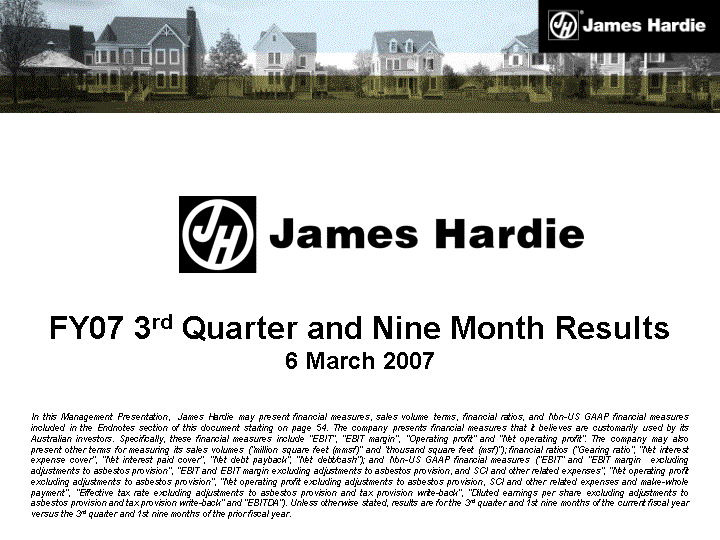
|
FY07 3rd Quarter and Nine Month Results
6 March 2007
In this Management Presentation, James Hardie may present financial measures, sales volume terms, financial ratios, and Non-US GAAP financial measures
included in the Endnotes section of this document starting on page 54. The company presents financial measures that it believes are customarily used by its
Australian investors. Specifically, these financial measures include "EBIT", "EBIT margin", "Operating profit" and "Net operating profit". The company may also
present other terms for measuring its sales volumes ("million square feet (mmsf)" and "thousand square feet (msf)"); financial ratios ("Gearing ratio", "Net interest
expense cover", "Net interest paid cover", "Net debt payback", "Net debt/cash"); and Non-US GAAP financial measures ("EBIT" and "EBIT margin excluding
adjustments to asbestos provision", "EBIT and EBIT margin excluding adjustments to asbestos provision, and SCI and other related expenses", "Net operating profit
excluding adjustments to asbestos provision", "Net operating profit excluding adjustments to asbestos provision, SCI and other related expenses and make-whole
payment", "Effective tax rate excluding adjustments to asbestos provision and tax provision write-back", "Diluted earnings per share excluding adjustments to
asbestos provision and tax provision write-back" and "EBITDA"). Unless otherwise stated, results are for the 3rd quarter and 1st nine months of the current fiscal year
versus the 3rd quarter and 1st nine months of the prior fiscal year.
|
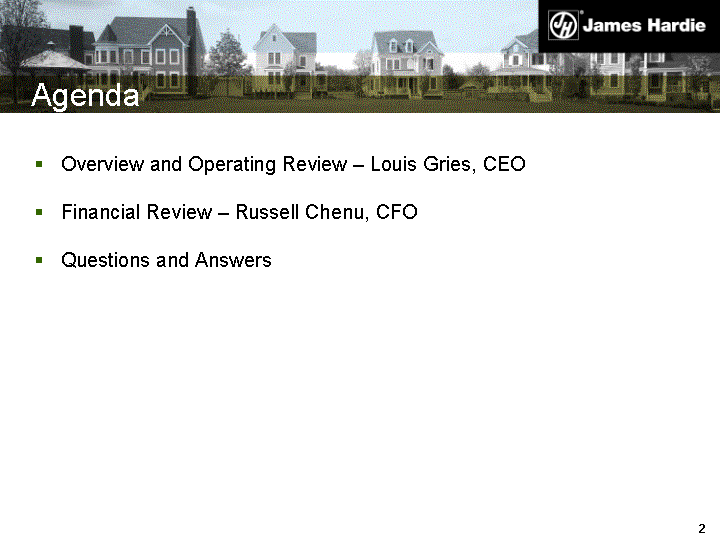
|
Overview and Operating Review - Louis Gries, CEO
Financial Review - Russell Chenu, CFO
Questions and Answers
Agenda
|
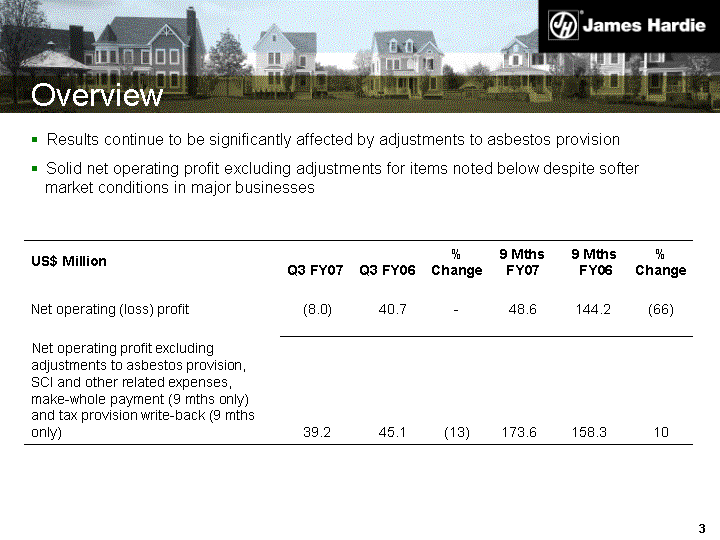
|
Overview
US$ Million Q3 FY07 Q3 FY06 %
Change 9 Mths
FY07 9 Mths
FY06 %
Change
Net operating (loss) profit (8.0) 40.7 - 48.6 144.2 (66)
Net operating profit excluding adjustments to asbestos provision, SCI and other related expenses, make-whole payment (9 mths only) and tax provision write-back (9 mths only)
39.2
45.1
(13)
173.6
158.3
10
Results continue to be significantly affected by adjustments to asbestos provision
Solid net operating profit excluding adjustments for items noted below despite softer
market conditions in major businesses
|
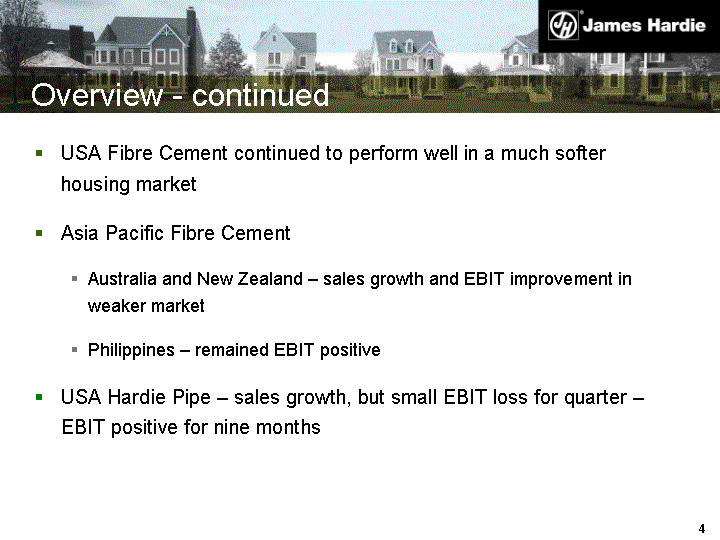
|
Overview - continued
USA Fibre Cement continued to perform well in a much softer
housing market
Asia Pacific Fibre Cement
Australia and New Zealand - sales growth and EBIT improvement in
weaker market
Philippines - remained EBIT positive
USA Hardie Pipe - sales growth, but small EBIT loss for quarter -
EBIT positive for nine months
|
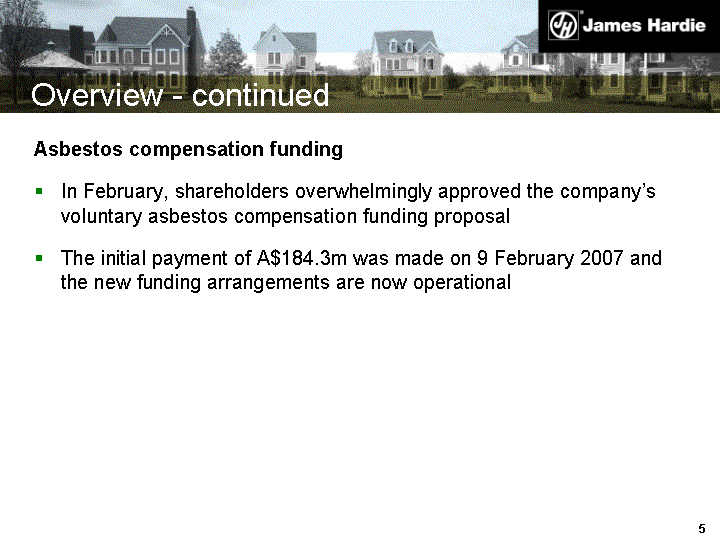
|
Overview - continued
Asbestos compensation funding
In February, shareholders overwhelmingly approved the company's
voluntary asbestos compensation funding proposal
The initial payment of A$184.3m was made on 9 February 2007 and
the new funding arrangements are now operational
|
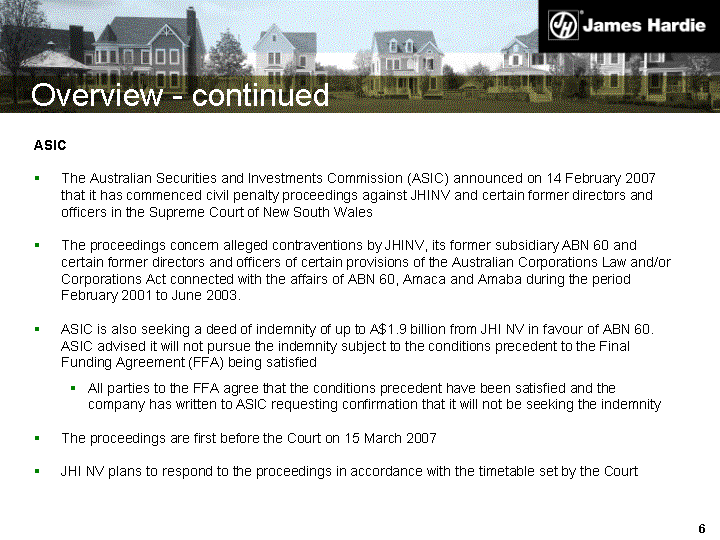
|
Overview - continued
ASIC
The Australian Securities and Investments Commission (ASIC) announced on 14 February 2007
that it has commenced civil penalty proceedings against JHINV and certain former directors and
officers in the Supreme Court of New South Wales
The proceedings concern alleged contraventions by JHINV, its former subsidiary ABN 60 and
certain former directors and officers of certain provisions of the Australian Corporations Law and/or
Corporations Act connected with the affairs of ABN 60, Amaca and Amaba during the period
February 2001 to June 2003.
ASIC is also seeking a deed of indemnity of up to A$1.9 billion from JHI NV in favour of ABN 60.
ASIC advised it will not pursue the indemnity subject to the conditions precedent to the Final
Funding Agreement (FFA) being satisfied
All parties to the FFA agree that the conditions precedent have been satisfied and the
company has written to ASIC requesting confirmation that it will not be seeking the indemnity
The proceedings are first before the Court on 15 March 2007
JHI NV plans to respond to the proceedings in accordance with the timetable set by the Court
|
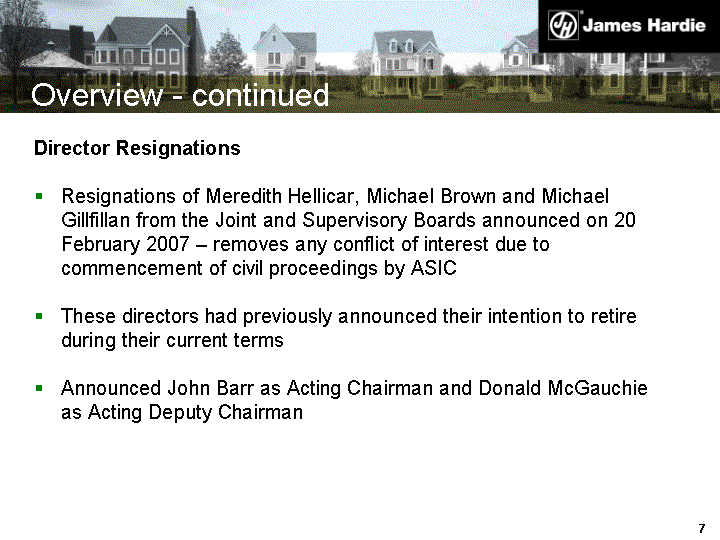
|
Overview - continued
Director Resignations
Resignations of Meredith Hellicar, Michael Brown and Michael
Gillfillan from the Joint and Supervisory Boards announced on 20
February 2007 - removes any conflict of interest due to
commencement of civil proceedings by ASIC
These directors had previously announced their intention to retire
during their current terms
Announced John Barr as Acting Chairman and Donald McGauchie
as Acting Deputy Chairman
|
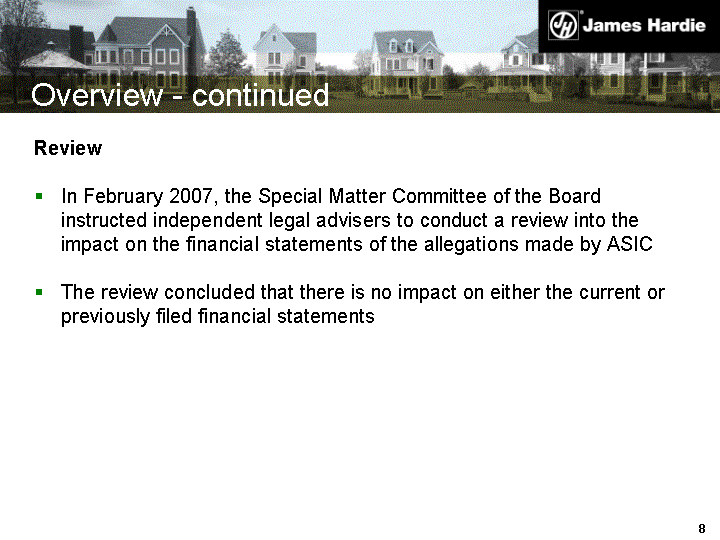
|
Overview - continued
Review
In February 2007, the Special Matter Committee of the Board
instructed independent legal advisers to conduct a review into the
impact on the financial statements of the allegations made by ASIC
The review concluded that there is no impact on either the current or
previously filed financial statements
|
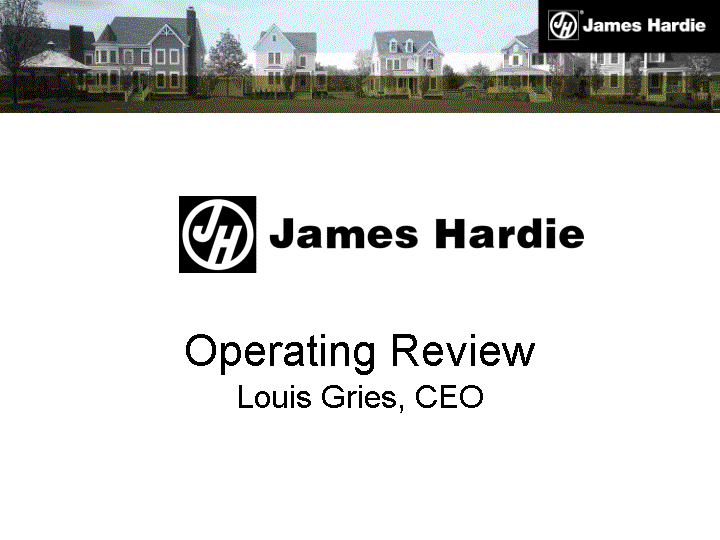
|
Operating Review
Louis Gries, CEO
|
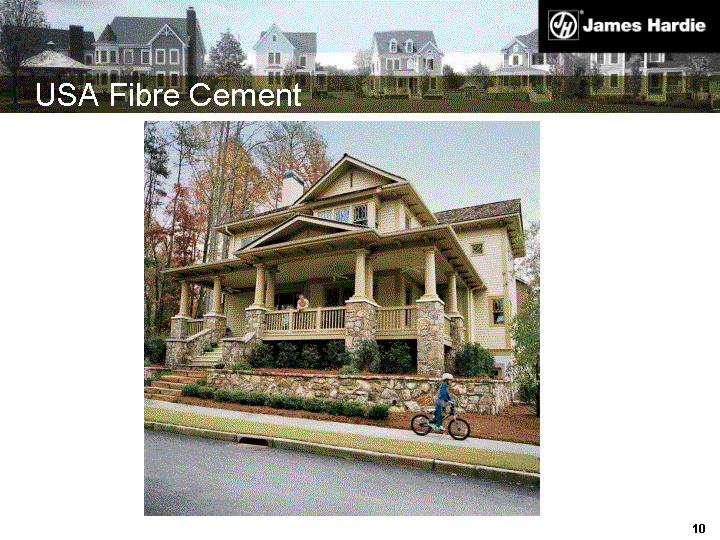
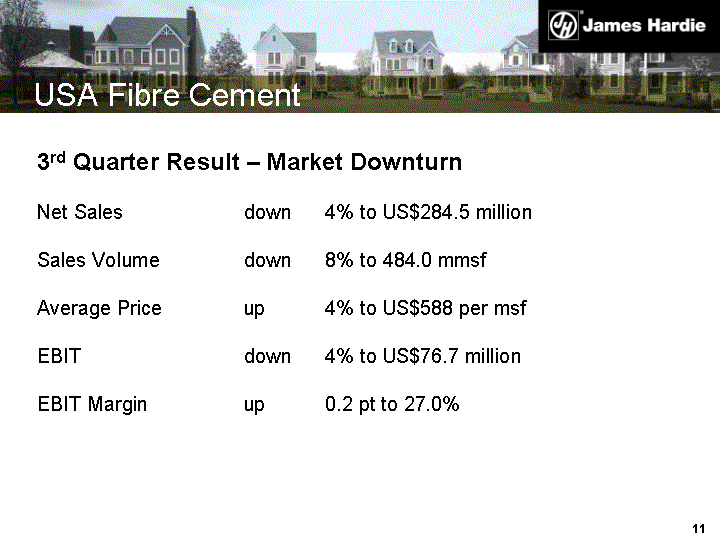
|
3rd Quarter Result - Market Downturn
Net Sales down 4% to US$284.5 million
Sales Volume down 8% to 484.0 mmsf
Average Price up 4% to US$588 per msf
EBIT down 4% to US$76.7 million
EBIT Margin up 0.2 pt to 27.0%
USA Fibre Cement
|
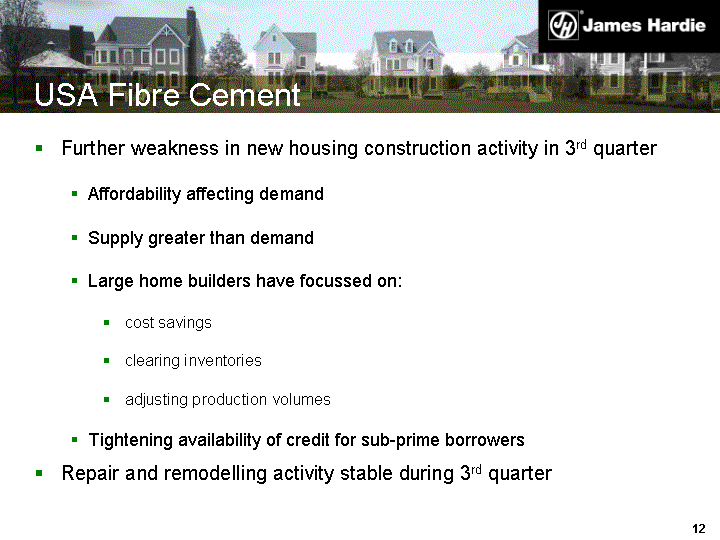
|
USA Fibre Cement
Further weakness in new housing construction activity in 3rd quarter
Affordability affecting demand
Supply greater than demand
Large home builders have focussed on:
cost savings
clearing inventories
adjusting production volumes
Tightening availability of credit for sub-prime borrowers
Repair and remodelling activity stable during 3rd quarter
|
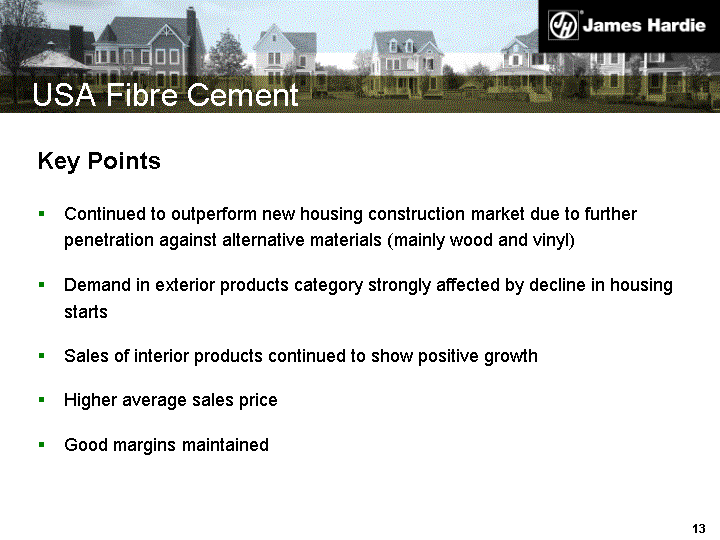
|
USA Fibre Cement
Key Points
Continued to outperform new housing construction market due to further
penetration against alternative materials (mainly wood and vinyl)
Demand in exterior products category strongly affected by decline in housing
starts
Sales of interior products continued to show positive growth
Higher average sales price
Good margins maintained
|
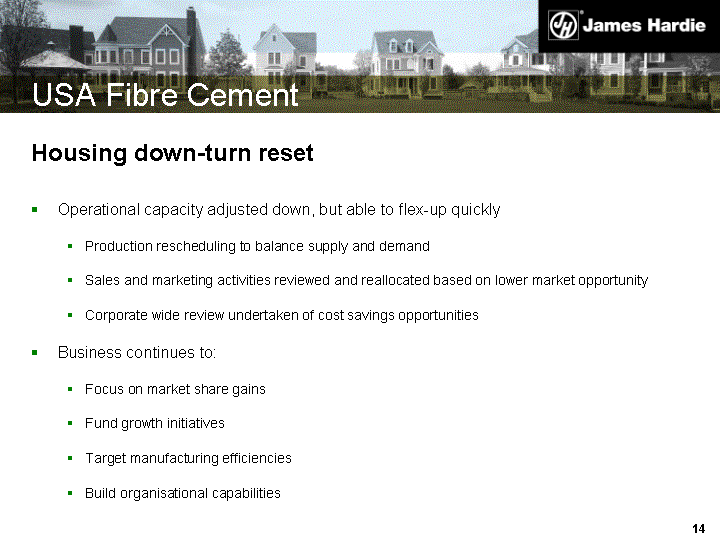
|
USA Fibre Cement
Housing down-turn reset
Operational capacity adjusted down, but able to flex-up quickly
Production rescheduling to balance supply and demand
Sales and marketing activities reviewed and reallocated based on lower market opportunity
Corporate wide review undertaken of cost savings opportunities
Business continues to:
Focus on market share gains
Fund growth initiatives
Target manufacturing efficiencies
Build organisational capabilities
|
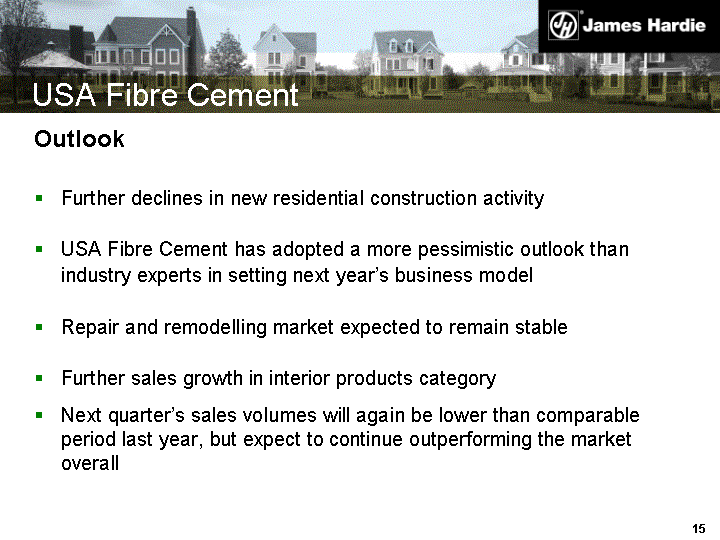
|
USA Fibre Cement
Outlook
Further declines in new residential construction activity
USA Fibre Cement has adopted a more pessimistic outlook than
industry experts in setting next year's business model
Repair and remodelling market expected to remain stable
Further sales growth in interior products category
Next quarter's sales volumes will again be lower than comparable
period last year, but expect to continue outperforming the market
overall
|
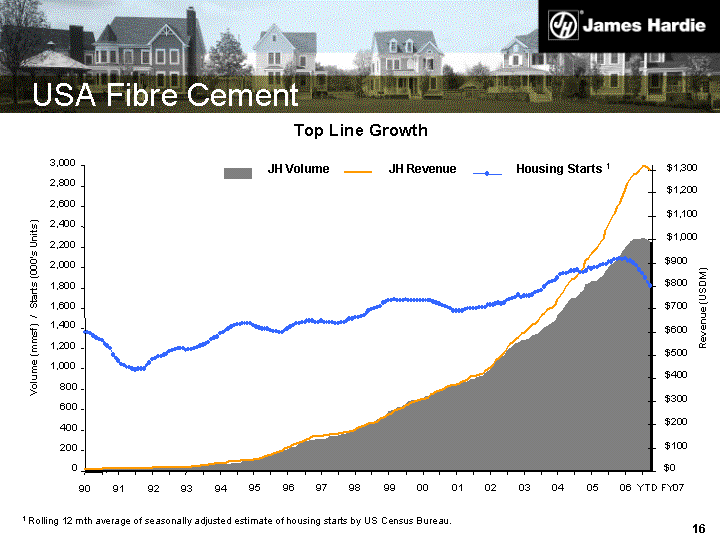
|
USA Fibre Cement
Top Line Growth
0
200
400
600
800
1,000
1,200
1,400
1,600
1,800
2,000
2,200
2,400
2,600
2,800
3,000
90
91
92
93
94
95
96
97
98
99
00
01
02
03
04
05
Volume (mmsf) / Starts (000's Units)
$0
$100
$200
$300
$400
$500
$600
$700
$800
$900
$1,000
$1,100
$1,200
$1,300
Revenue (USDM)
JH Volume
JH Revenue
Housing Starts 1
06
YTD FY07
1 Rolling 12 mth average of seasonally adjusted estimate of housing starts by US Census Bureau.
|
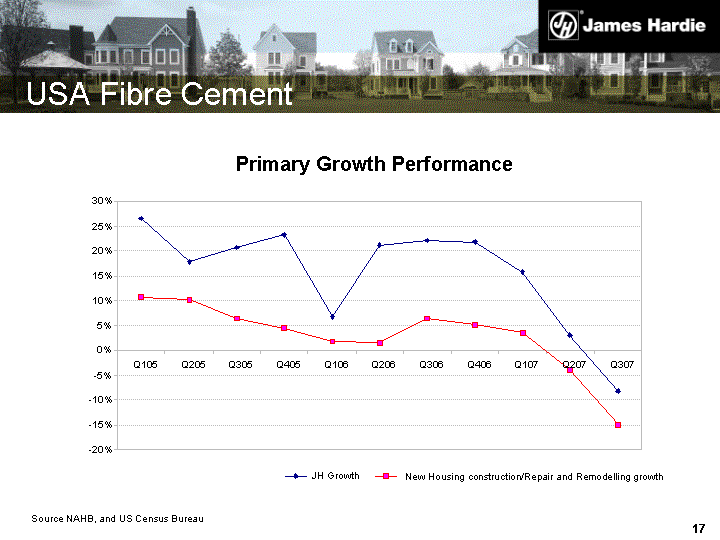
|
USA Fibre Cement
Source NAHB, and US Census Bureau
- -20%
- -15%
- -10%
- -5%
0%
5%
10%
15%
20%
25%
30%
Q105
Q205
Q305
Q405
Q106
Q206
Q306
Q406
Q107
Q207
Q307
JH Growth
New Housing construction/Repair and Remodelling growth
Primary Growth Performance
|
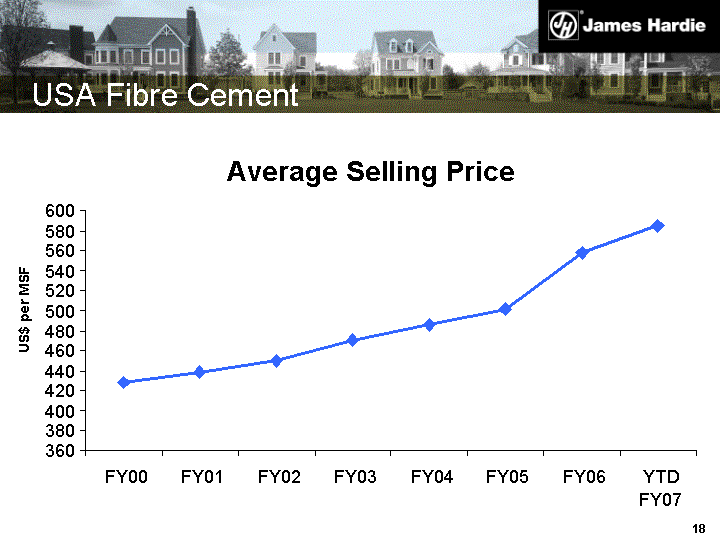
|
USA Fibre Cement
Average Selling Price
US$ per MSF
360
380
400
420
440
460
480
500
520
540
560
580
600
FY00
FY01
FY02
FY03
FY04
FY05
FY06
YTD
FY07
|
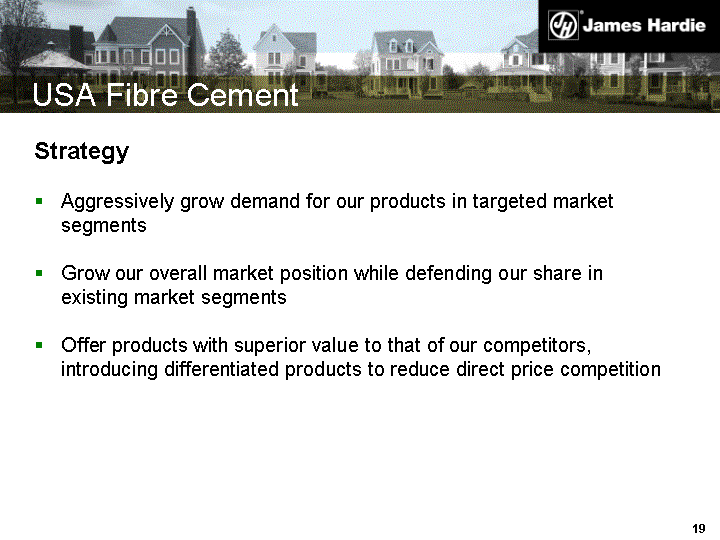
|
USA Fibre Cement
Strategy
Aggressively grow demand for our products in targeted market
segments
Grow our overall market position while defending our share in
existing market segments
Offer products with superior value to that of our competitors,
introducing differentiated products to reduce direct price competition
|
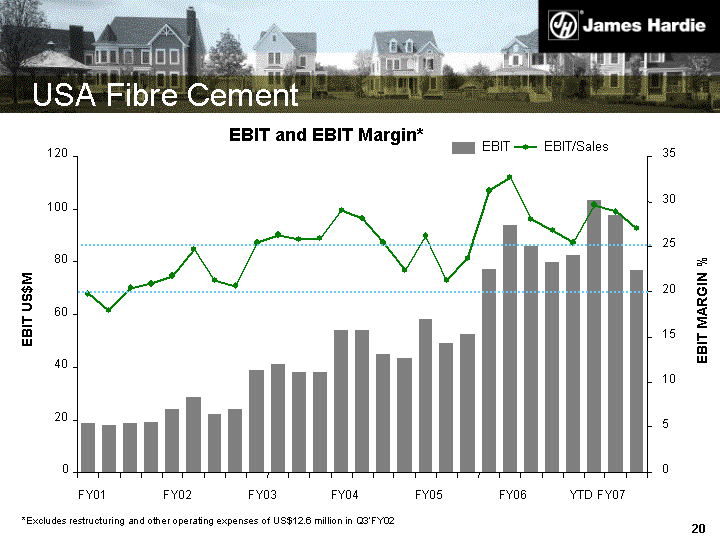
|
USA Fibre Cement
*Excludes restructuring and other operating expenses of US$12.6 million in Q3'FY02
EBIT and EBIT Margin*
0
20
40
60
80
100
120
FY01
FY02
FY03
FY04
FY05
FY06
YTD FY07
EBIT US$M
0
5
10
15
20
25
30
35
EBIT MARGIN %
EBIT
EBIT/Sales
|
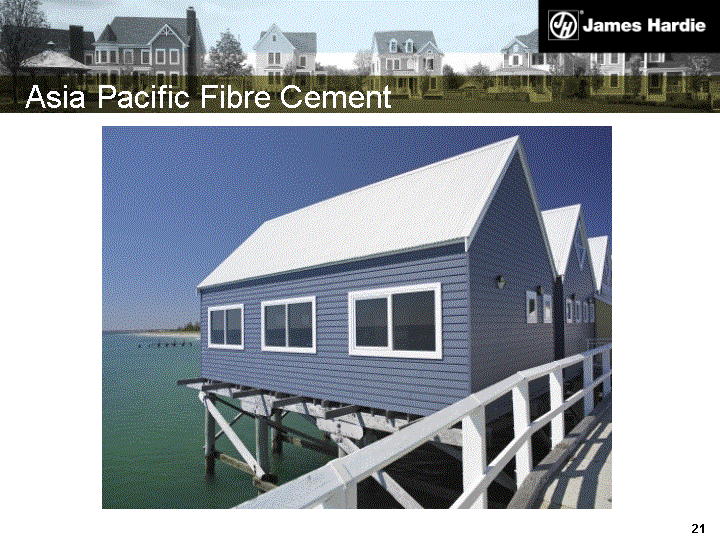
|
Asia Pacific Fibre Cement
|
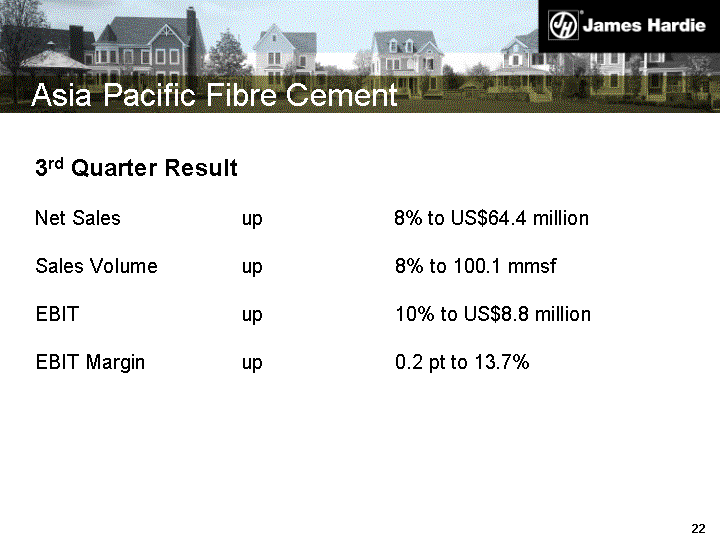
|
Asia Pacific Fibre Cement
3rd Quarter Result
Net Sales up 8% to US$64.4 million
Sales Volume up 8% to 100.1 mmsf
EBIT up 10% to US$8.8 million
EBIT Margin up 0.2 pt to 13.7%
|
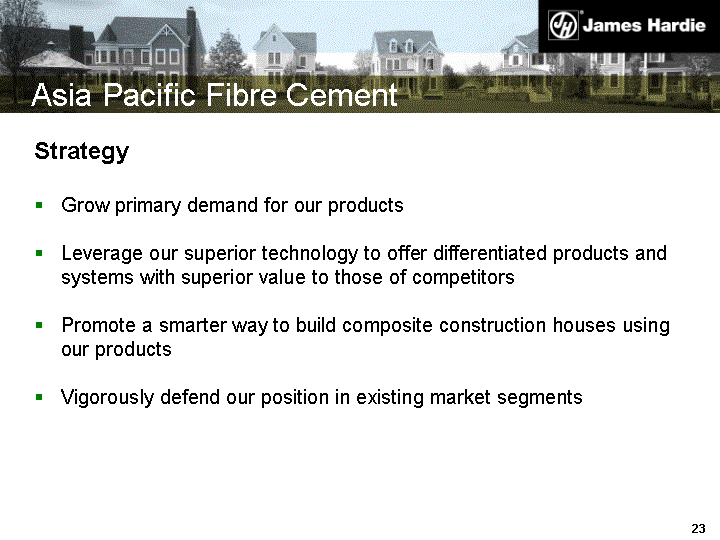
|
Strategy
Grow primary demand for our products
Leverage our superior technology to offer differentiated products and
systems with superior value to those of competitors
Promote a smarter way to build composite construction houses using
our products
Vigorously defend our position in existing market segments
Asia Pacific Fibre Cement
|
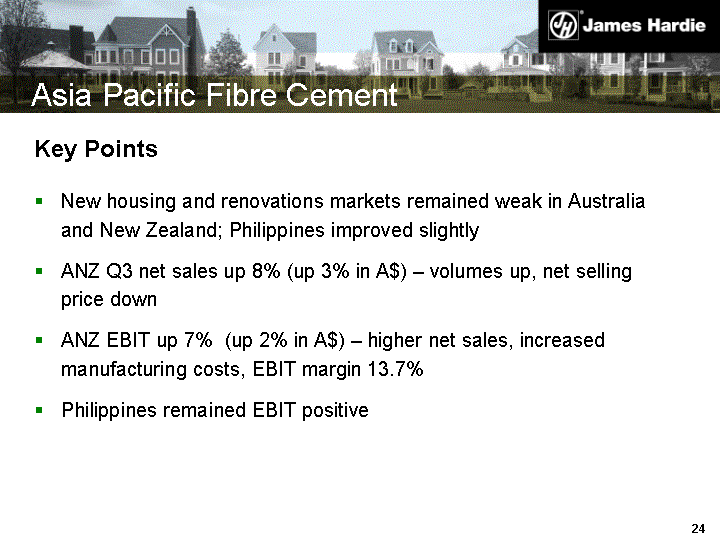
|
Asia Pacific Fibre Cement
Key Points
New housing and renovations markets remained weak in Australia
and New Zealand; Philippines improved slightly
ANZ Q3 net sales up 8% (up 3% in A$) - volumes up, net selling
price down
ANZ EBIT up 7% (up 2% in A$) - higher net sales, increased
manufacturing costs, EBIT margin 13.7%
Philippines remained EBIT positive
|
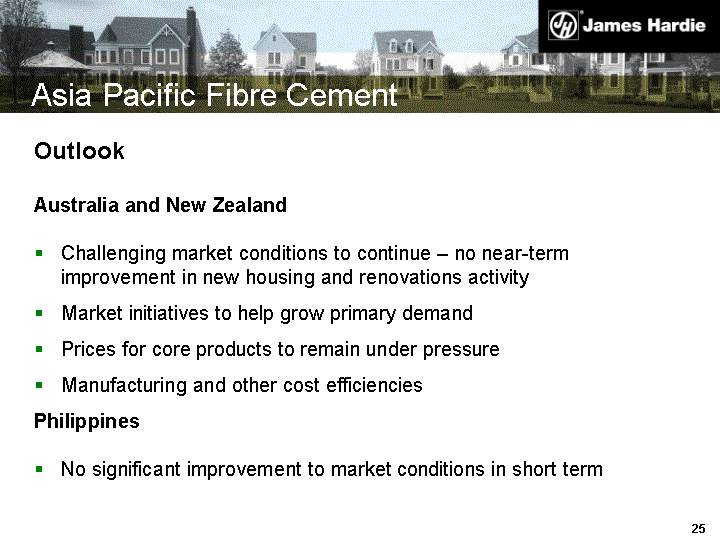
|
Asia Pacific Fibre Cement
Outlook
Australia and New Zealand
Challenging market conditions to continue - no near-term
improvement in new housing and renovations activity
Market initiatives to help grow primary demand
Prices for core products to remain under pressure
Manufacturing and other cost efficiencies
Philippines
No significant improvement to market conditions in short term
|
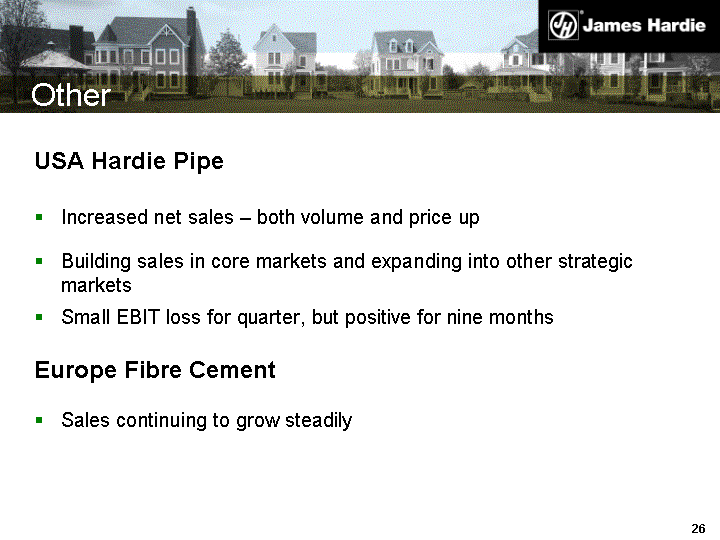
|
Other
USA Hardie Pipe
Increased net sales - both volume and price up
Building sales in core markets and expanding into other strategic
markets
Small EBIT loss for quarter, but positive for nine months
Europe Fibre Cement
Sales continuing to grow steadily
|
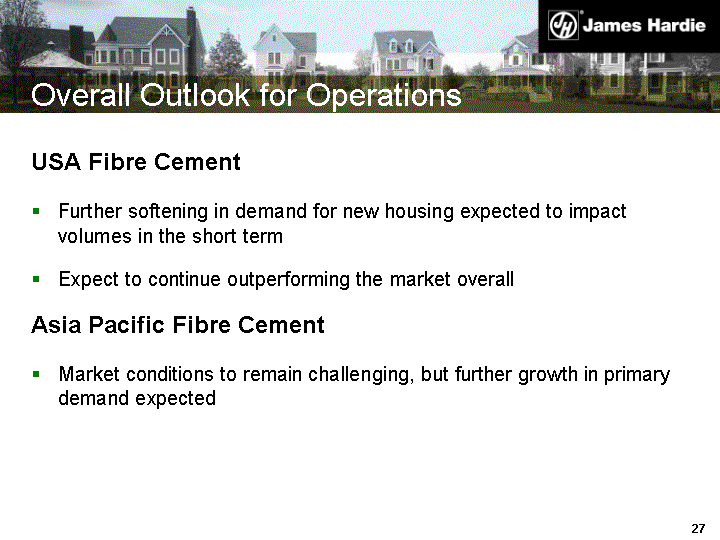
|
Overall Outlook for Operations
USA Fibre Cement
Further softening in demand for new housing expected to impact
volumes in the short term
Expect to continue outperforming the market overall
Asia Pacific Fibre Cement
Market conditions to remain challenging, but further growth in primary
demand expected
|
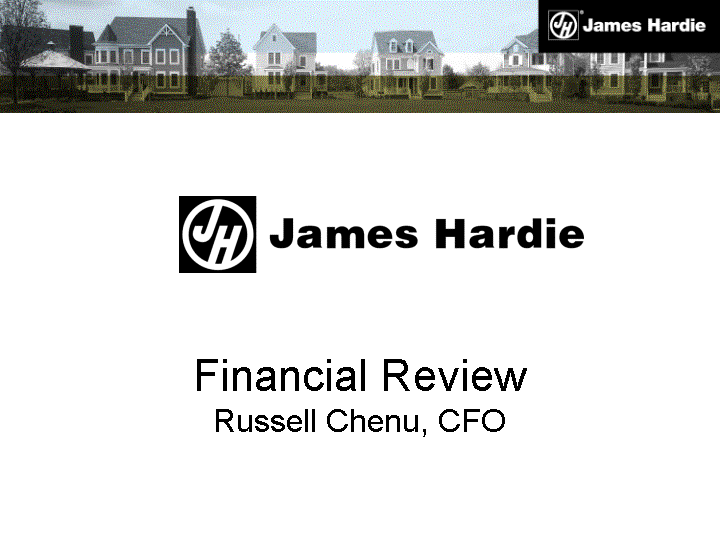
|
Financial Review
Russell Chenu, CFO
|
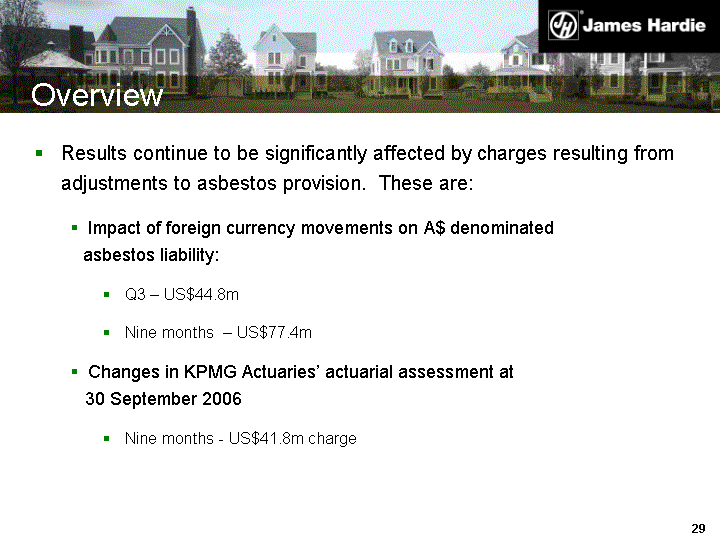
|
Overview
Results continue to be significantly affected by charges resulting from
adjustments to asbestos provision. These are:
Impact of foreign currency movements on A$ denominated
asbestos liability:
Q3 - US$44.8m
Nine months - US$77.4m
Changes in KPMG Actuaries' actuarial assessment at
30 September 2006
Nine months - US$41.8m charge
|
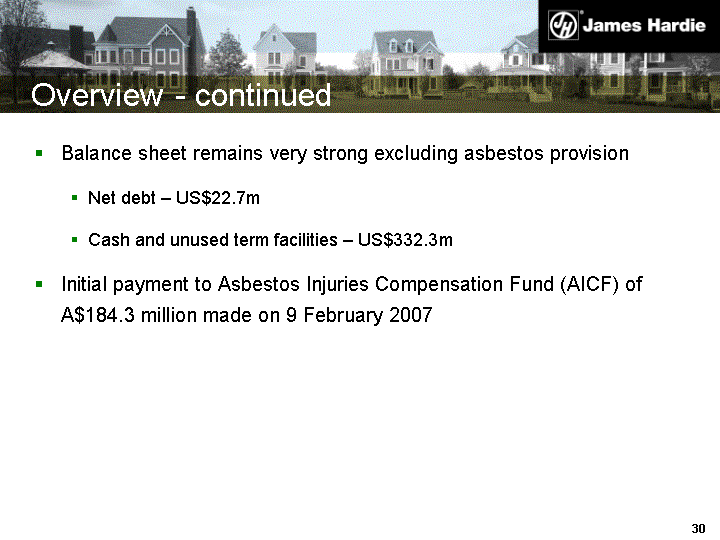
|
Overview - continued
Balance sheet remains very strong excluding asbestos provision
Net debt - US$22.7m
Cash and unused term facilities - US$332.3m
Initial payment to Asbestos Injuries Compensation Fund (AICF) of
A$184.3 million made on 9 February 2007
|
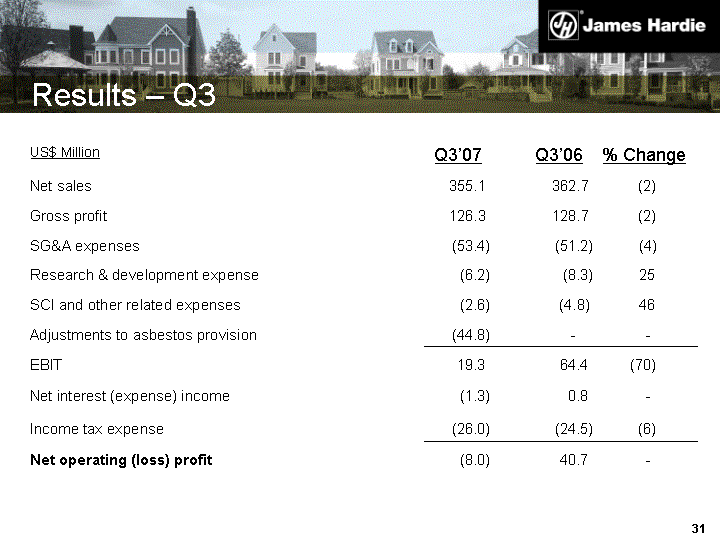
|
US$ Million
Q3'07
Q3'06
% Change
Net sales 355.1 362.7 (2)
Gross profit 126.3 128.7 (2)
SG&A expenses (53.4) (51.2) (4)
Research & development expense (6.2) (8.3) 25
SCI and other related expenses (2.6) (4.8) 46
Adjustments to asbestos provision (44.8) - -
EBIT 19.3 64.4 (70)
Net interest (expense) income (1.3) 0.8 -
Income tax expense (26.0) (24.5) (6)
Net operating (loss) profit (8.0) 40.7 -
Results - Q3
|
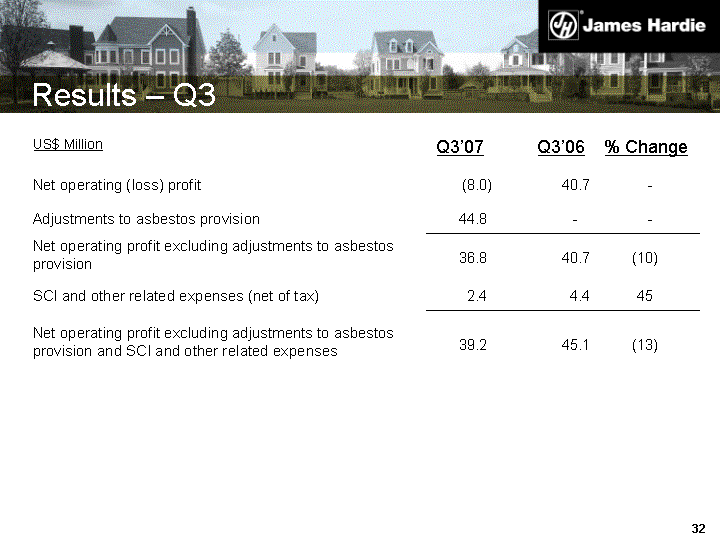
|
US$ Million
Q3'07
Q3'06
% Change
Net operating (loss) profit (8.0) 40.7 -
Adjustments to asbestos provision 44.8 - -
Net operating profit excluding adjustments to asbestos provision 36.8 40.7 (10)
SCI and other related expenses (net of tax) 2.4 4.4 45
Net operating profit excluding adjustments to asbestos provision and SCI and other related expenses 39.2 45.1 (13)
Results - Q3
|
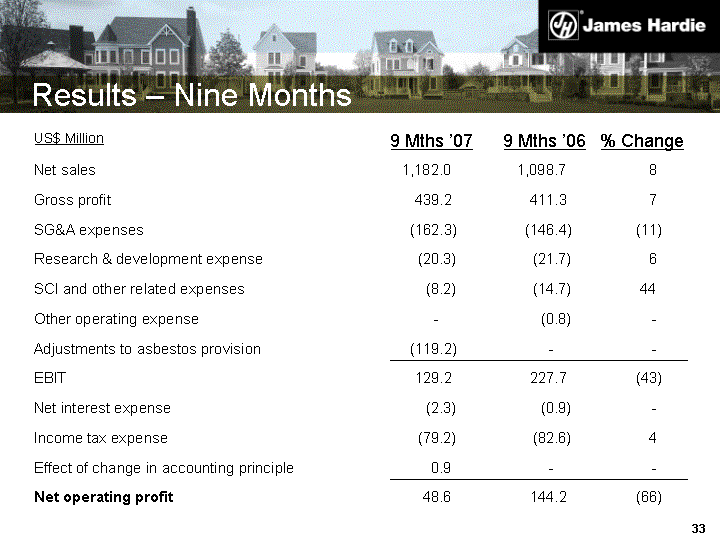
|
Results - Nine Months
US$ Million
9 Mths '07
9 Mths '06
% Change
Net sales 1,182.0 1,098.7 8
Gross profit 439.2 411.3 7
SG&A expenses (162.3) (146.4) (11)
Research & development expense (20.3) (21.7) 6
SCI and other related expenses (8.2) (14.7) 44
Other operating expense - (0.8) -
Adjustments to asbestos provision (119.2) - -
EBIT 129.2 227.7 (43)
Net interest expense (2.3) (0.9) -
Income tax expense (79.2) (82.6) 4
Effect of change in accounting principle 0.9 - -
Net operating profit 48.6 144.2 (66)
|
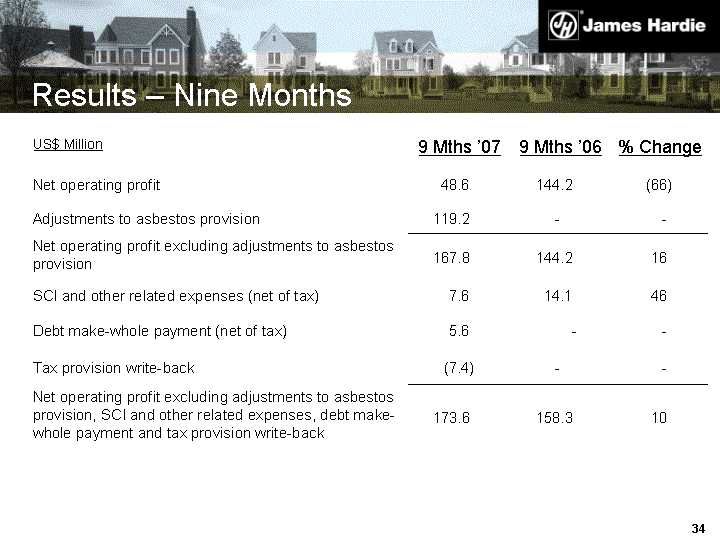
|
US$ Million
9 Mths '07
9 Mths '06
% Change
Net operating profit 48.6 144.2 (66)
Adjustments to asbestos provision 119.2 - -
Net operating profit excluding adjustments to asbestos provision 167.8 144.2 16
SCI and other related expenses (net of tax) 7.6 14.1 46
Debt make-whole payment (net of tax) 5.6 - -
Tax provision write-back (7.4) - -
Net operating profit excluding adjustments to asbestos provision, SCI and other related expenses, debt make-whole payment and tax provision write-back 173.6 158.3 10
Results - Nine Months
|
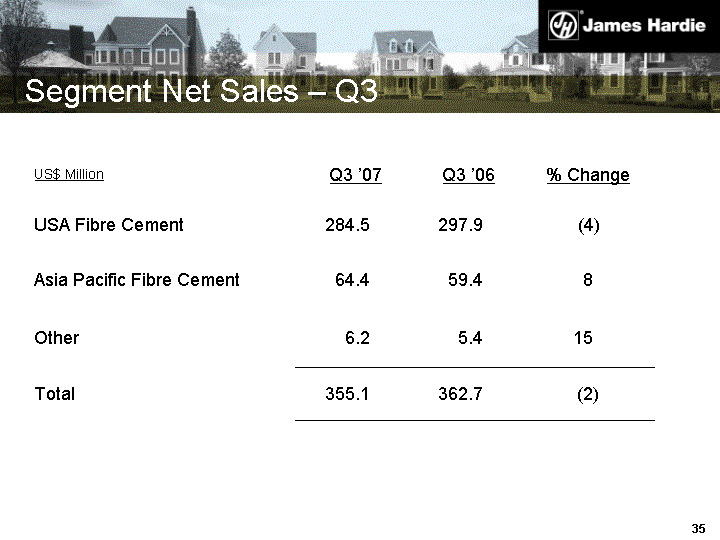
|
Segment Net Sales - Q3
US$ Million Q3 '07 Q3 '06 % Change
USA Fibre Cement 284.5 297.9 (4)
Asia Pacific Fibre Cement 64.4 59.4 8
Other 6.2 5.4 15
Total 355.1 362.7 (2)
|
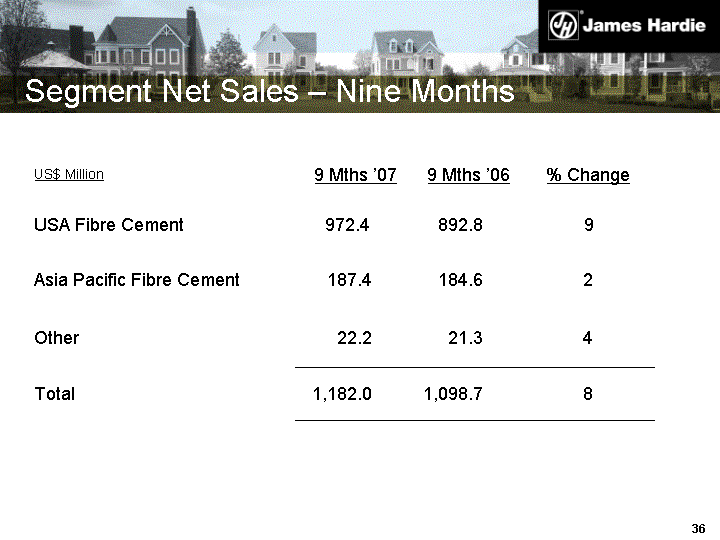
|
Segment Net Sales - Nine Months
US$ Million 9 Mths '07 9 Mths '06 % Change
USA Fibre Cement 972.4 892.8 9
Asia Pacific Fibre Cement 187.4 184.6 2
Other 22.2 21.3 4
Total 1,182.0 1,098.7 8
|
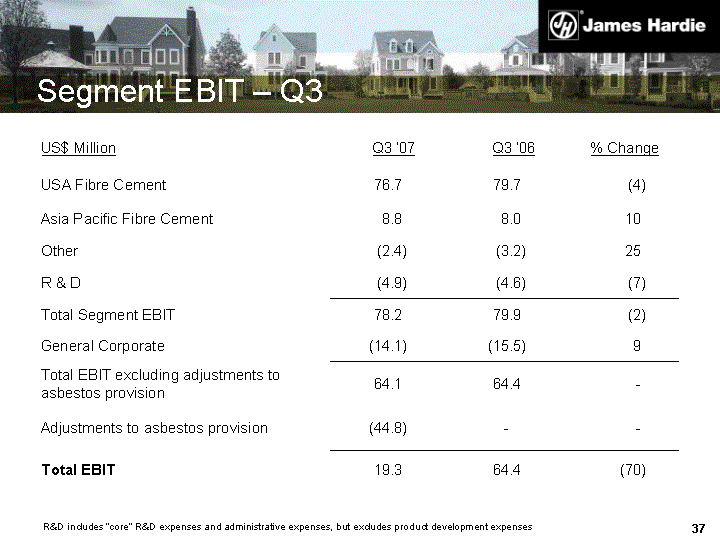
|
Segment EBIT - Q3
US$ Million Q3 '07 Q3 '06 % Change
USA Fibre Cement 76.7 79.7 (4)
Asia Pacific Fibre Cement 8.8 8.0 10
Other (2.4) (3.2) 25
R & D (4.9) (4.6) (7)
Total Segment EBIT 78.2 79.9 (2)
General Corporate (14.1) (15.5) 9
Total EBIT excluding adjustments to asbestos provision 64.1 64.4 -
Adjustments to asbestos provision (44.8) - -
Total EBIT 19.3 64.4 (70)
R&D includes "core" R&D expenses and administrative expenses, but excludes product development expenses
|
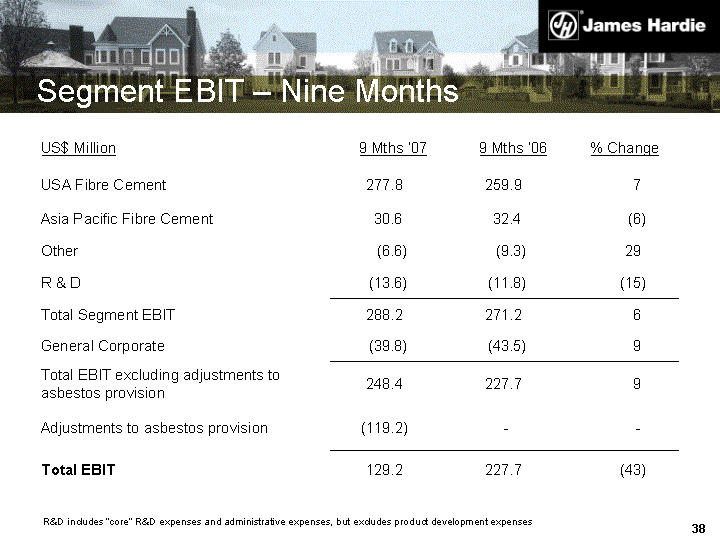
|
Segment EBIT - Nine Months
US$ Million 9 Mths '07 9 Mths '06 % Change
USA Fibre Cement 277.8 259.9 7
Asia Pacific Fibre Cement 30.6 32.4 (6)
Other (6.6) (9.3) 29
R & D (13.6) (11.8) (15)
Total Segment EBIT 288.2 271.2 6
General Corporate (39.8) (43.5) 9
Total EBIT excluding adjustments to asbestos provision 248.4 227.7 9
Adjustments to asbestos provision (119.2) - -
Total EBIT 129.2 227.7 (43)
R&D includes "core" R&D expenses and administrative expenses, but excludes product development expenses
|
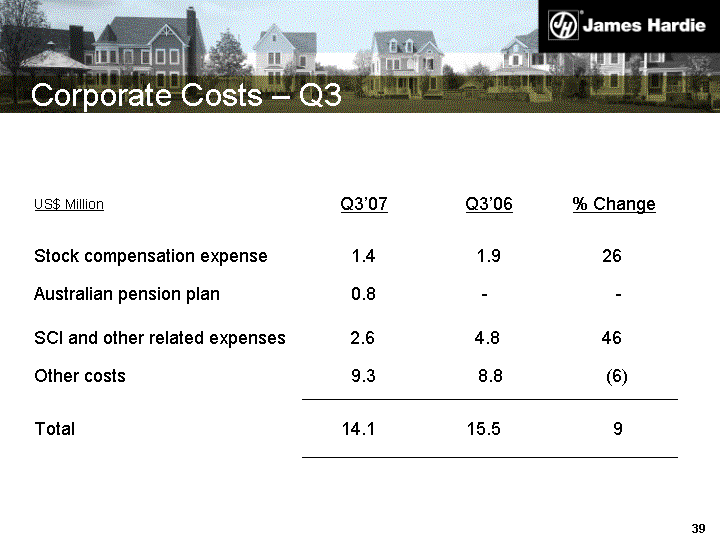
|
Corporate Costs - Q3
US$ Million Q3'07 Q3'06 % Change
Stock compensation expense 1.4 1.9 26
Australian pension plan
SCI and other related expenses 0.8
2.6 -
4.8 -
46
Other costs 9.3 8.8 (6)
Total 14.1 15.5 9
|
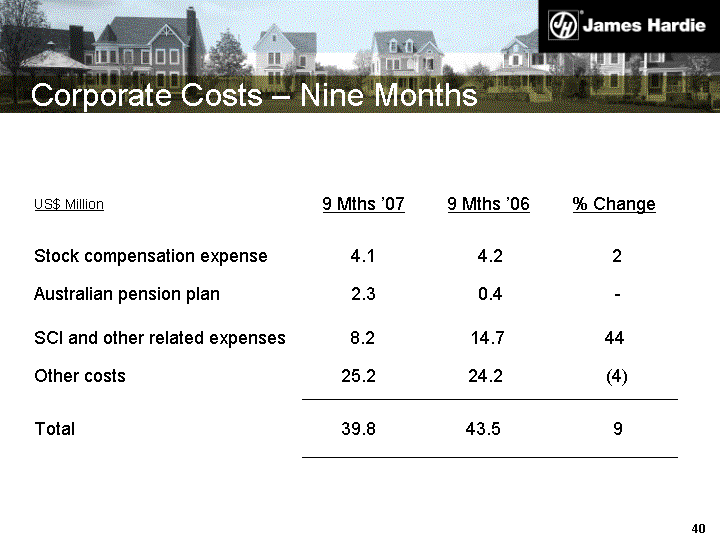
|
Corporate Costs - Nine Months
US$ Million 9 Mths '07 9 Mths '06 % Change
Stock compensation expense 4.1 4.2 2
Australian pension plan
SCI and other related expenses 2.3
8.2 0.4
14.7 -
44
Other costs 25.2 24.2 (4)
Total 39.8 43.5 9
|
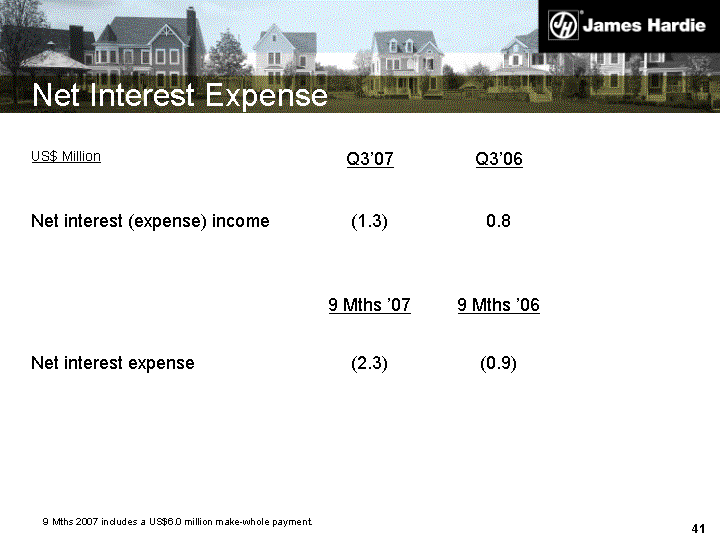
|
Net Interest Expense
US$ Million Q3'07 Q3'06
Net interest (expense) income (1.3) 0.8
9 Mths '07 9 Mths '06
Net interest expense
(2.3) (0.9)
9 Mths 2007 includes a US$6.0 million make-whole payment.
|
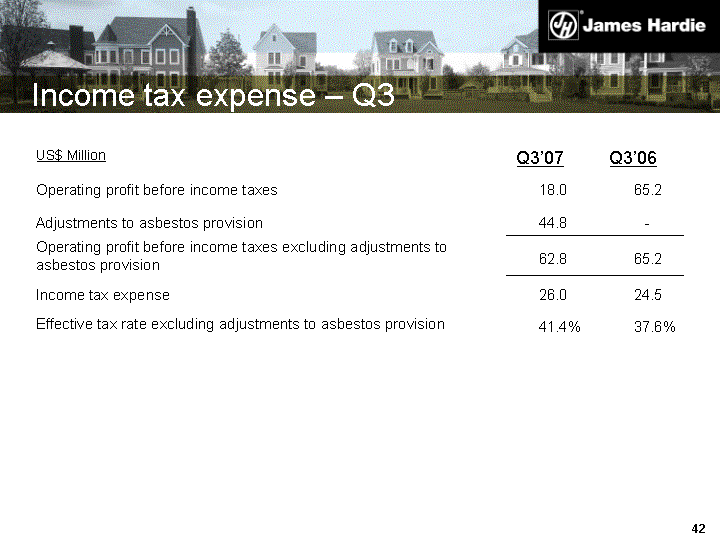
|
Income tax expense - Q3
US$ Million
Q3'07
Q3'06
Operating profit before income taxes 18.0 65.2
Adjustments to asbestos provision 44.8 -
Operating profit before income taxes excluding adjustments to asbestos provision 62.8 65.2
Income tax expense 26.0 24.5
Effective tax rate excluding adjustments to asbestos provision 41.4% 37.6%
|
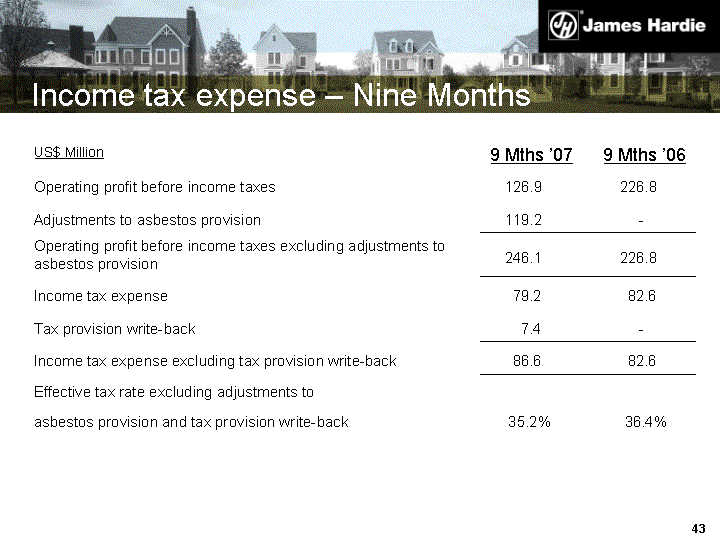
|
Income tax expense - Nine Months
US$ Million
9 Mths '07
9 Mths '06
Operating profit before income taxes 126.9 226.8
Adjustments to asbestos provision 119.2 -
Operating profit before income taxes excluding adjustments to asbestos provision 246.1 226.8
Income tax expense 79.2 82.6
Tax provision write-back 7.4 -
Income tax expense excluding tax provision write-back 86.6 82.6
Effective tax rate excluding adjustments to
asbestos provision and tax provision write-back
35.2%
36.4%
|
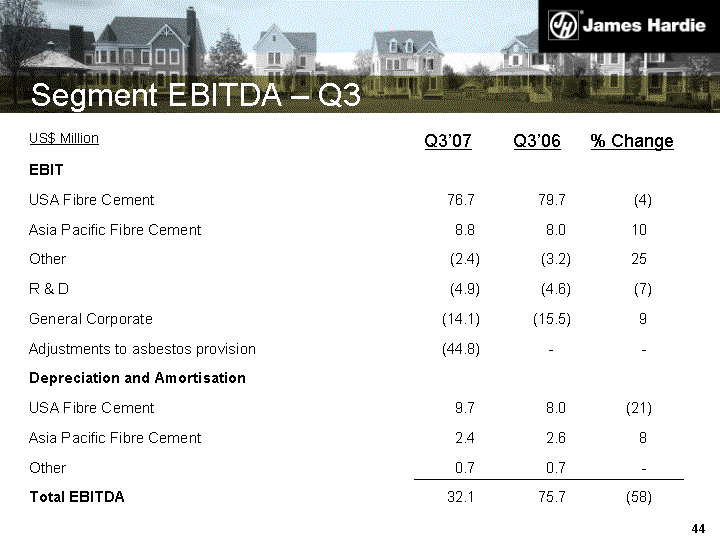
|
Segment EBITDA - Q3
US$ Million
Q3'07
Q3'06
% Change
EBIT
USA Fibre Cement 76.7 79.7 (4)
Asia Pacific Fibre Cement 8.8 8.0 10
Other (2.4) (3.2) 25
R & D (4.9) (4.6) (7)
General Corporate (14.1) (15.5) 9
Adjustments to asbestos provision (44.8) - -
Depreciation and Amortisation
USA Fibre Cement 9.7 8.0 (21)
Asia Pacific Fibre Cement 2.4 2.6 8
Other 0.7 0.7 -
Total EBITDA 32.1 75.7 (58)
|

|
Segment EBITDA - Nine Months
US$ Million
9 Mths '07
9 Mths '06
% Change
EBIT
USA Fibre Cement 277.8 259.9 7
Asia Pacific Fibre Cement 30.6 32.4 (6)
Other (6.6) (9.3) 29
R & D (13.6) (11.8) (15)
General Corporate (39.8) (43.5) 9
Adjustments to asbestos provision (119.2) - -
Depreciation and Amortisation
USA Fibre Cement 27.6 24.2 (14)
Asia Pacific Fibre Cement 7.5 7.4 (1)
Other 1.9 2.2 14
Total EBITDA 166.2 261.5 (36)
|
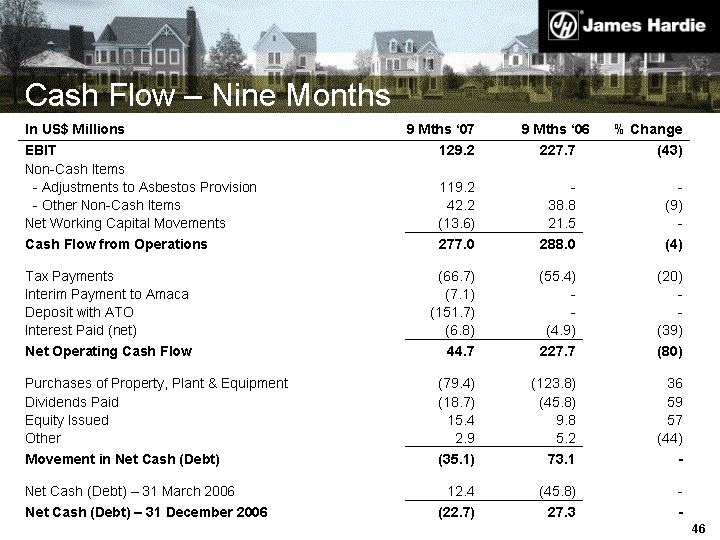
|
Cash Flow - Nine Months
In US$ Millions 9 Mths '07 9 Mths '07 9 Mths '06 9 Mths '06 % Change
EBIT EBIT 129.2 227.7 (43) (43)
Non-Cash Items Non-Cash Items
- Adjustments to Asbestos Provision - Adjustments to Asbestos Provision 119.2 - - -
- Other Non-Cash Items - Other Non-Cash Items 42.2 38.8 (9) (9)
Net Working Capital Movements Net Working Capital Movements (13.6) 21.5 - -
Cash Flow from Operations Cash Flow from Operations 277.0 288.0 (4) (4)
Tax Payments Tax Payments (66.7) (55.4) (20) (20)
Interim Payment to Amaca Interim Payment to Amaca (7.1) - - -
Deposit with ATO Deposit with ATO (151.7) - - -
Interest Paid (net) Interest Paid (net) (6.8) (4.9) (39) (39)
Net Operating Cash Flow Net Operating Cash Flow 44.7 227.7 (80) (80)
Purchases of Property, Plant & Equipment Purchases of Property, Plant & Equipment (79.4) (123.8) 36 36
Dividends Paid Dividends Paid (18.7) (45.8) 59 59
Equity Issued Equity Issued 15.4 9.8 57 57
Other Other 2.9 5.2 (44) (44)
Movement in Net Cash (Debt) Movement in Net Cash (Debt) (35.1) 73.1 - -
Net Cash (Debt) - 31 March 2006 Net Cash (Debt) - 31 March 2006 12.4 (45.8) - -
Net Cash (Debt) - 31 December 2006 Net Cash (Debt) - 31 December 2006 (22.7) 27.3 - -
|
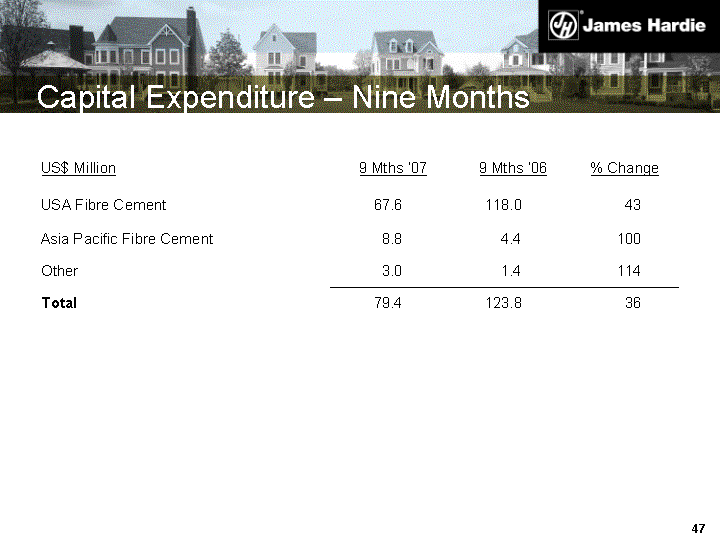
|
Capital Expenditure - Nine Months
US$ Million 9 Mths '07 9 Mths '06 % Change
USA Fibre Cement 67.6 118.0 43
Asia Pacific Fibre Cement 8.8 4.4 100
Other 3.0 1.4 114
Total 79.4 123.8 36
|
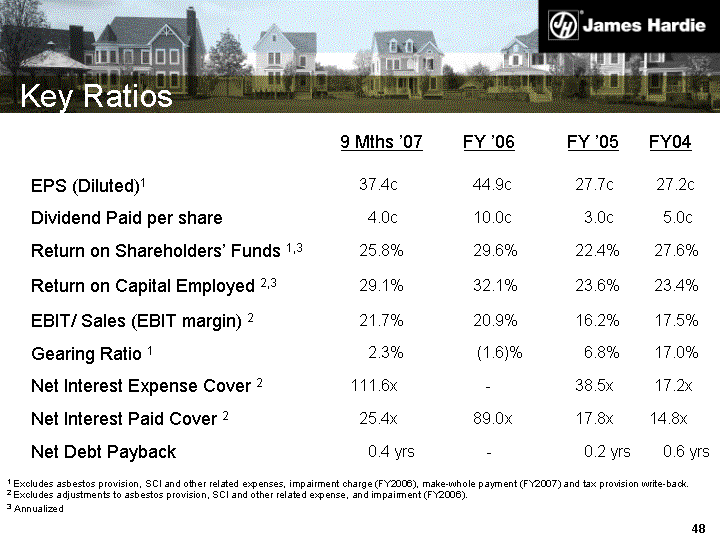
|
Key Ratios
9 Mths '07 FY '06 FY '05 FY04
EPS (Diluted)1 37.4c 44.9c 27.7c 27.2c
Dividend Paid per share 4.0c 10.0c 3.0c 5.0c
Return on Shareholders' Funds 1,3 25.8% 29.6% 22.4% 27.6%
Return on Capital Employed 2,3 29.1% 32.1% 23.6% 23.4%
EBIT/ Sales (EBIT margin) 2 21.7% 20.9% 16.2% 17.5%
Gearing Ratio 1 2.3% (1.6)% 6.8% 17.0%
Net Interest Expense Cover 2 111.6x - 38.5x 17.2x
Net Interest Paid Cover 2 25.4x 89.0x 17.8x 14.8x
Net Debt Payback 0.4 yrs - 0.2 yrs 0.6 yrs
1 Excludes asbestos provision, SCI and other related expenses, impairment charge (FY2006), make-whole payment (FY2007) and tax provision write-back.
2 Excludes adjustments to asbestos provision, SCI and other related expense, and impairment (FY2006).
3 Annualized
|
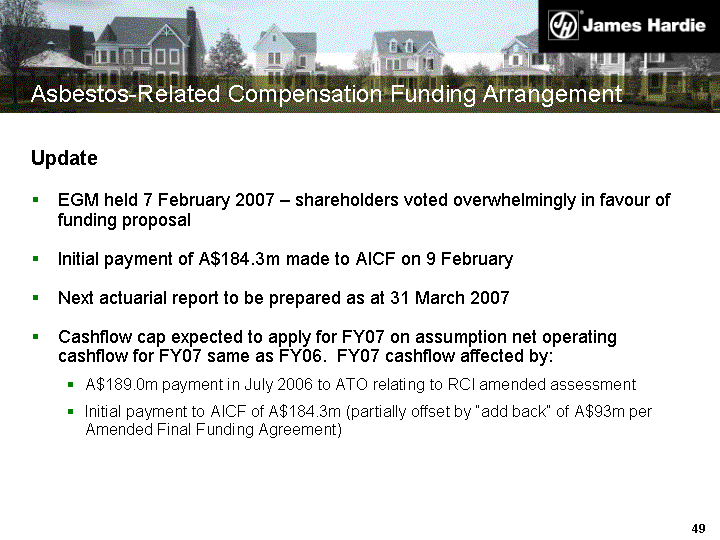
|
Asbestos-Related Compensation Funding Arrangement
Update
EGM held 7 February 2007 - shareholders voted overwhelmingly in favour of
funding proposal
Initial payment of A$184.3m made to AICF on 9 February
Next actuarial report to be prepared as at 31 March 2007
Cashflow cap expected to apply for FY07 on assumption net operating
cashflow for FY07 same as FY06. FY07 cashflow affected by:
A$189.0m payment in July 2006 to ATO relating to RCI amended assessment
Initial payment to AICF of A$184.3m (partially offset by "add back" of A$93m per
Amended Final Funding Agreement)
|
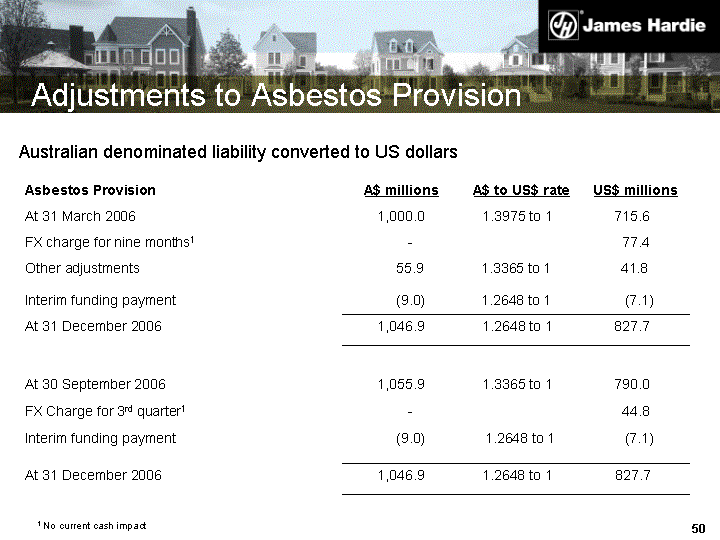
|
Adjustments to Asbestos Provision
Australian denominated liability converted to US dollars
Asbestos Provision A$ millions A$ to US$ rate US$ millions
At 31 March 2006 1,000.0 1.3975 to 1 715.6
FX charge for nine months 1
Other adjustments
-
55.9
1.3365 to 1 77.4
41.8
Interim funding payment (9.0) 1.2648 to 1 (7.1)
At 31 December 2006 1,046.9 1.2648 to 1 827.7
At 30 September 2006 1,055.9 1.3365 to 1 790.0
FX Charge for 3rd quarter 1
Interim funding payment
-
(9.0)
1.2648 to 1 44.8
(7.1)
At 31 December 2006 1,046.9 1.2648 to 1 827.7
1 No current cash impact
|
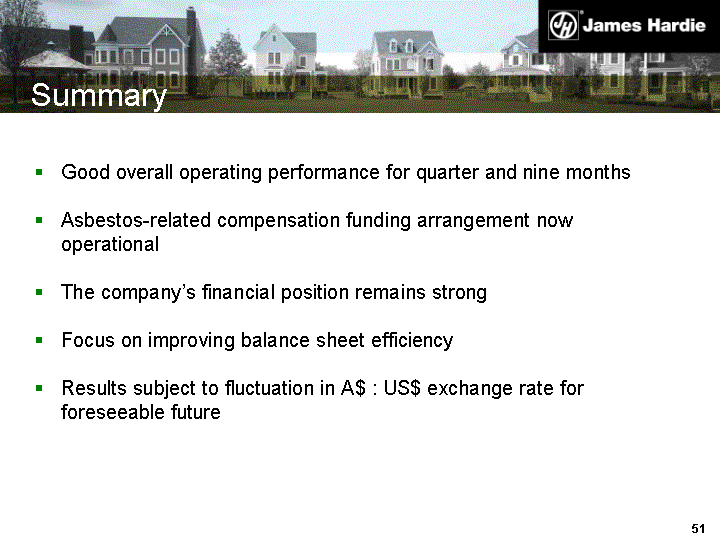
|
Summary
Good overall operating performance for quarter and nine months
Asbestos-related compensation funding arrangement now
operational
The company's financial position remains strong
Focus on improving balance sheet efficiency
Results subject to fluctuation in A$ : US$ exchange rate for
foreseeable future
|

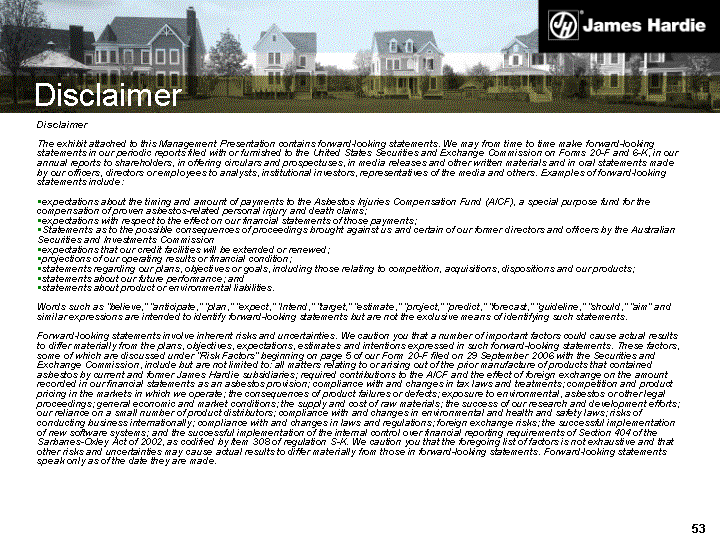
|
Disclaimer
Disclaimer
The exhibit attached to this Management Presentation contains forward-looking statements. We may from time to time make forward-looking
statements in our periodic reports filed with or furnished to the United States Securities and Exchange Commission on Forms 20-F and 6-K, in our
annual reports to shareholders, in offering circulars and prospectuses, in media releases and other written materials and in oral statements made
by our officers, directors or employees to analysts, institutional investors, representatives of the media and others. Examples of forward-looking
statements include:
expectations about the timing and amount of payments to the Asbestos Injuries Compensation Fund (AICF), a special purpose fund for the
compensation of proven asbestos-related personal injury and death claims;
expectations with respect to the effect on our financial statements of those payments;
Statements as to the possible consequences of proceedings brought against us and certain of our former directors and officers by the Australian
Securities and Investments Commission
expectations that our credit facilities will be extended or renewed;
projections of our operating results or financial condition;
statements regarding our plans, objectives or goals, including those relating to competition, acquisitions, dispositions and our products;
statements about our future performance; and
statements about product or environmental liabilities.
Words such as "believe," "anticipate," "plan," "expect," "intend," "target," "estimate," "project," "predict," "forecast," "guideline," "should," "aim" and
similar expressions are intended to identify forward-looking statements but are not the exclusive means of identifying such statements.
Forward-looking statements involve inherent risks and uncertainties. We caution you that a number of important factors could cause actual results
to differ materially from the plans, objectives, expectations, estimates and intentions expressed in such forward-looking statements. These factors,
some of which are discussed under "Risk Factors" beginning on page 5 of our Form 20-F filed on 29 September 2006 with the Securities and
Exchange Commission, include but are not limited to: all matters relating to or arising out of the prior manufacture of products that contained
asbestos by current and former James Hardie subsidiaries; required contributions to the AICF and the effect of foreign exchange on the amount
recorded in our financial statements as an asbestos provision; compliance with and changes in tax laws and treatments; competition and product
pricing in the markets in which we operate; the consequences of product failures or defects; exposure to environmental, asbestos or other legal
proceedings; general economic and market conditions; the supply and cost of raw materials; the success of our research and development efforts;
our reliance on a small number of product distributors; compliance with and changes in environmental and health and safety laws; risks of
conducting business internationally; compliance with and changes in laws and regulations; foreign exchange risks; the successful implementation
of new software systems; and the successful implementation of the internal control over financial reporting requirements of Section 404 of the
Sarbanes-Oxley Act of 2002, as codified by Item 308 of regulation S-K. We caution you that the foregoing list of factors is not exhaustive and that
other risks and uncertainties may cause actual results to differ materially from those in forward-looking statements. Forward-looking statements
speak only as of the date they are made.
|
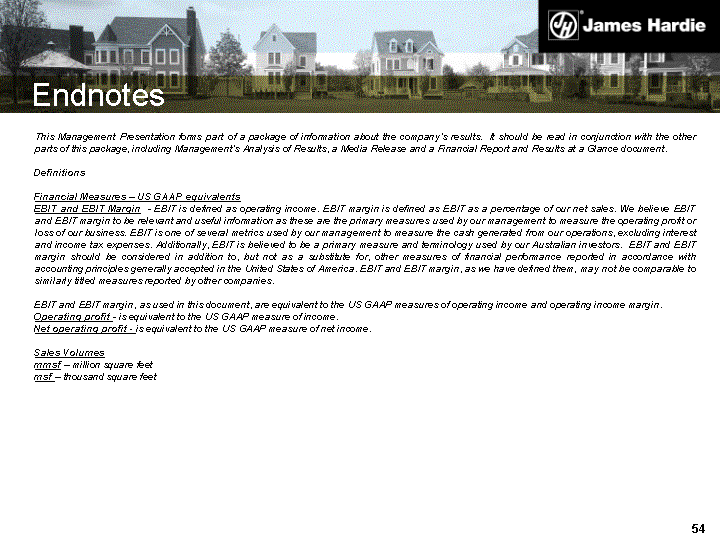
|
Endnotes
This Management Presentation forms part of a package of information about the company's results. It should be read in conjunction with the other
parts of this package, including Management's Analysis of Results, a Media Release and a Financial Report and Results at a Glance document.
Definitions
Financial Measures - US GAAP equivalents
EBIT and EBIT Margin - EBIT is defined as operating income. EBIT margin is defined as EBIT as a percentage of our net sales. We believe EBIT
and EBIT margin to be relevant and useful information as these are the primary measures used by our management to measure the operating profit or
loss of our business. EBIT is one of several metrics used by our management to measure the cash generated from our operations, excluding interest
and income tax expenses. Additionally, EBIT is believed to be a primary measure and terminology used by our Australian investors. EBIT and EBIT
margin should be considered in addition to, but not as a substitute for, other measures of financial performance reported in accordance with
accounting principles generally accepted in the United States of America. EBIT and EBIT margin, as we have defined them, may not be comparable to
similarly titled measures reported by other companies.
EBIT and EBIT margin, as used in this document, are equivalent to the US GAAP measures of operating income and operating income margin.
Operating profit - is equivalent to the US GAAP measure of income.
Net operating profit - is equivalent to the US GAAP measure of net income.
Sales Volumes
mmsf - million square feet
msf - thousand square feet
|

|
Endnotes
Financial Ratios
Gearing Ratio - Net debt/cash divided by net debt/cash plus shareholders' equity.
Net interest expense cover - EBIT divided by net interest expense.
Net interest paid cover - EBIT divided by cash paid during the period for interest, net of amounts capitalised.
Net debt payback - Net debt/cash divided by cash flow from operations.
Net debt/cash - short-term and long-term debt less cash and cash equivalents.
|
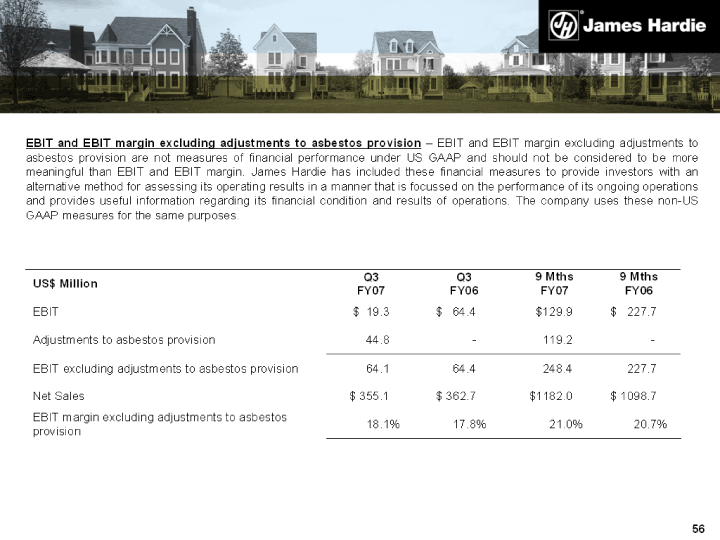
|
EBIT and EBIT margin excluding adjustments to asbestos provision - EBIT and EBIT margin excluding adjustments to
asbestos provision are not measures of financial performance under US GAAP and should not be considered to be more
meaningful than EBIT and EBIT margin. James Hardie has included these financial measures to provide investors with an
alternative method for assessing its operating results in a manner that is focussed on the performance of its ongoing operations
and provides useful information regarding its financial condition and results of operations. The company uses these non-US
GAAP measures for the same purposes.
|

|
Non-US GAAP Financial Measures
EBIT excluding adjustments to asbestos provision and SCI and other related expenses - EBIT excluding adjustments
to asbestos provision, and SCI and other related expenses is not a measure of financial performance under US GAAP and
should not be considered to be more meaningful than EBIT. James Hardie has included this financial measure to provide
investors with an alternative method for assessing its operating results in a manner that is focussed on the performance of
its ongoing operations and provides useful information regarding its financial condition and results of operations. The
company uses this non-US GAAP measure for the same purposes.
|
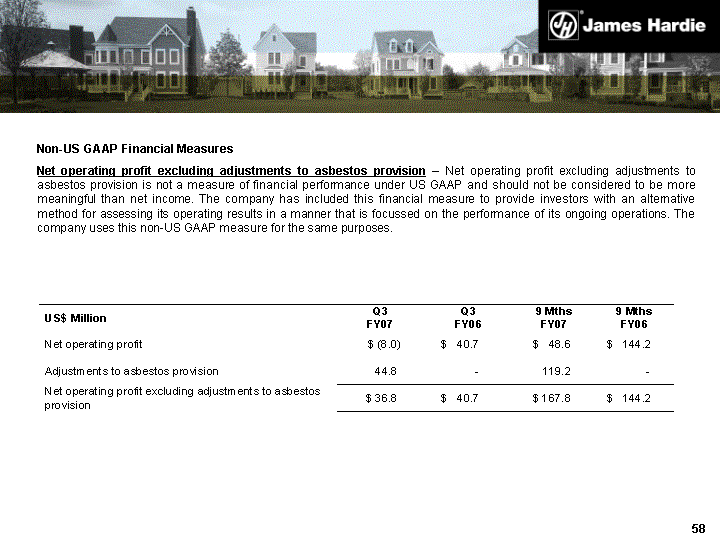
|
Non-US GAAP Financial Measures
Net operating profit excluding adjustments to asbestos provision - Net operating profit excluding adjustments to
asbestos provision is not a measure of financial performance under US GAAP and should not be considered to be more
meaningful than net income. The company has included this financial measure to provide investors with an alternative
method for assessing its operating results in a manner that is focussed on the performance of its ongoing operations. The
company uses this non-US GAAP measure for the same purposes.
|
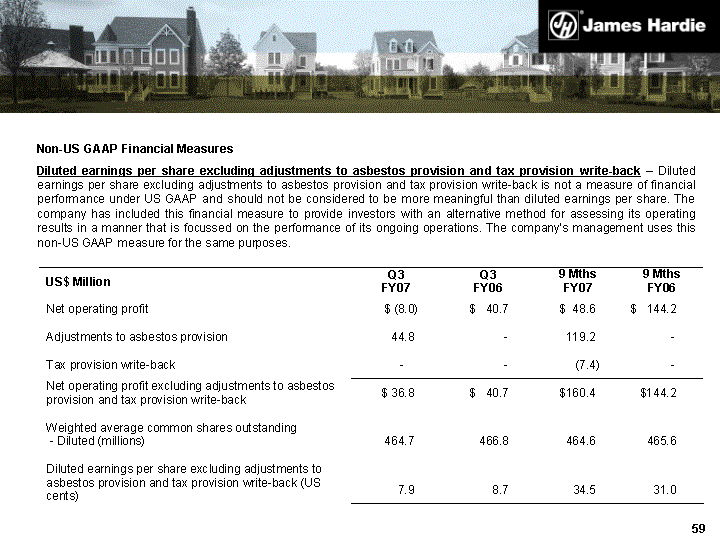
|
Non-US GAAP Financial Measures
Diluted earnings per share excluding adjustments to asbestos provision and tax provision write-back - Diluted
earnings per share excluding adjustments to asbestos provision and tax provision write-back is not a measure of financial
performance under US GAAP and should not be considered to be more meaningful than diluted earnings per share. The
company has included this financial measure to provide investors with an alternative method for assessing its operating
results in a manner that is focussed on the performance of its ongoing operations. The company's management uses this
non-US GAAP measure for the same purposes.
|
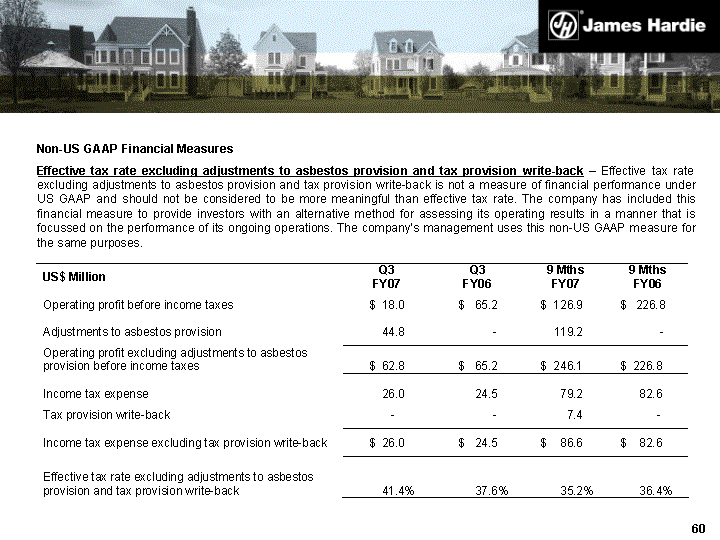
|
Non-US GAAP Financial Measures
Effective tax rate excluding adjustments to asbestos provision and tax provision write-back - Effective tax rate
excluding adjustments to asbestos provision and tax provision write-back is not a measure of financial performance under
US GAAP and should not be considered to be more meaningful than effective tax rate. The company has included this
financial measure to provide investors with an alternative method for assessing its operating results in a manner that is
focussed on the performance of its ongoing operations. The company's management uses this non-US GAAP measure for
the same purposes.
|
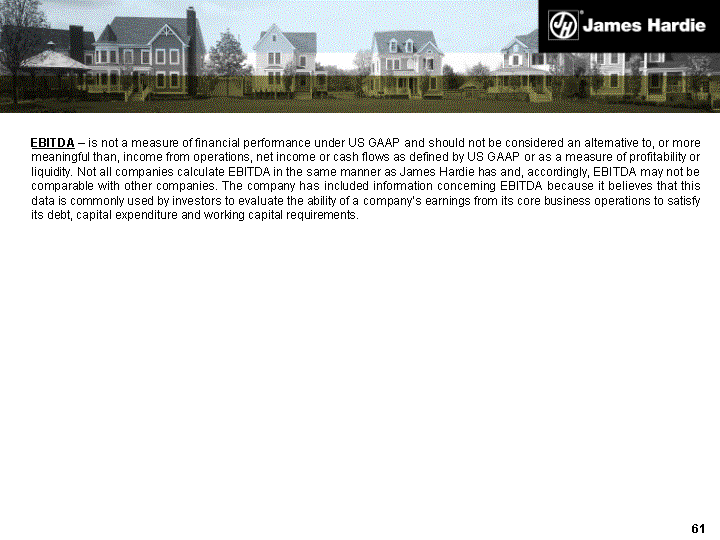
|
EBITDA - is not a measure of financial performance under US GAAP and should not be considered an alternative to, or more
meaningful than, income from operations, net income or cash flows as defined by US GAAP or as a measure of profitability or
liquidity. Not all companies calculate EBITDA in the same manner as James Hardie has and, accordingly, EBITDA may not be
comparable with other companies. The company has included information concerning EBITDA because it believes that this
data is commonly used by investors to evaluate the ability of a company's earnings from its core business operations to satisfy
its debt, capital expenditure and working capital requirements.
|
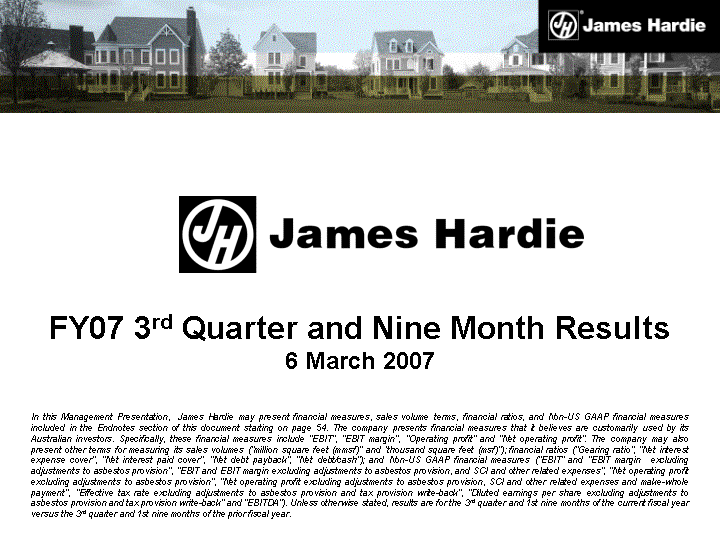
|
FY07 3rd Quarter and Nine Month Results
6 March 2007
In this Management Presentation, James Hardie may present financial measures, sales volume terms, financial ratios, and Non-US GAAP financial measures
included in the Endnotes section of this document starting on page 54. The company presents financial measures that it believes are customarily used by its
Australian investors. Specifically, these financial measures include "EBIT", "EBIT margin", "Operating profit" and "Net operating profit". The company may also
present other terms for measuring its sales volumes ("million square feet (mmsf)" and "thousand square feet (msf)"); financial ratios ("Gearing ratio", "Net interest
expense cover", "Net interest paid cover", "Net debt payback", "Net debt/cash"); and Non-US GAAP financial measures ("EBIT" and "EBIT margin excluding
adjustments to asbestos provision", "EBIT and EBIT margin excluding adjustments to asbestos provision, and SCI and other related expenses", "Net operating profit
excluding adjustments to asbestos provision", "Net operating profit excluding adjustments to asbestos provision, SCI and other related expenses and make-whole
payment", "Effective tax rate excluding adjustments to asbestos provision and tax provision write-back", "Diluted earnings per share excluding adjustments to
asbestos provision and tax provision write-back" and "EBITDA"). Unless otherwise stated, results are for the 3rd quarter and 1st nine months of the current fiscal year
versus the 3rd quarter and 1st nine months of the prior fiscal year.
|































































